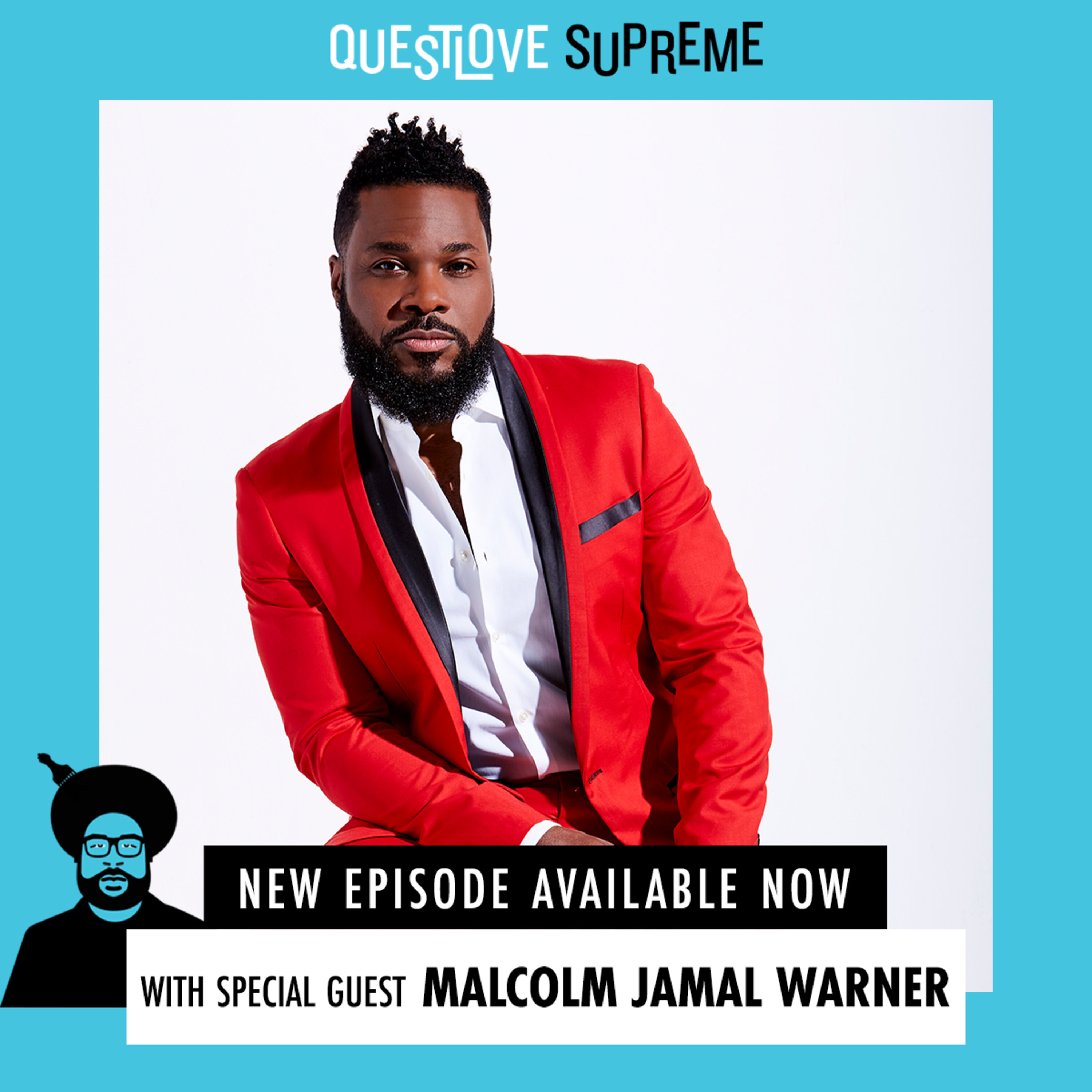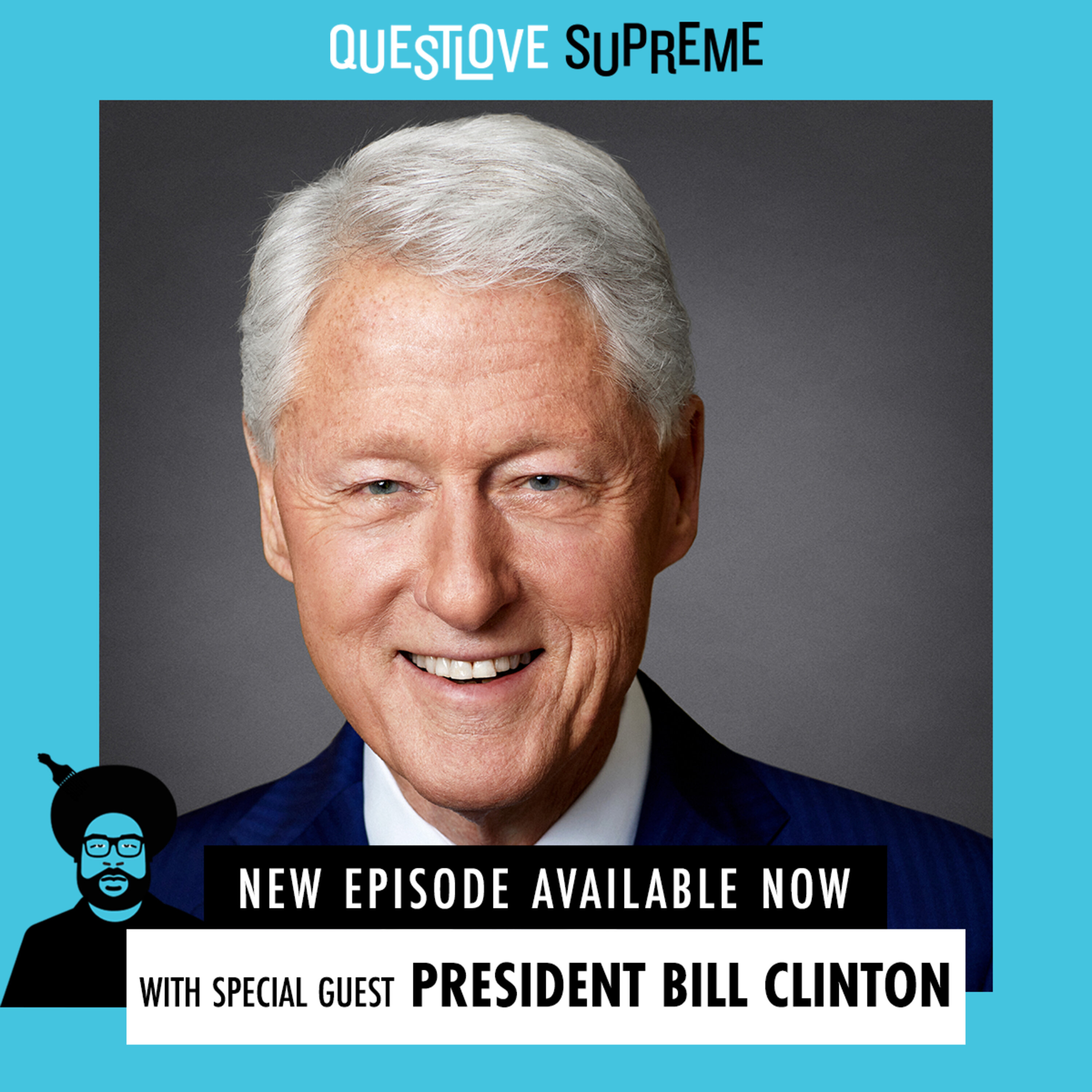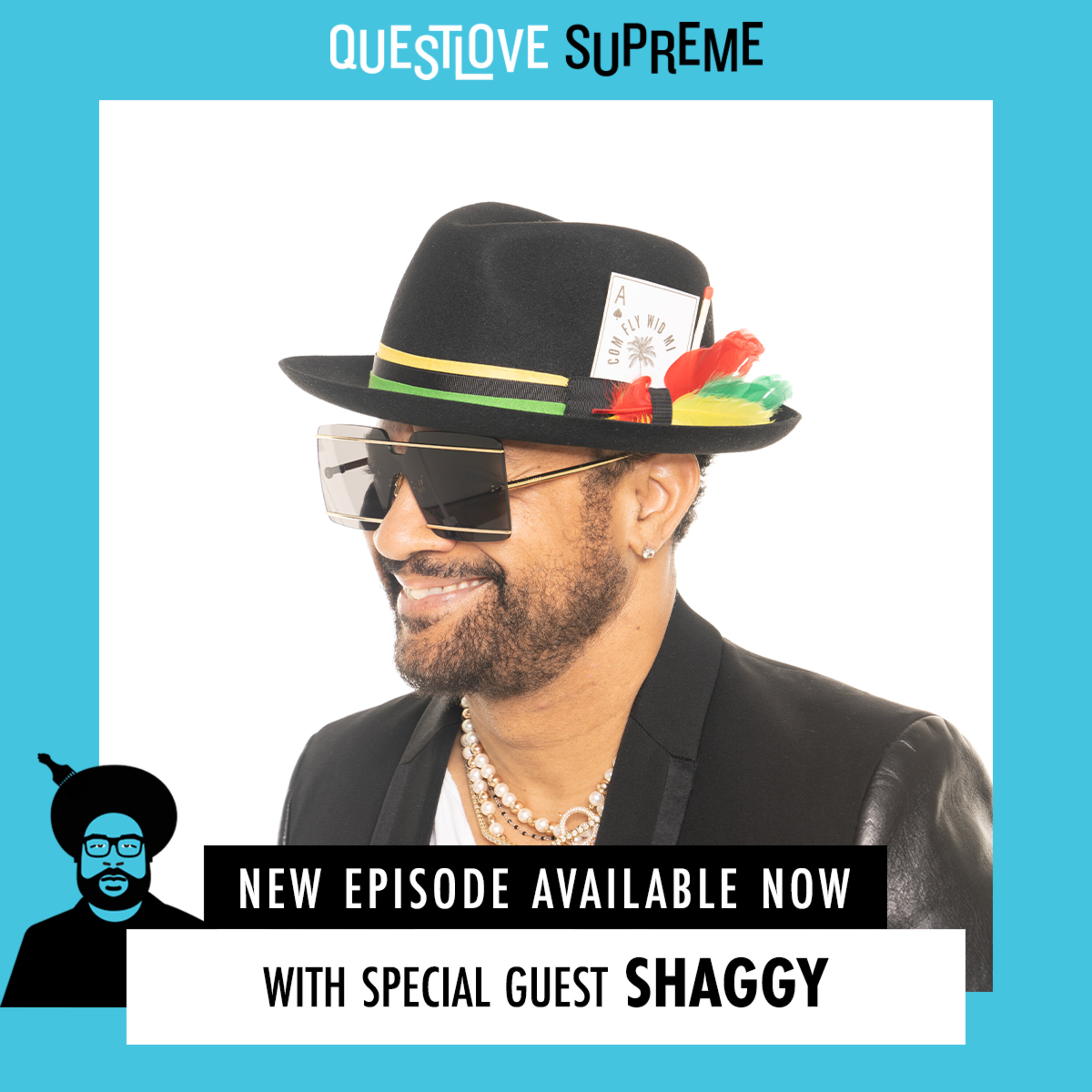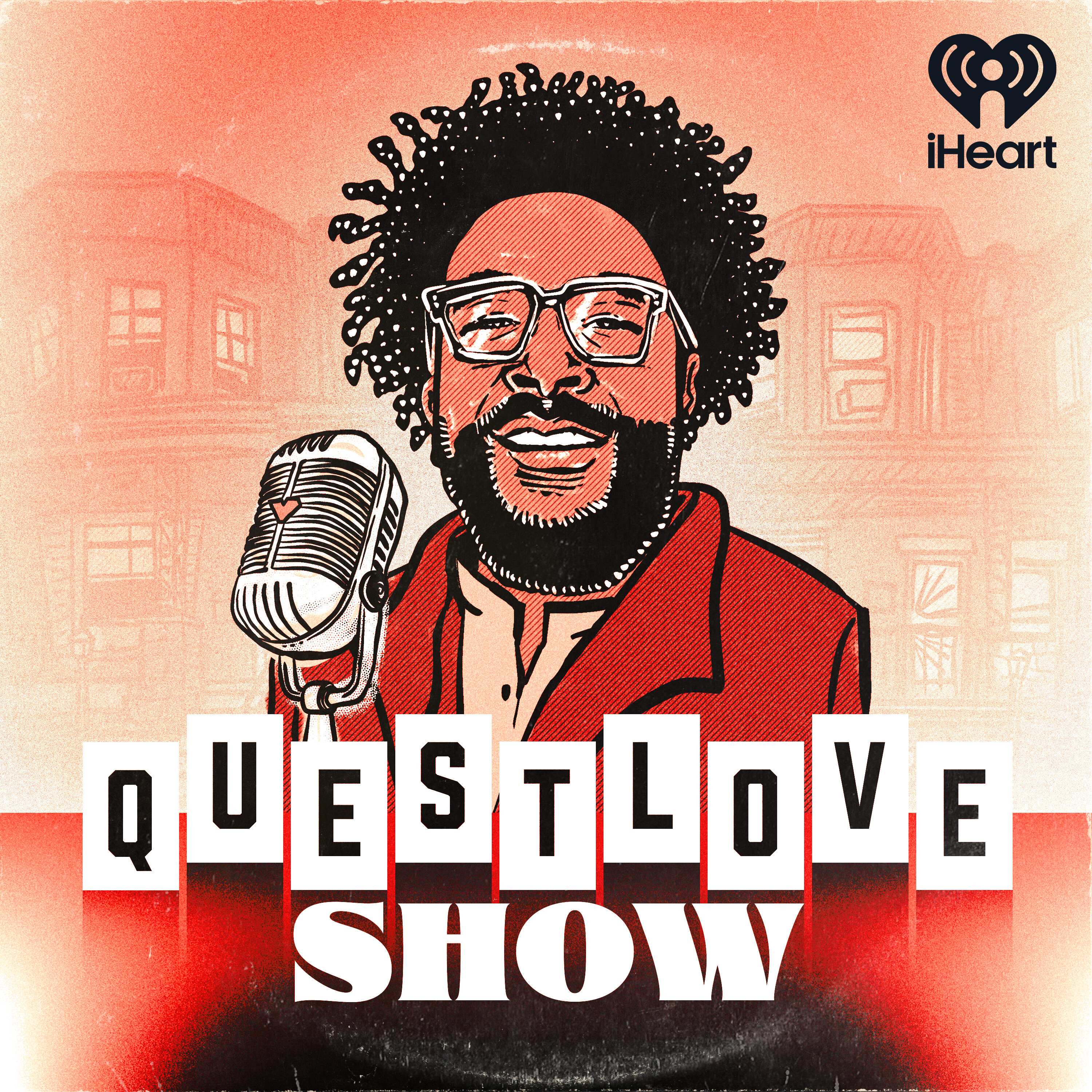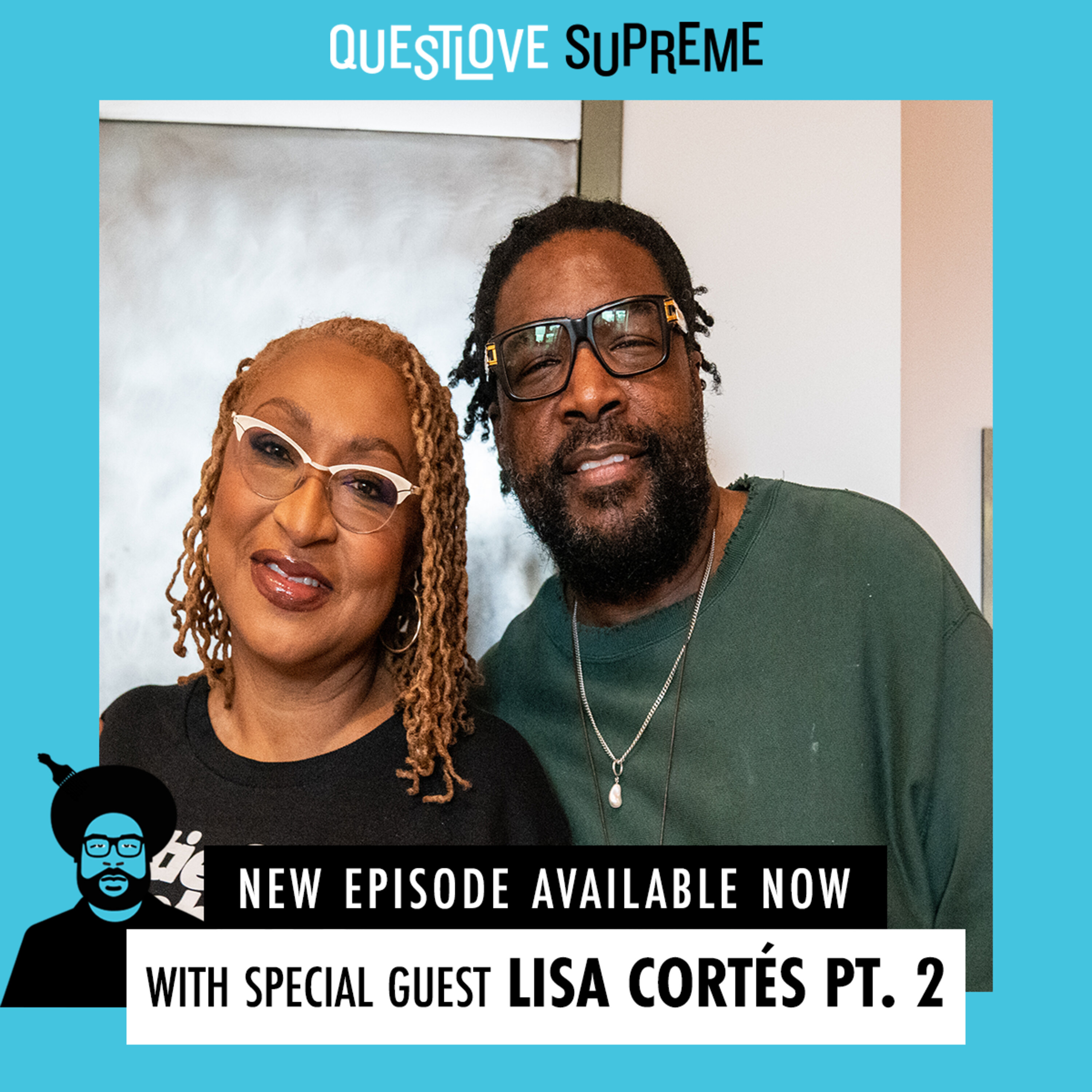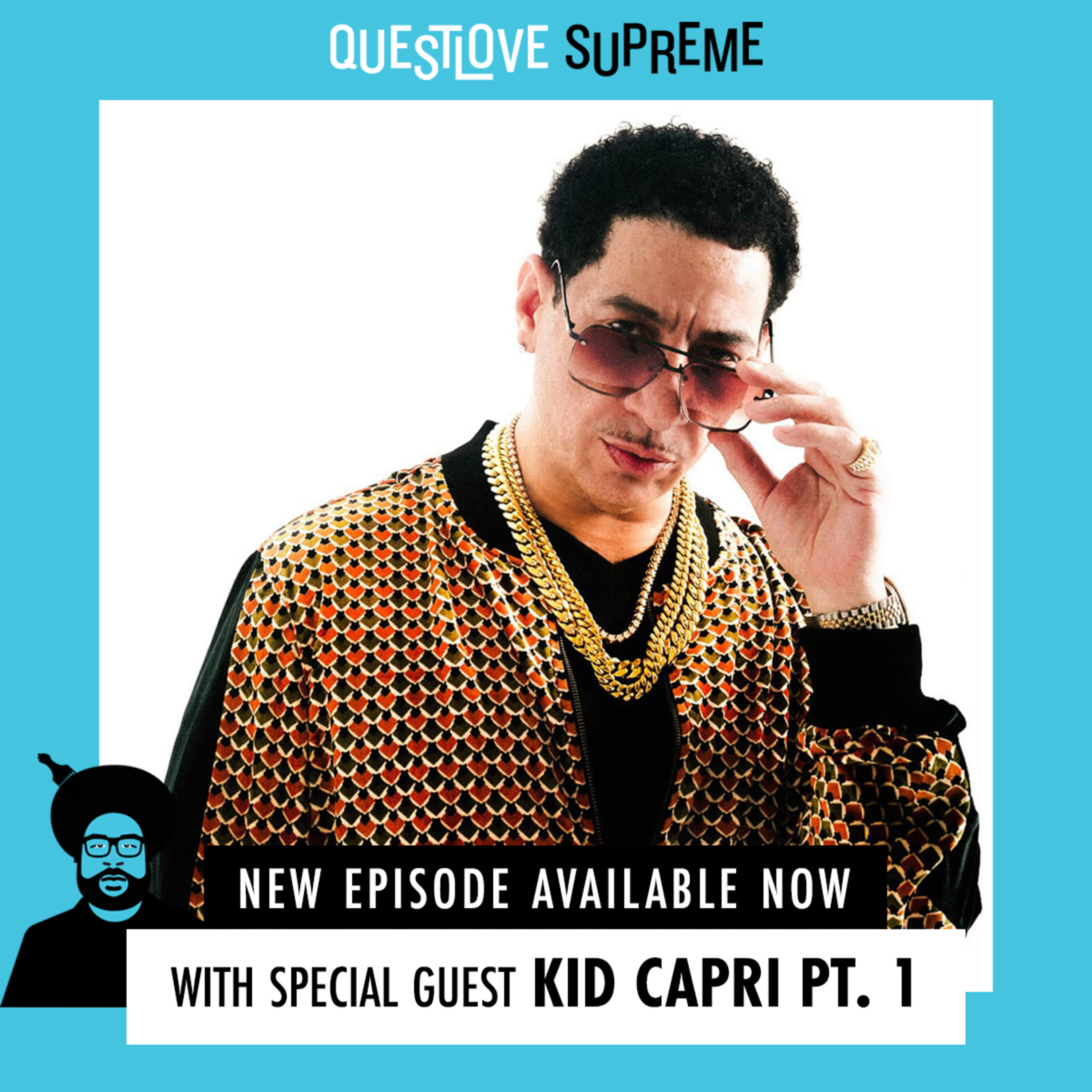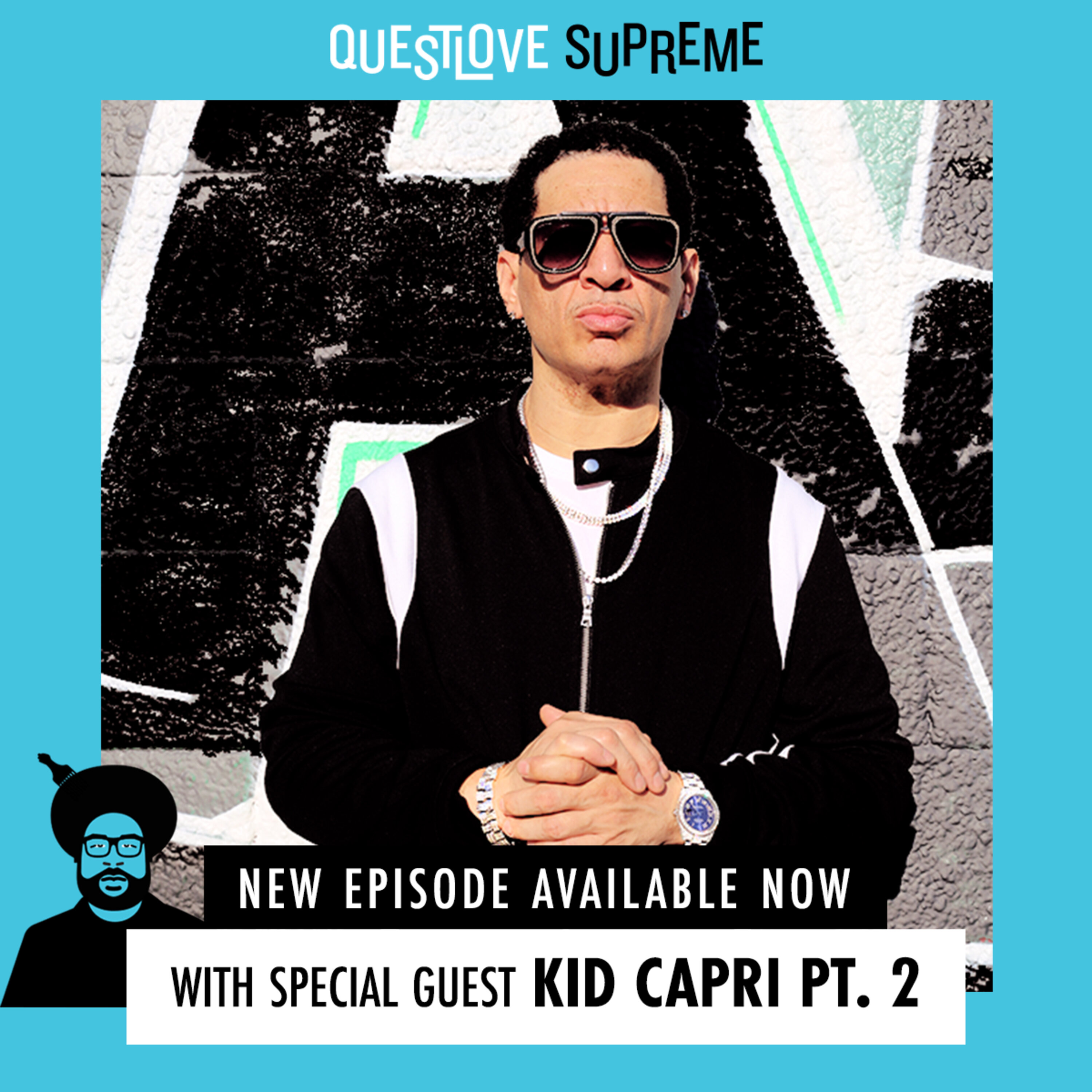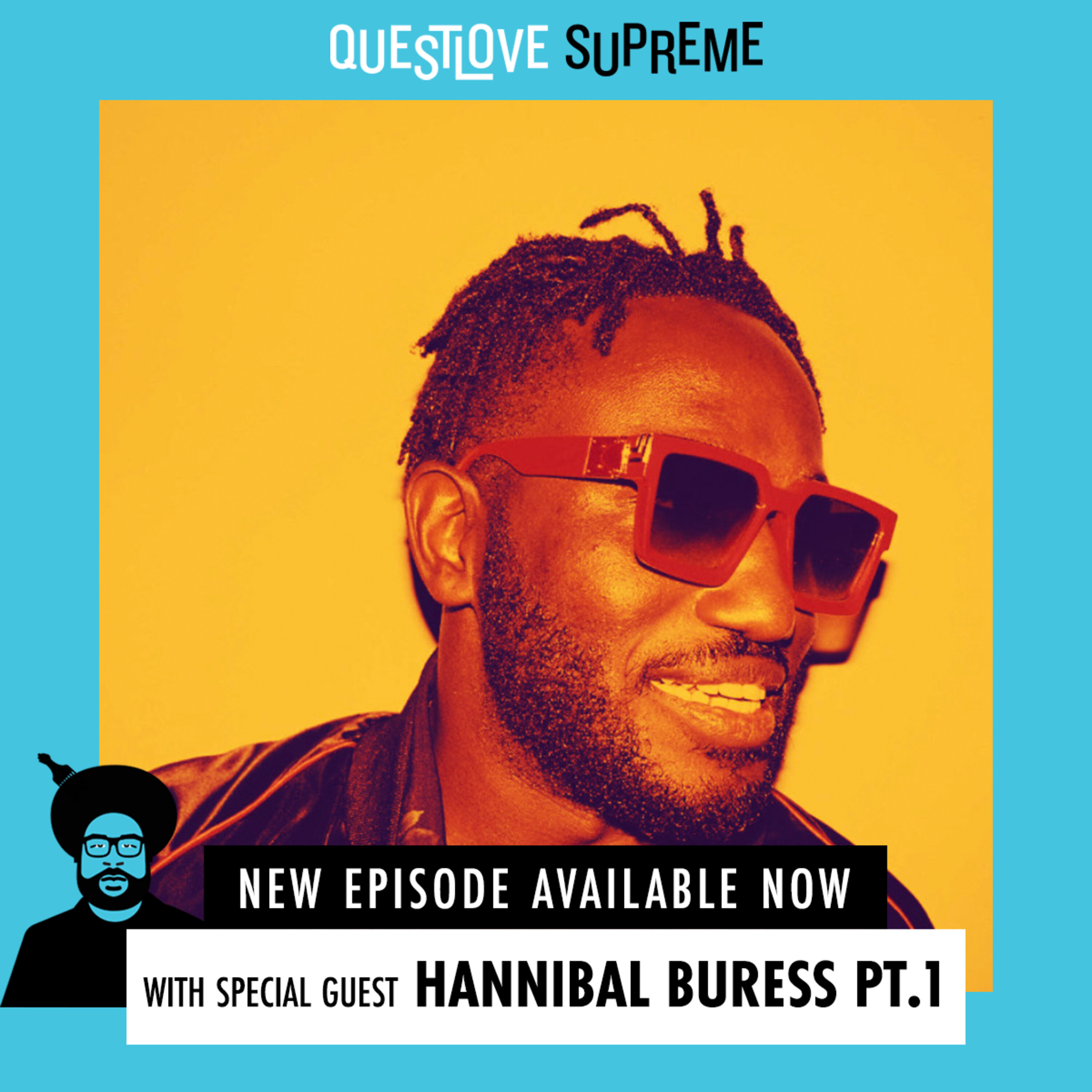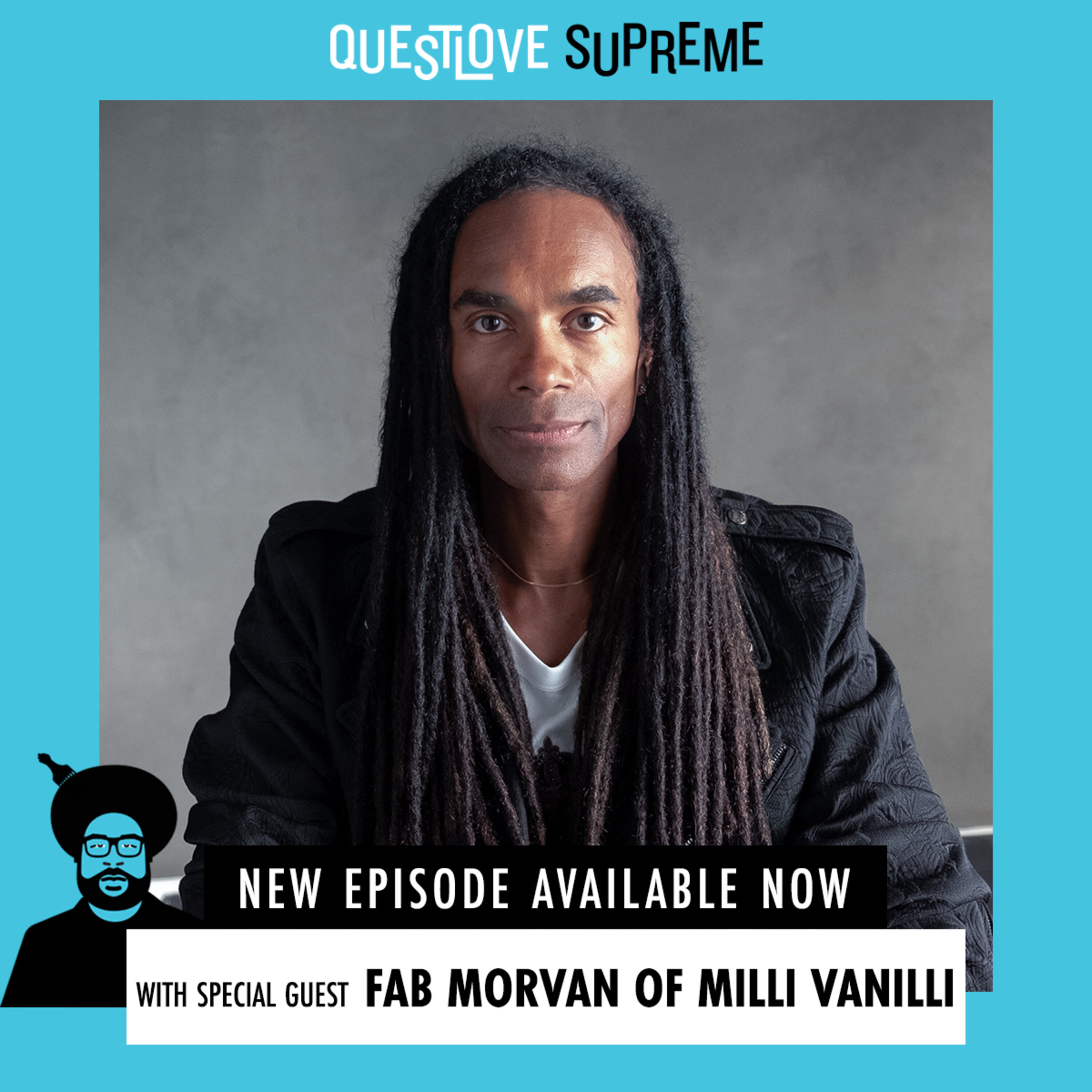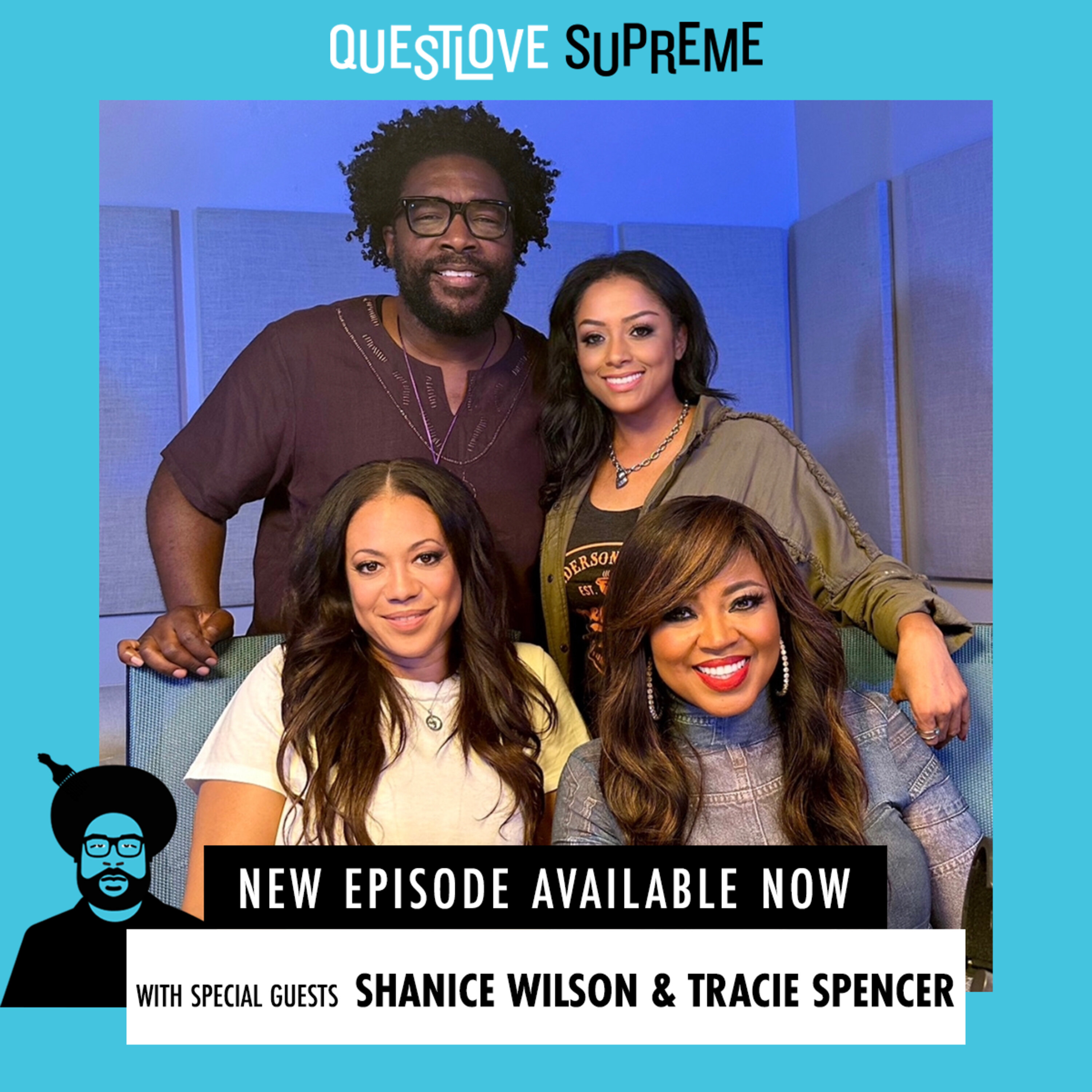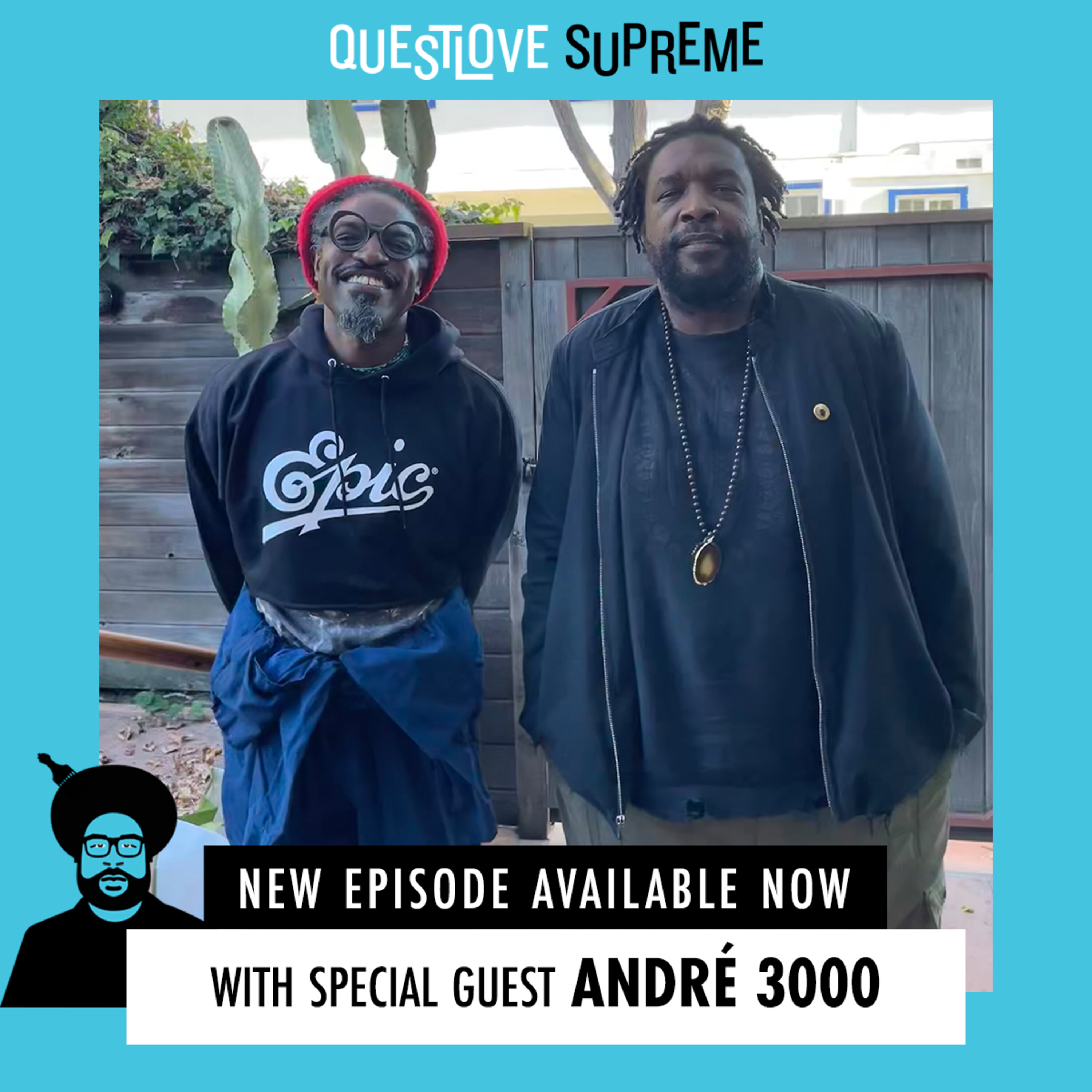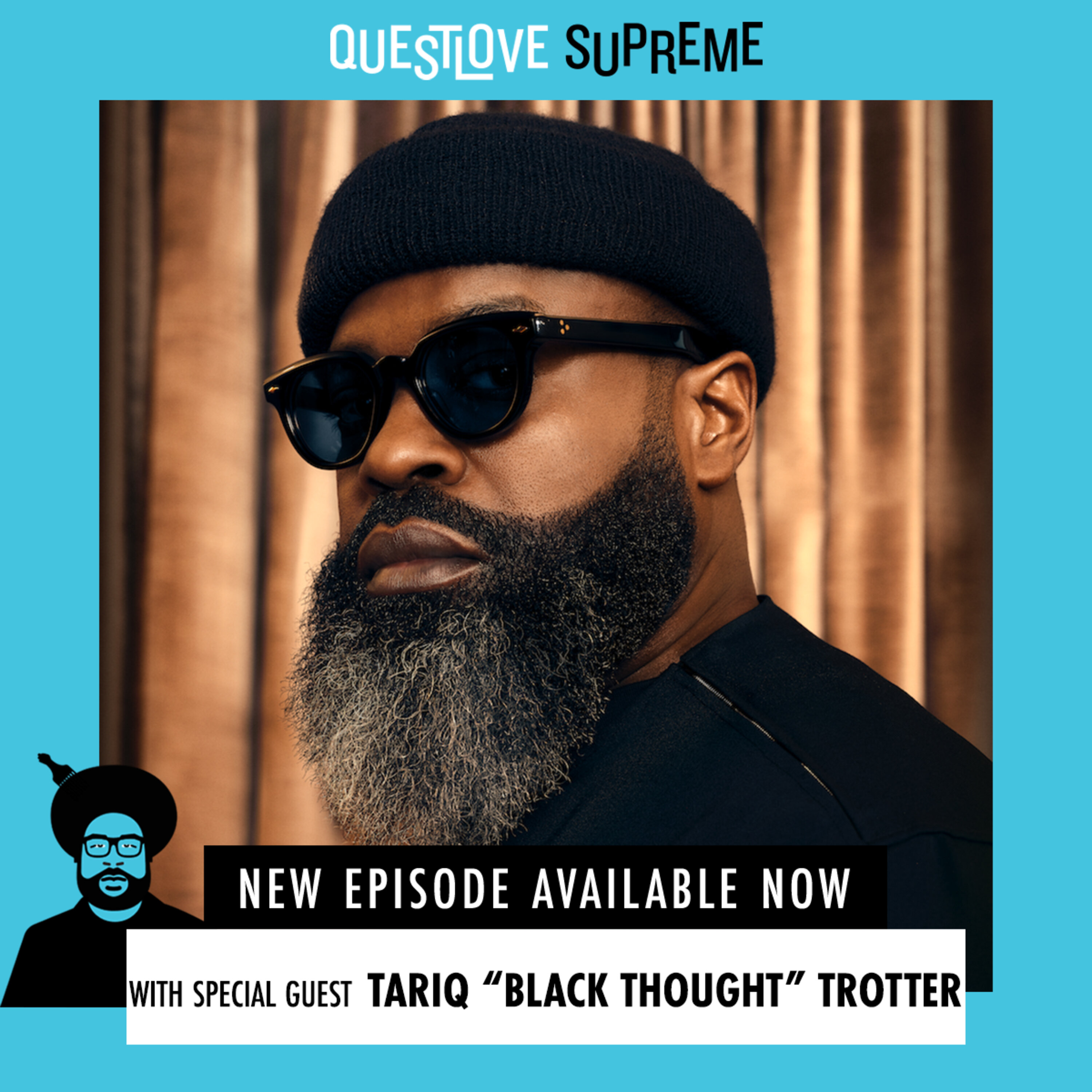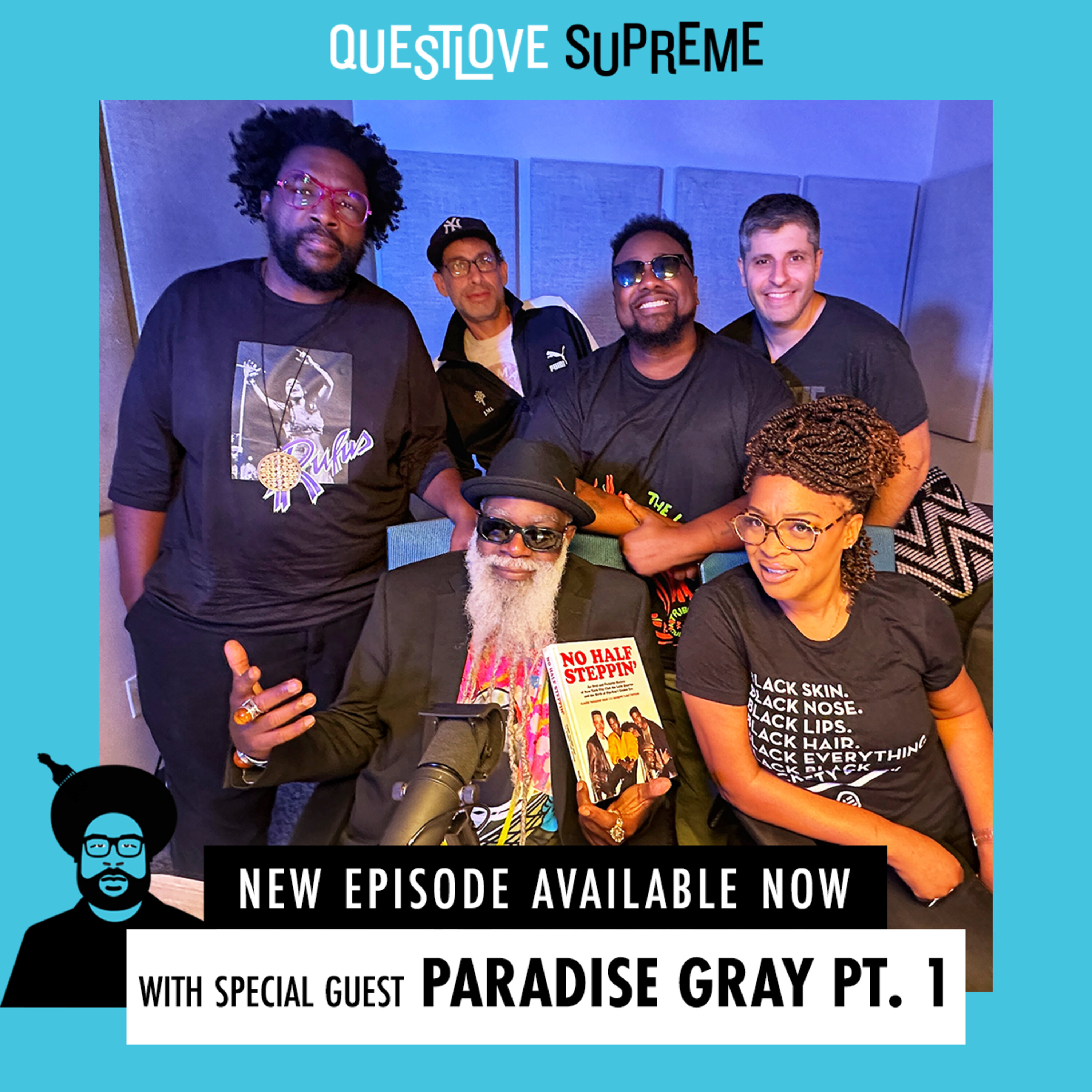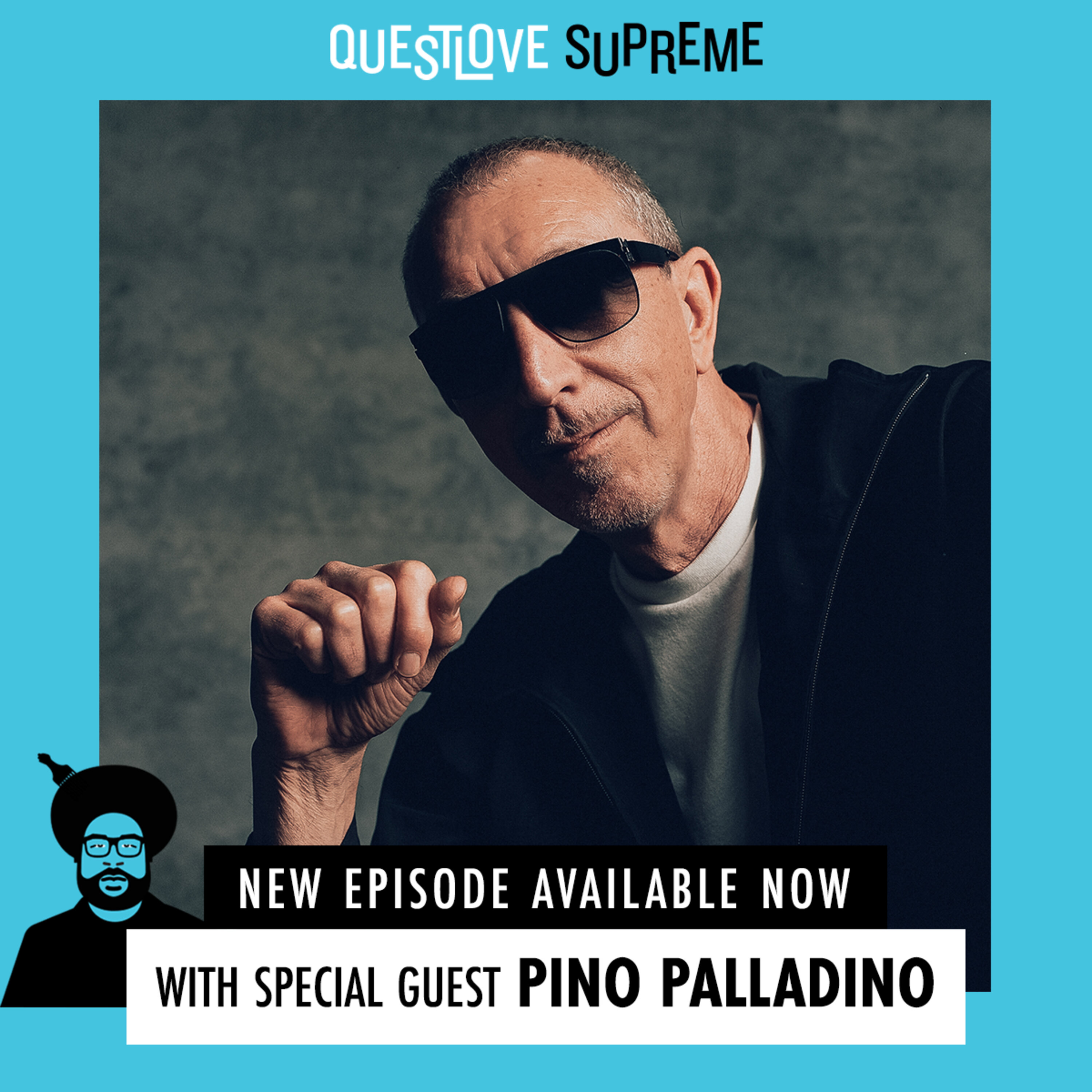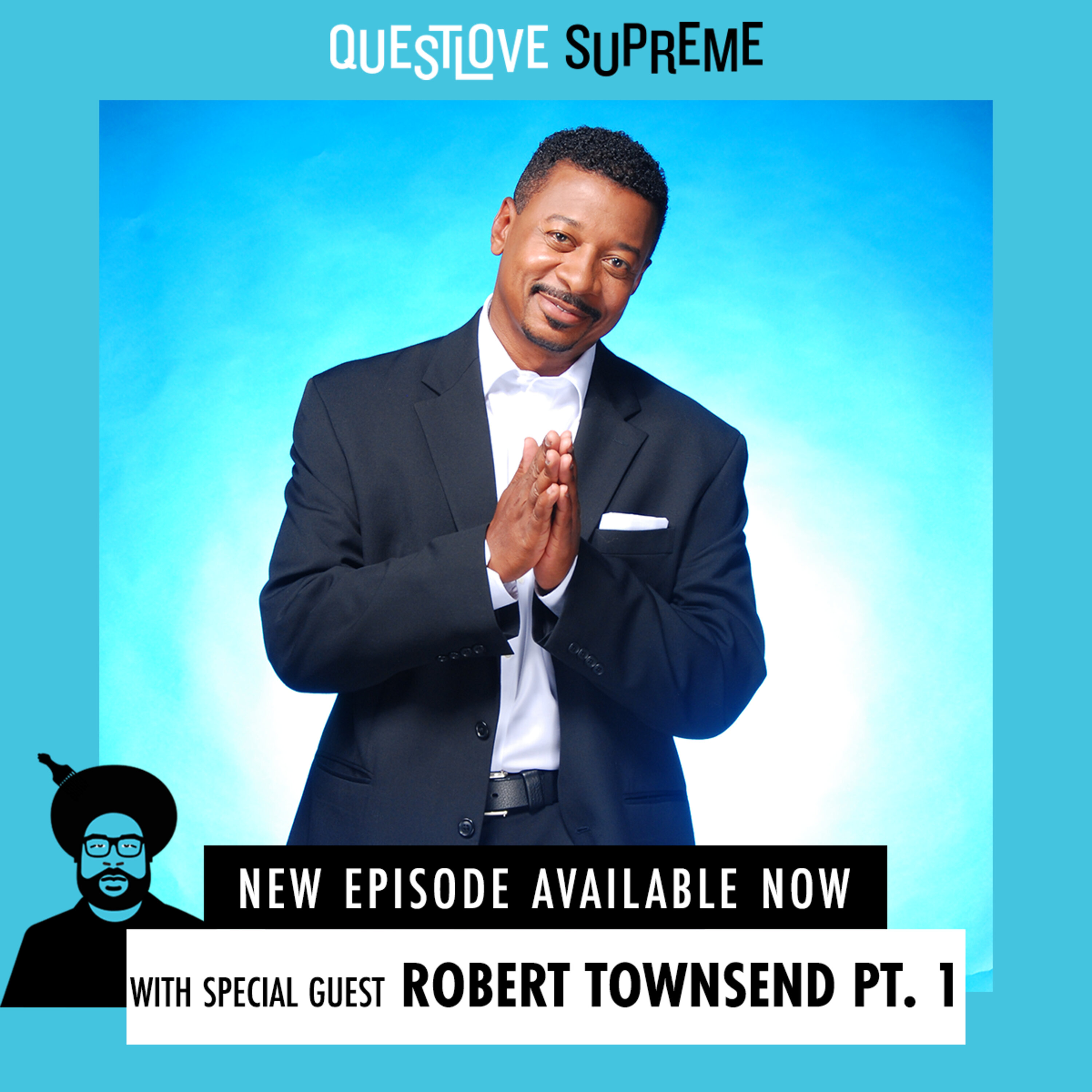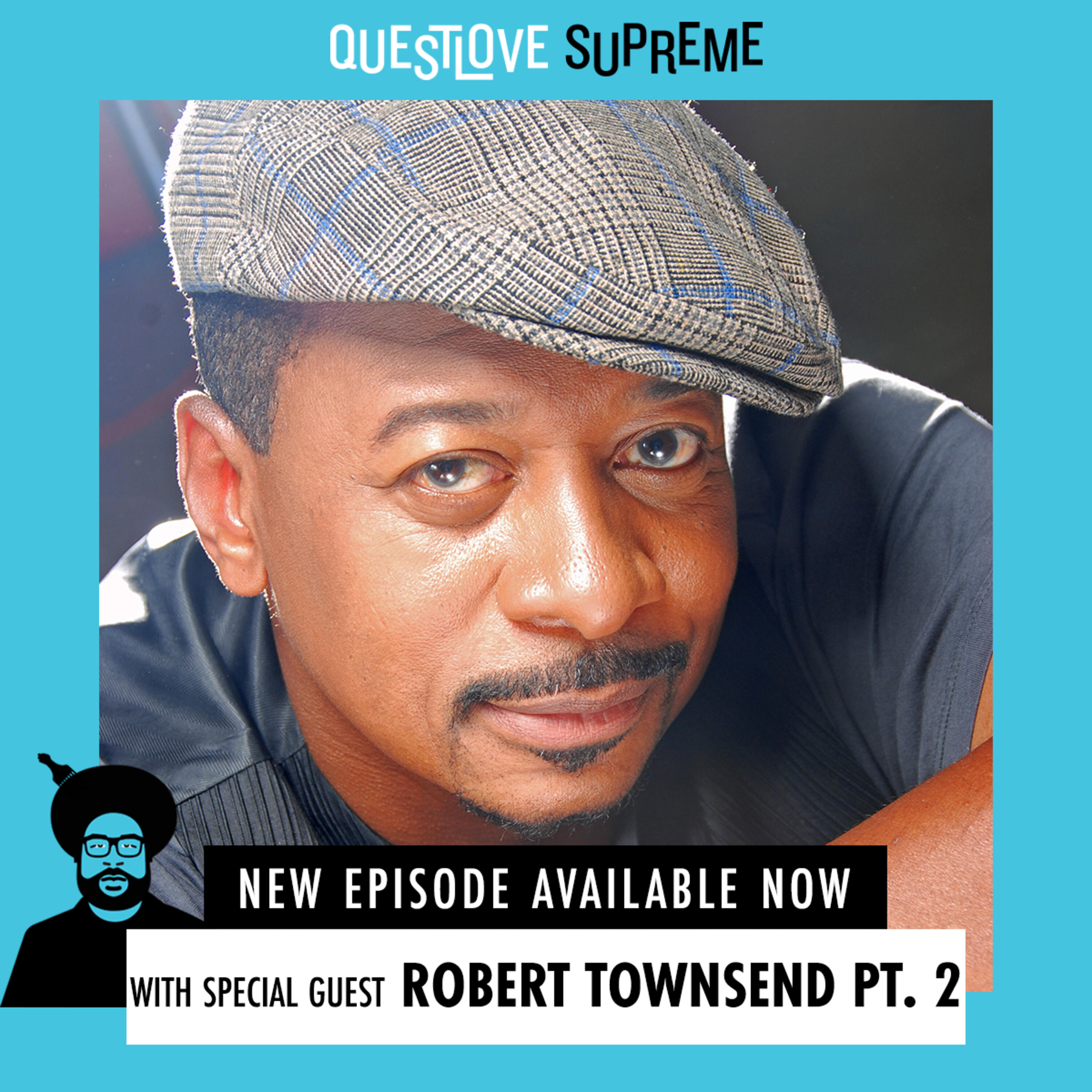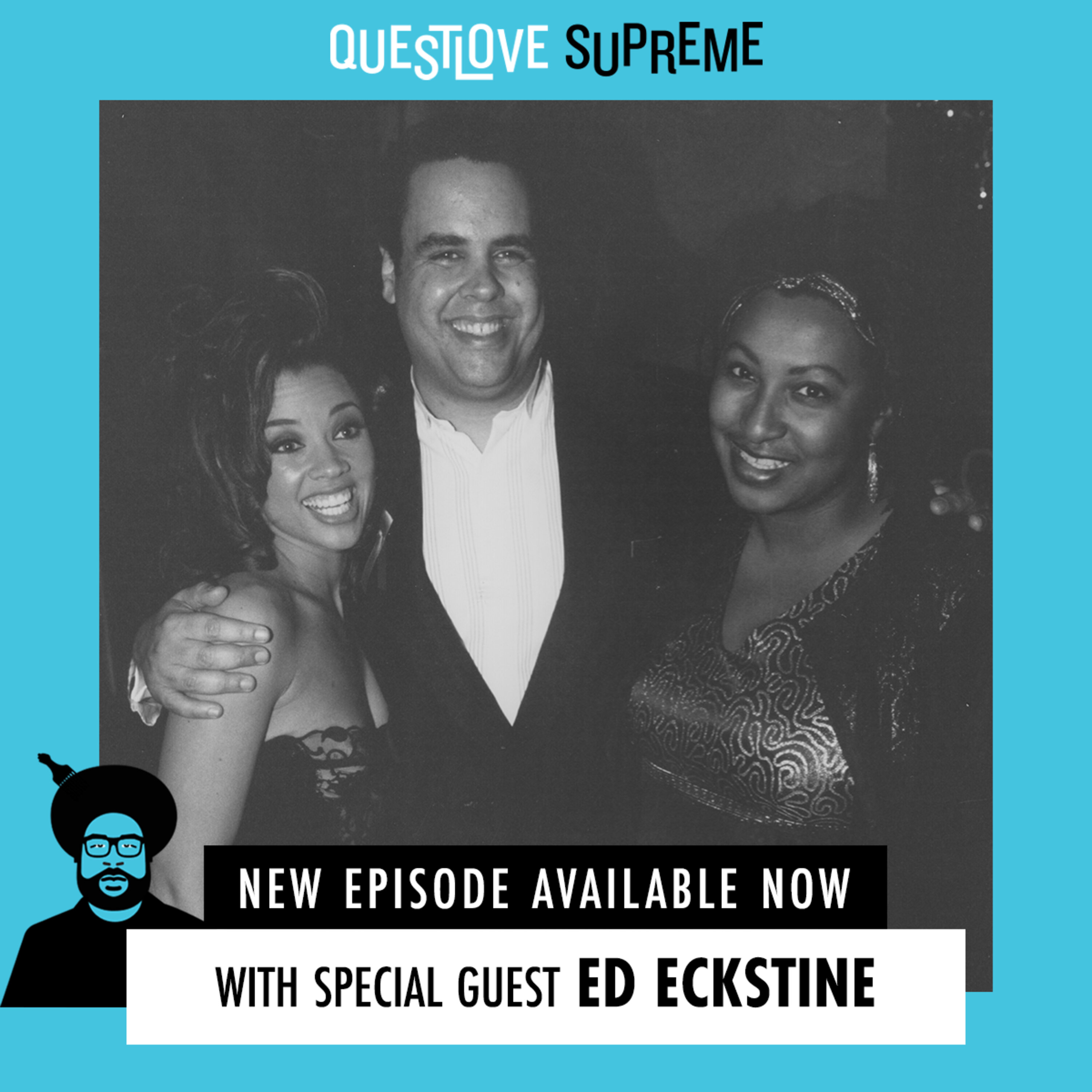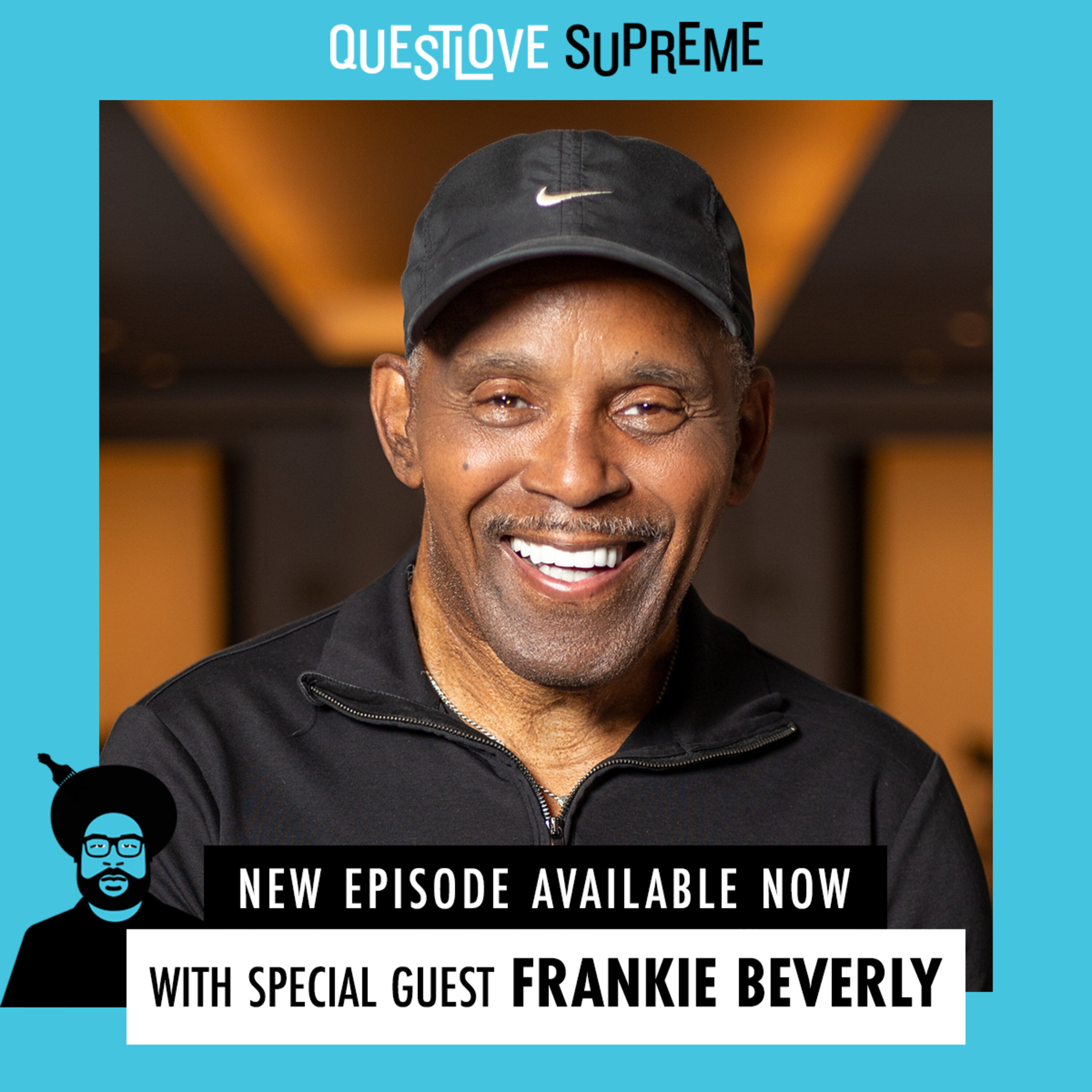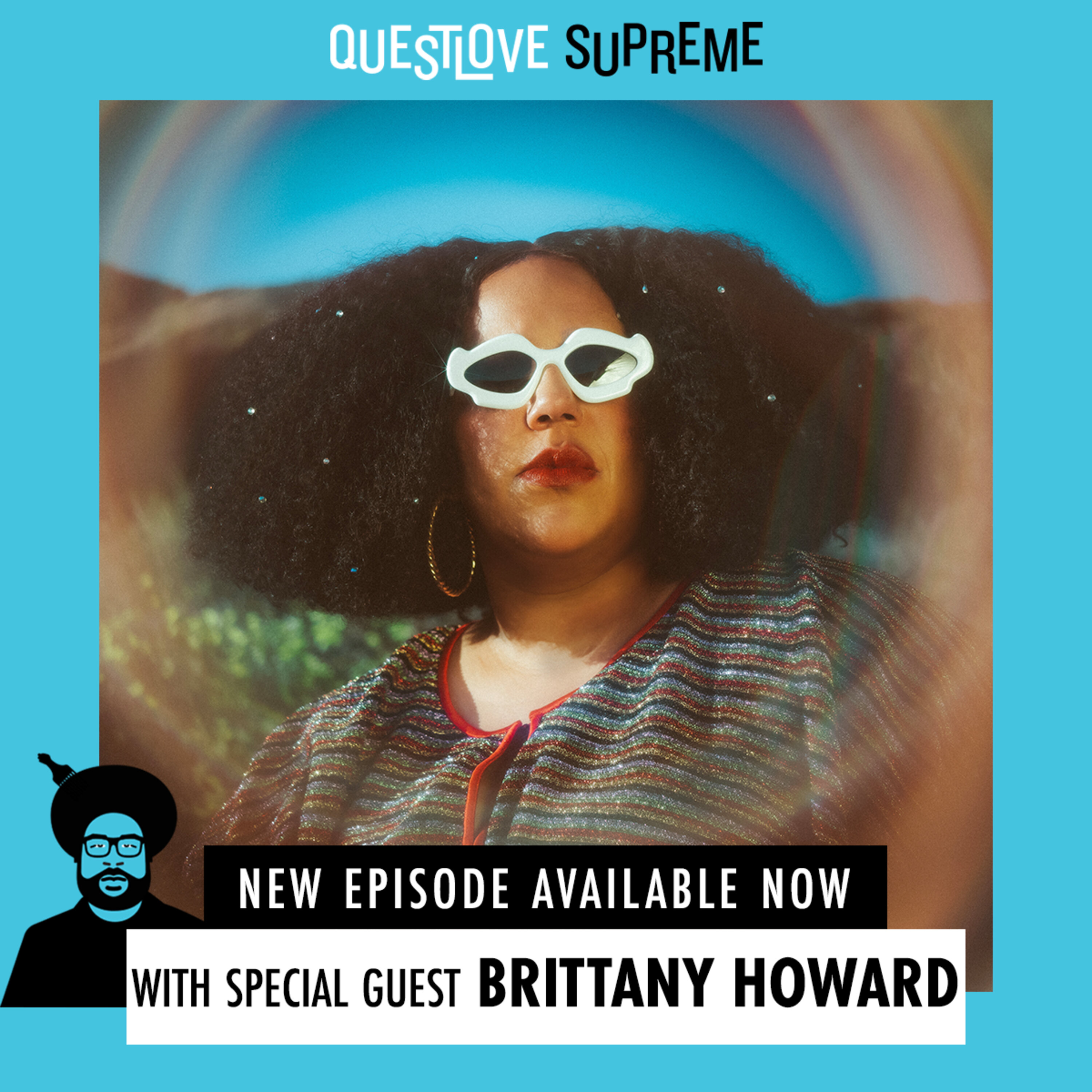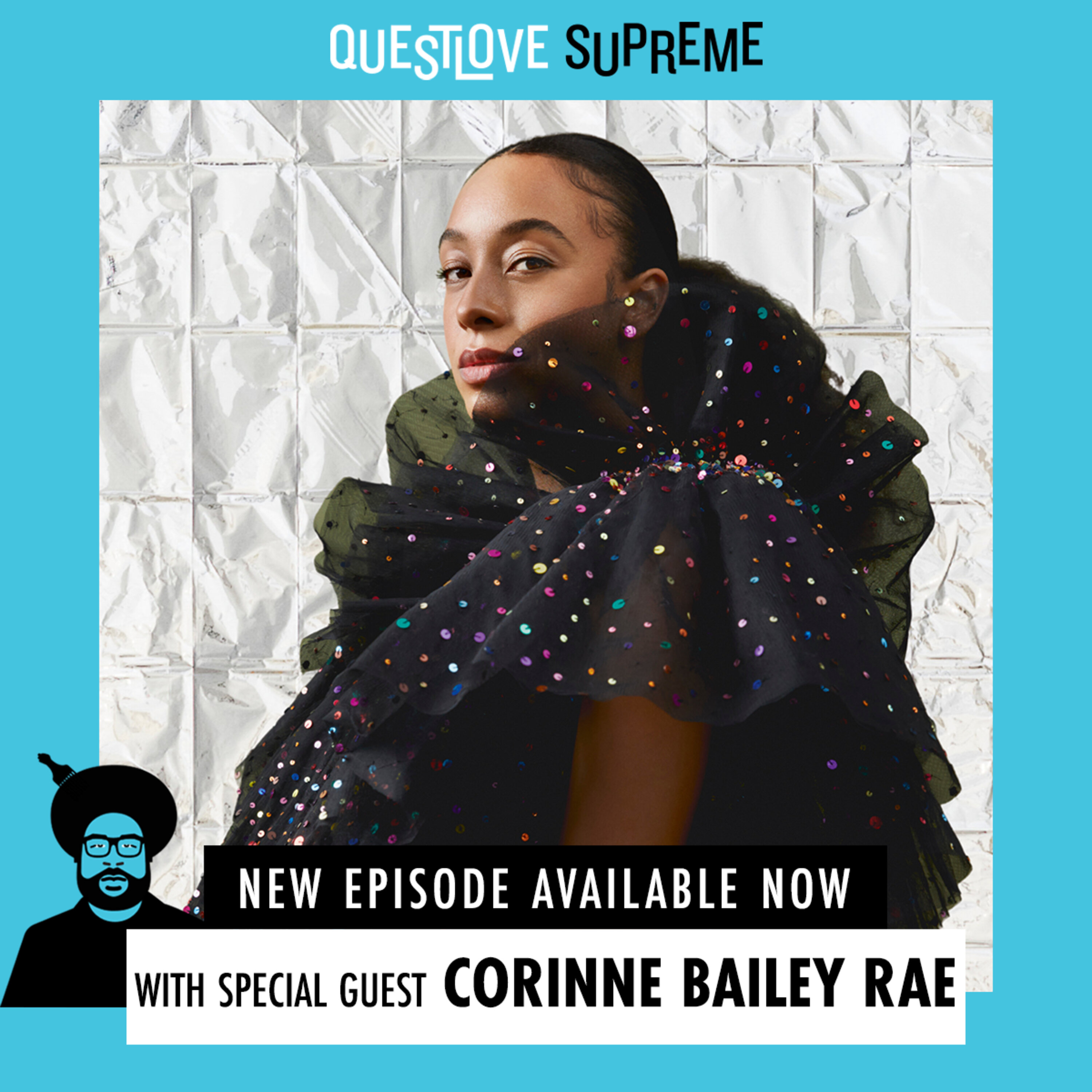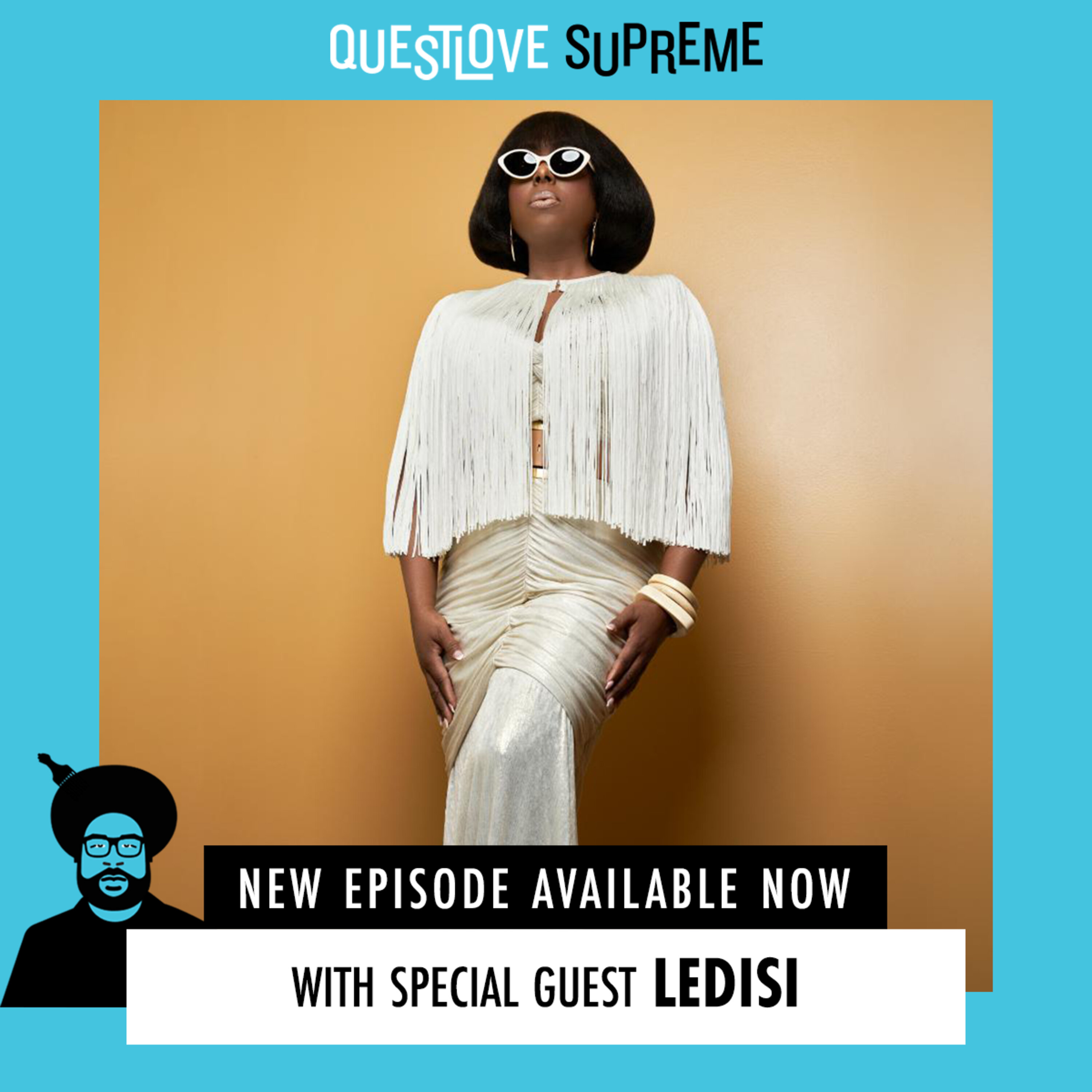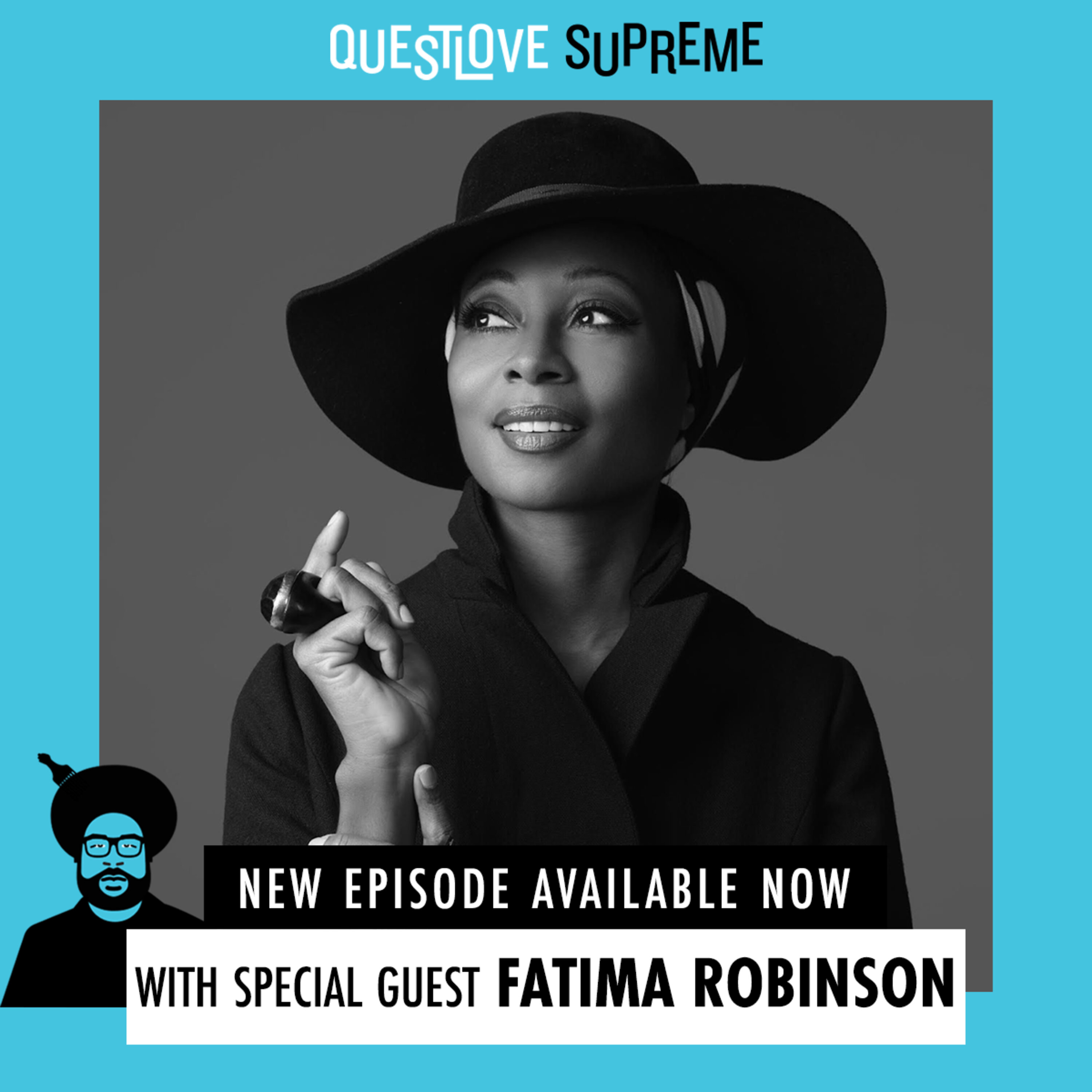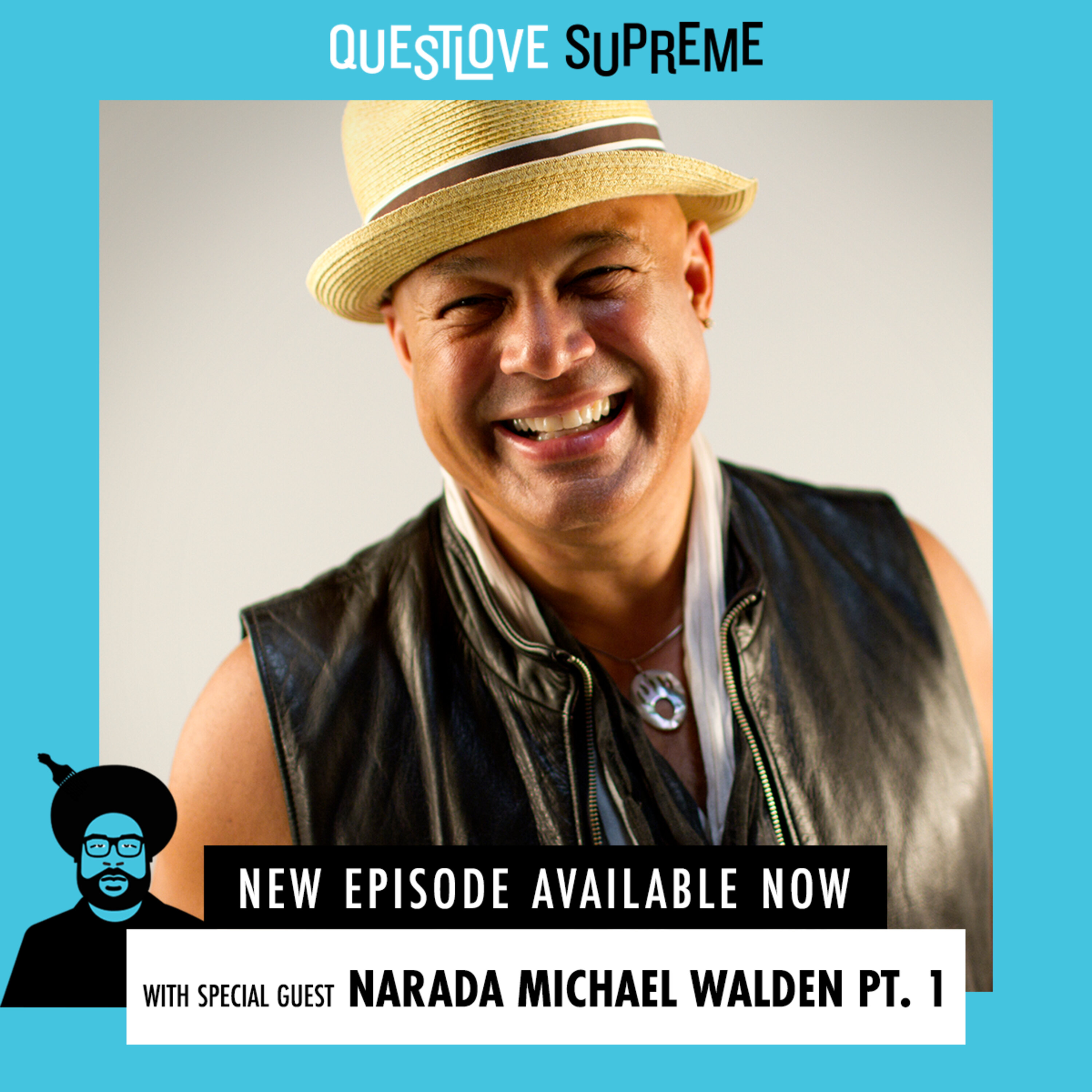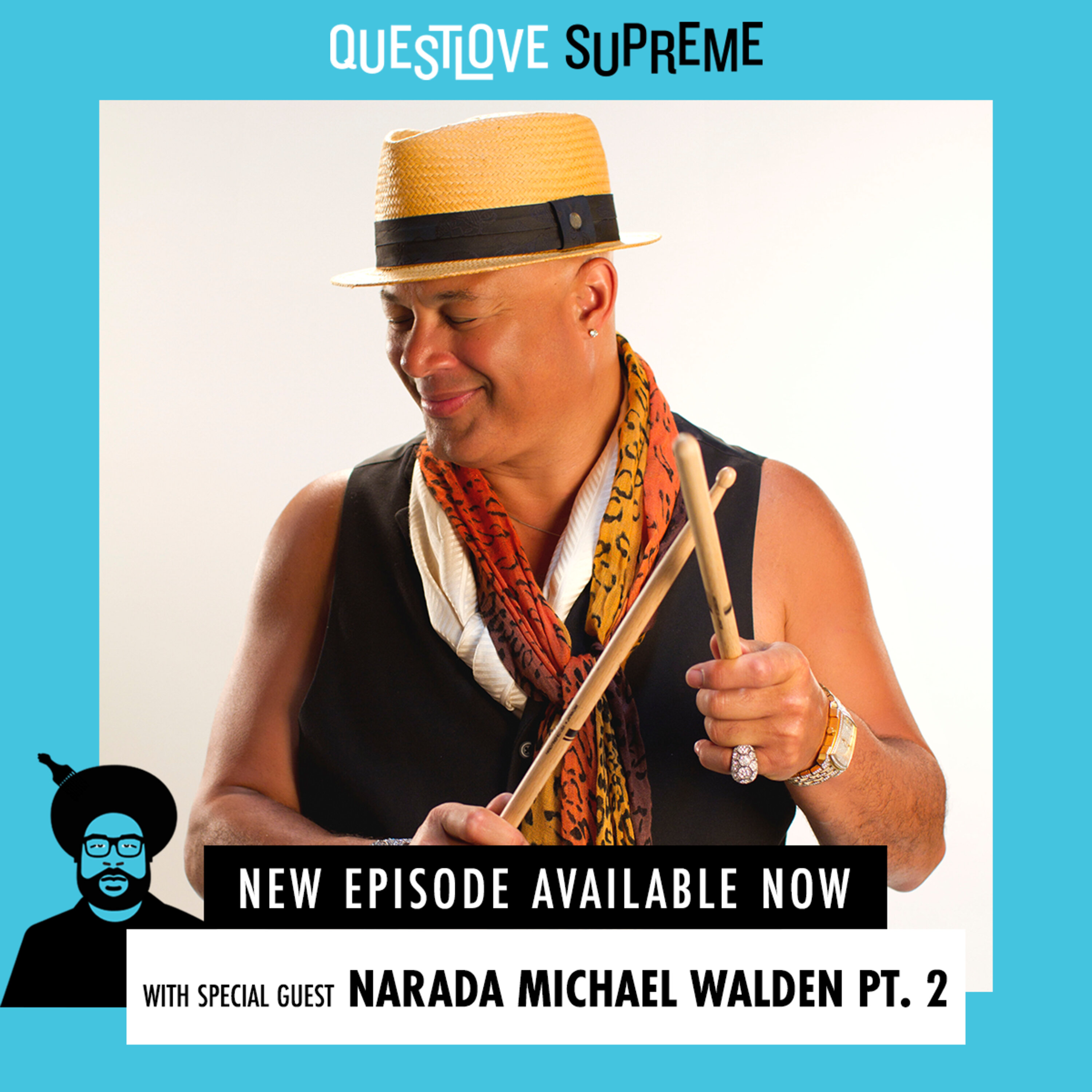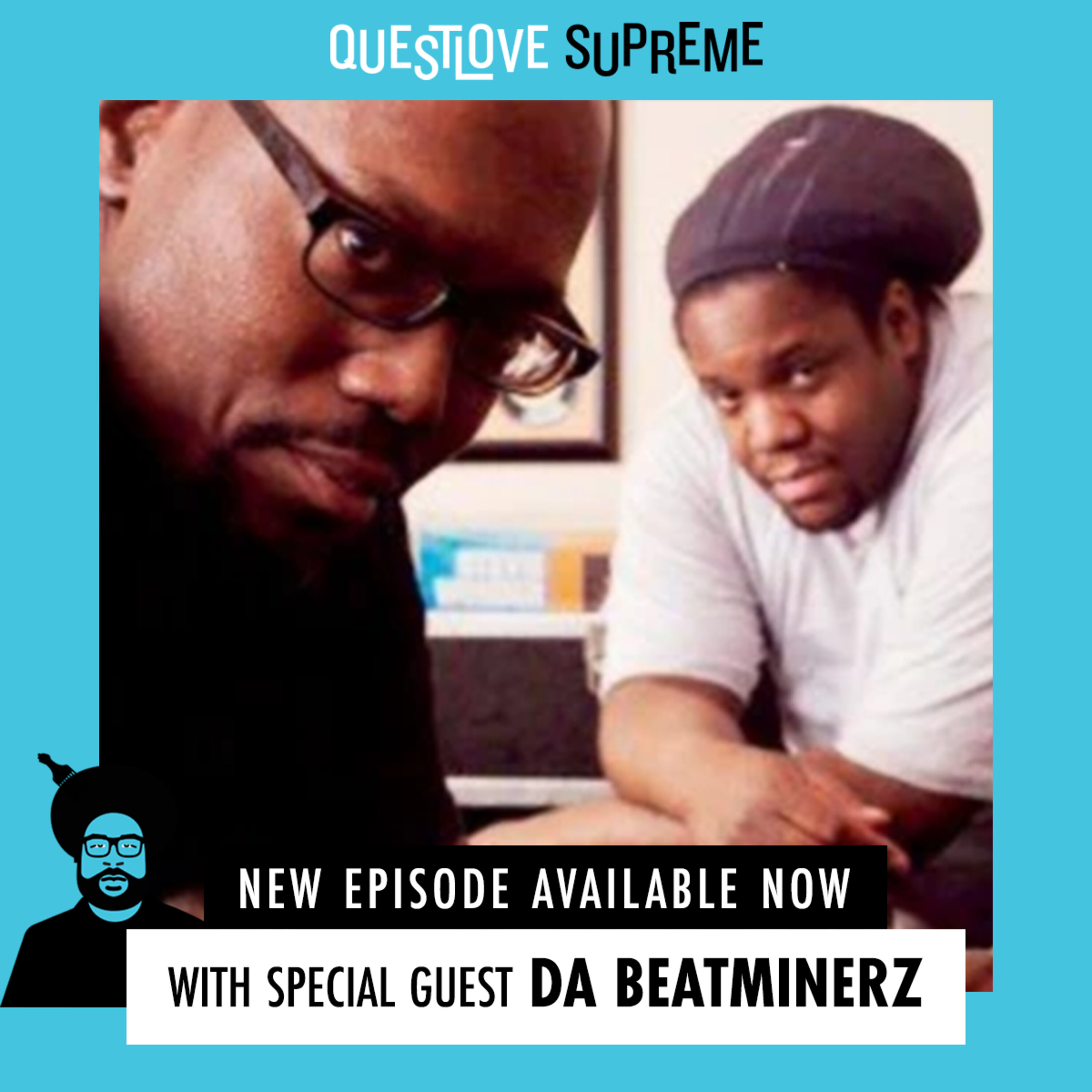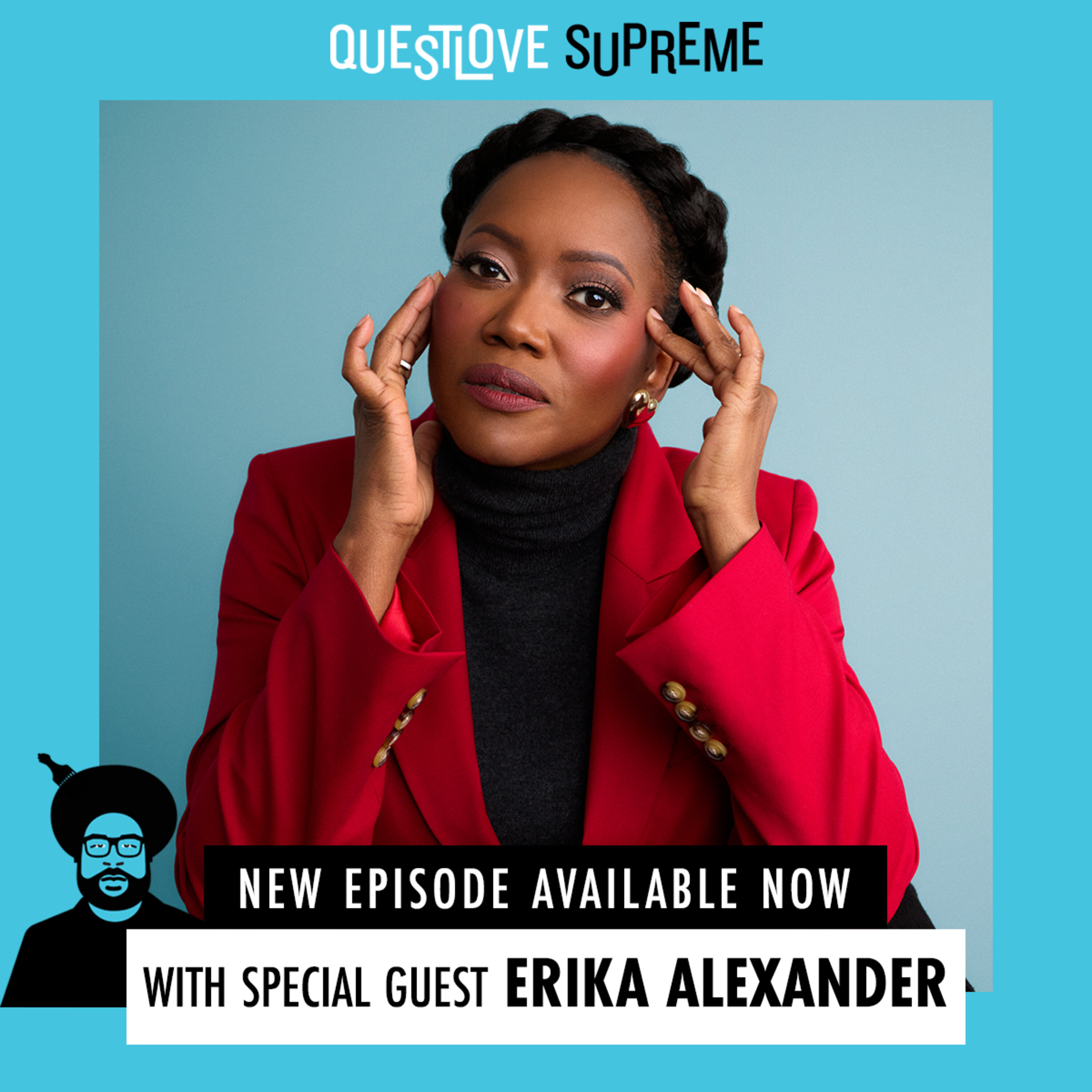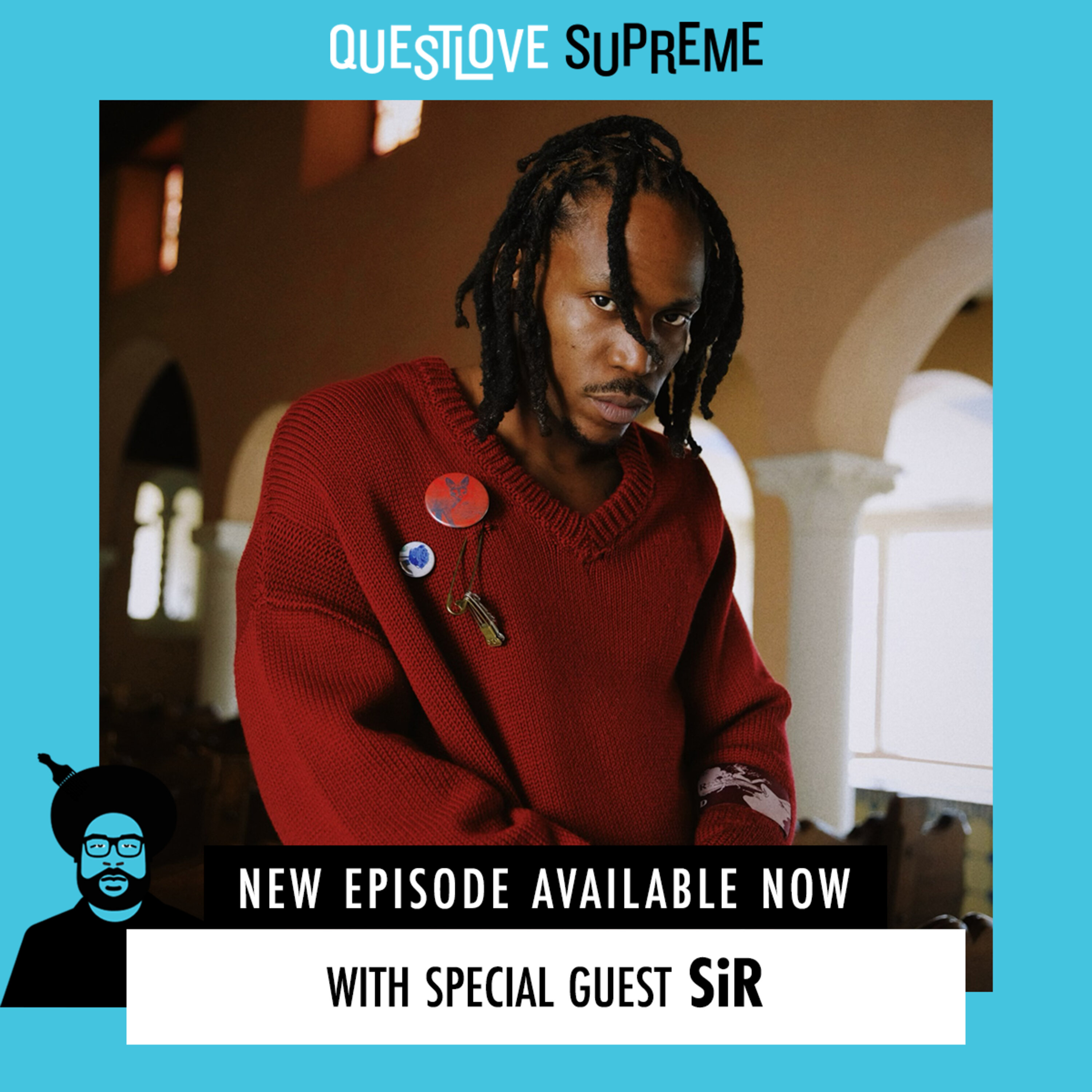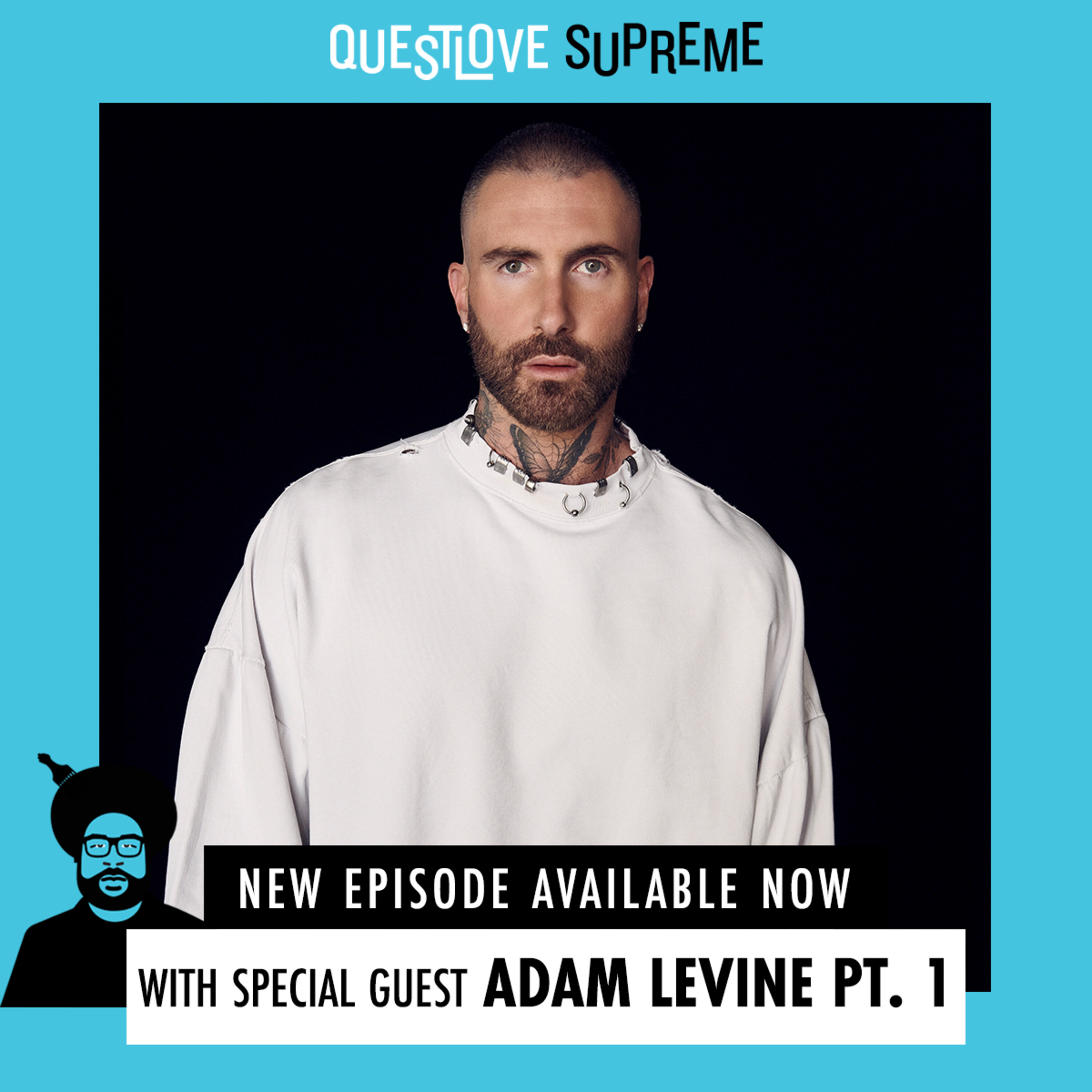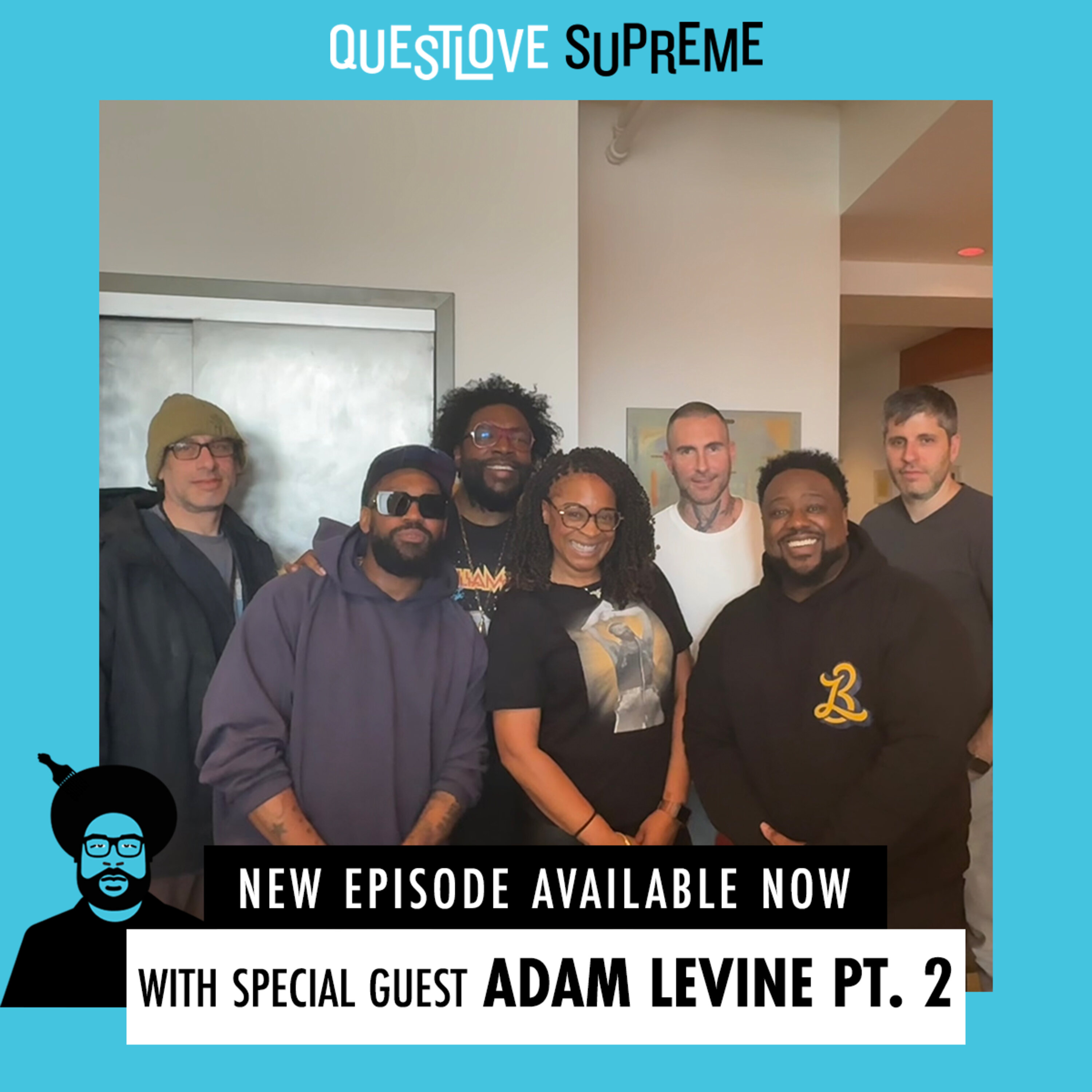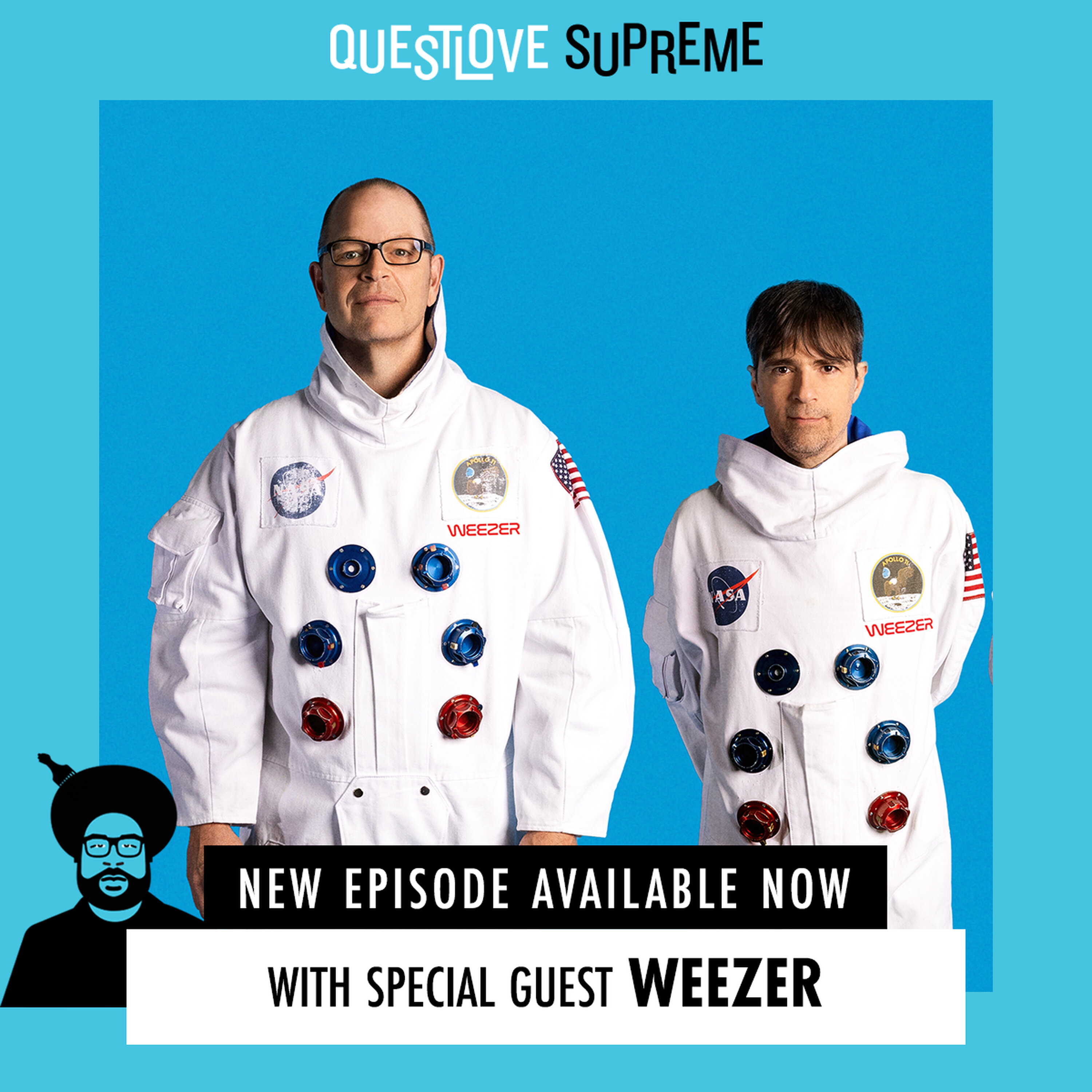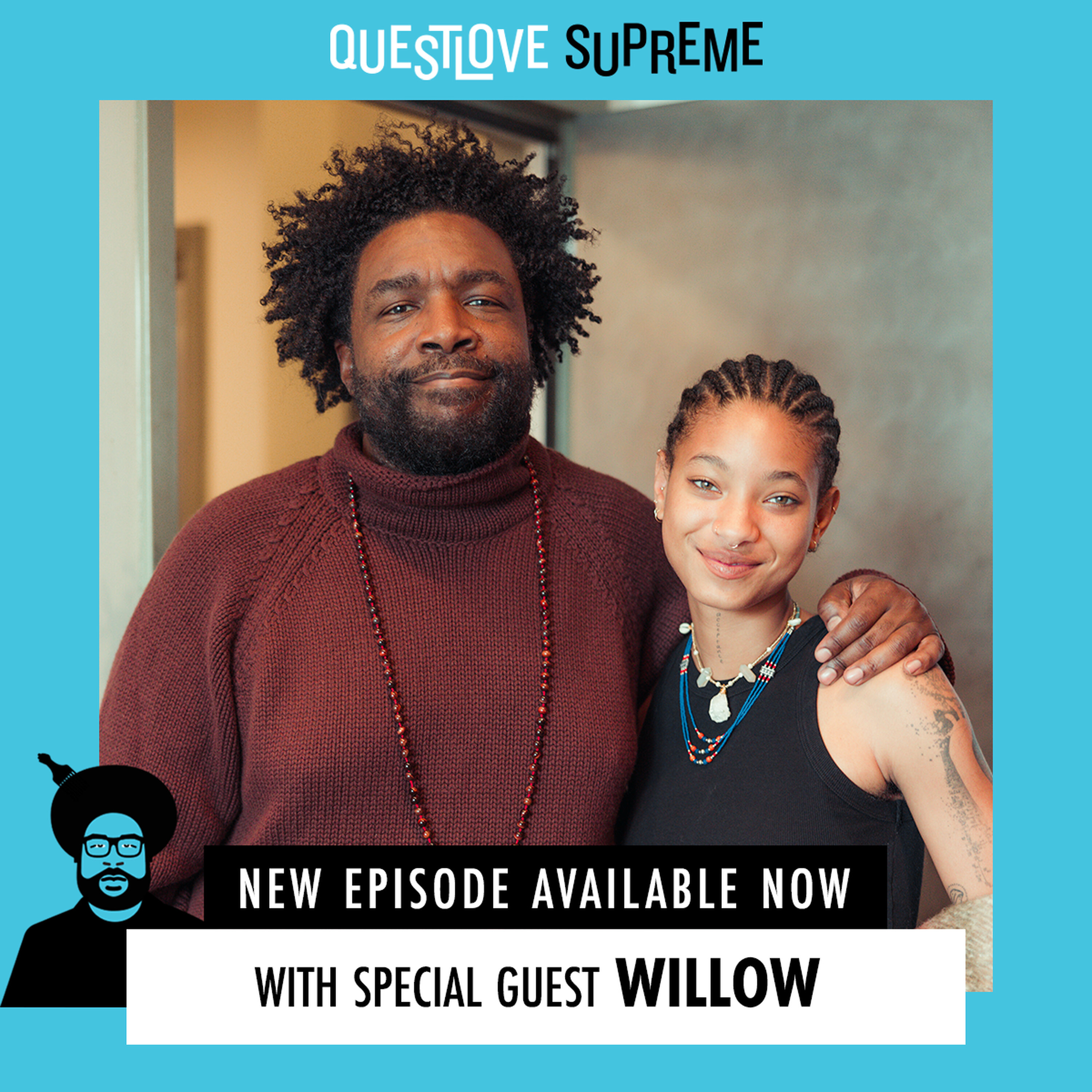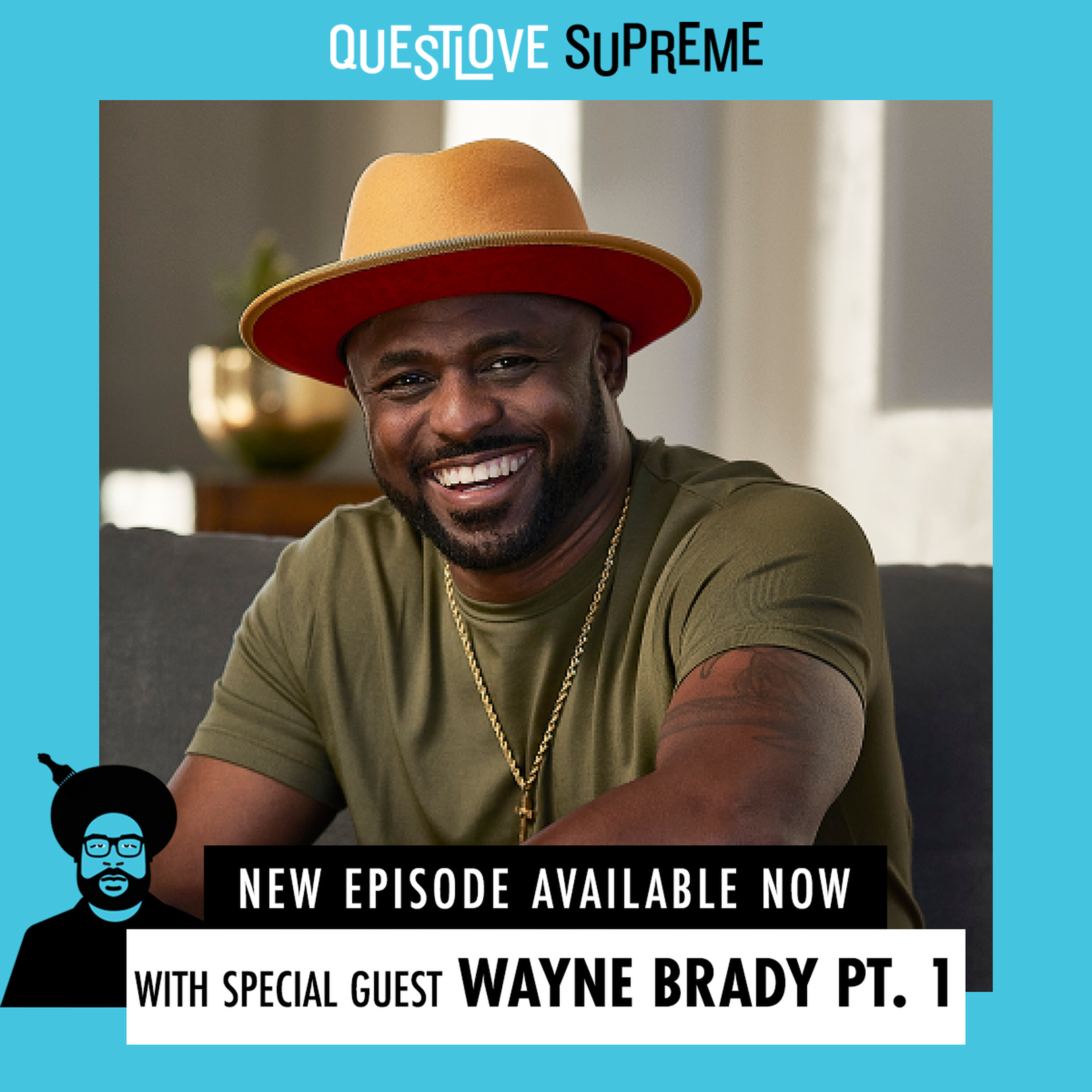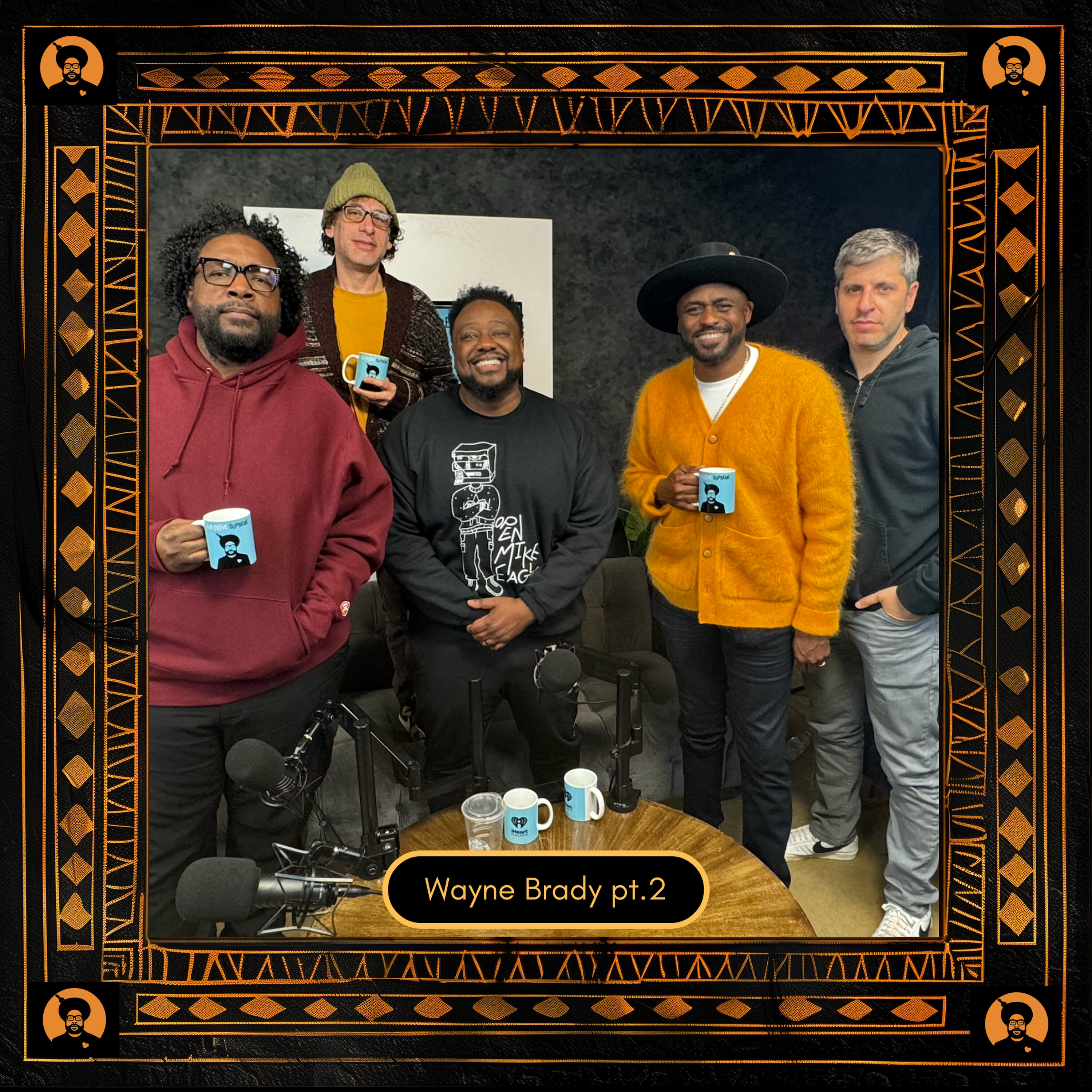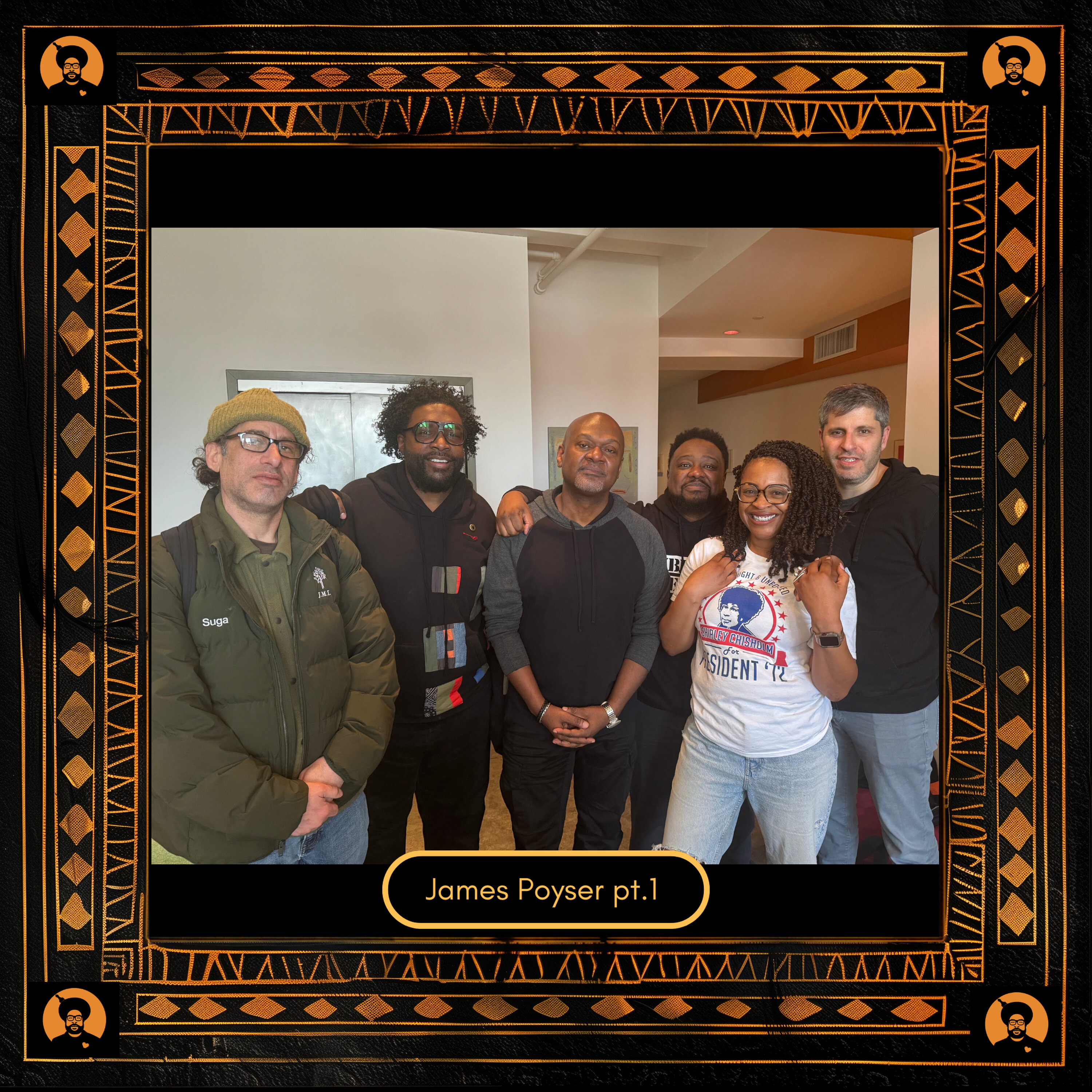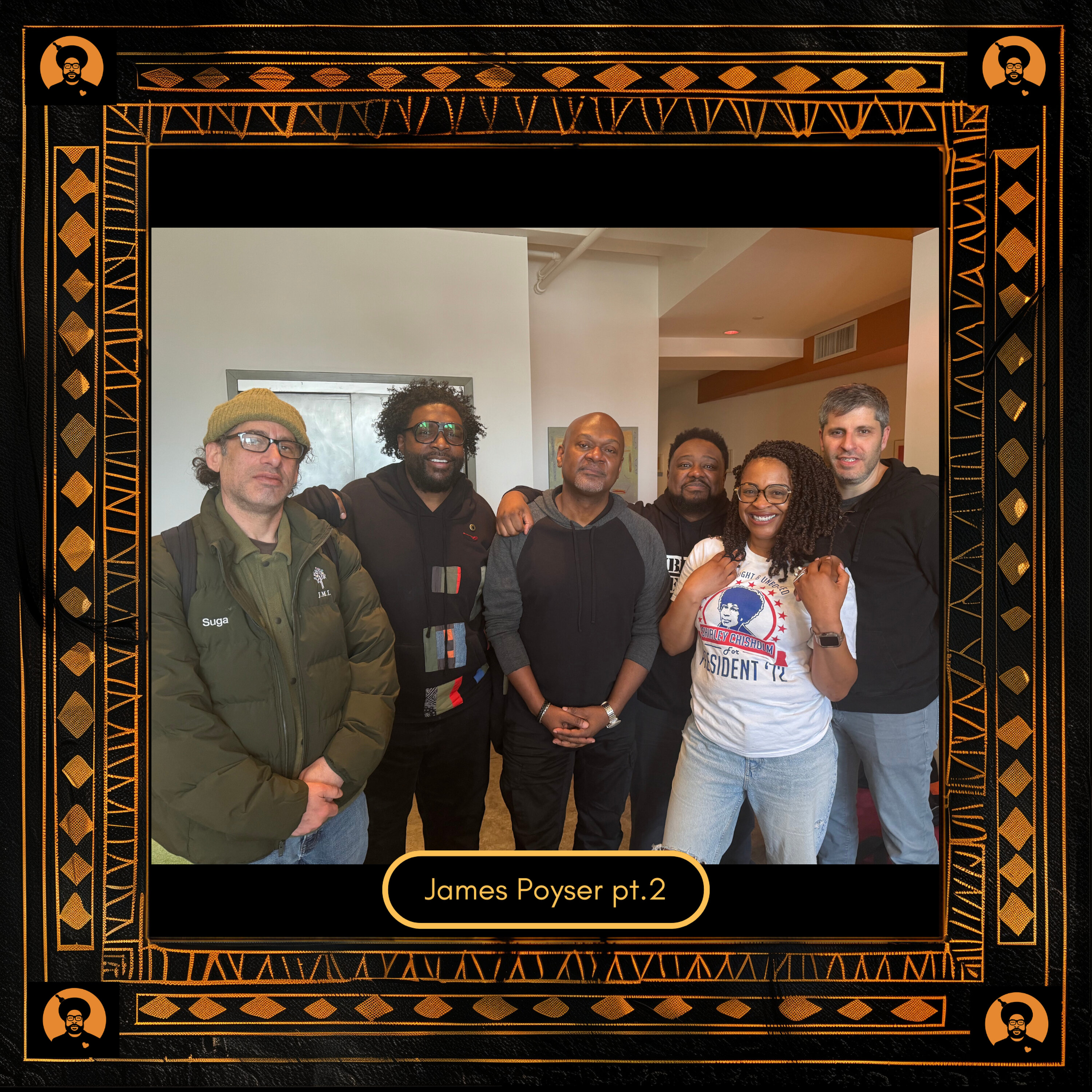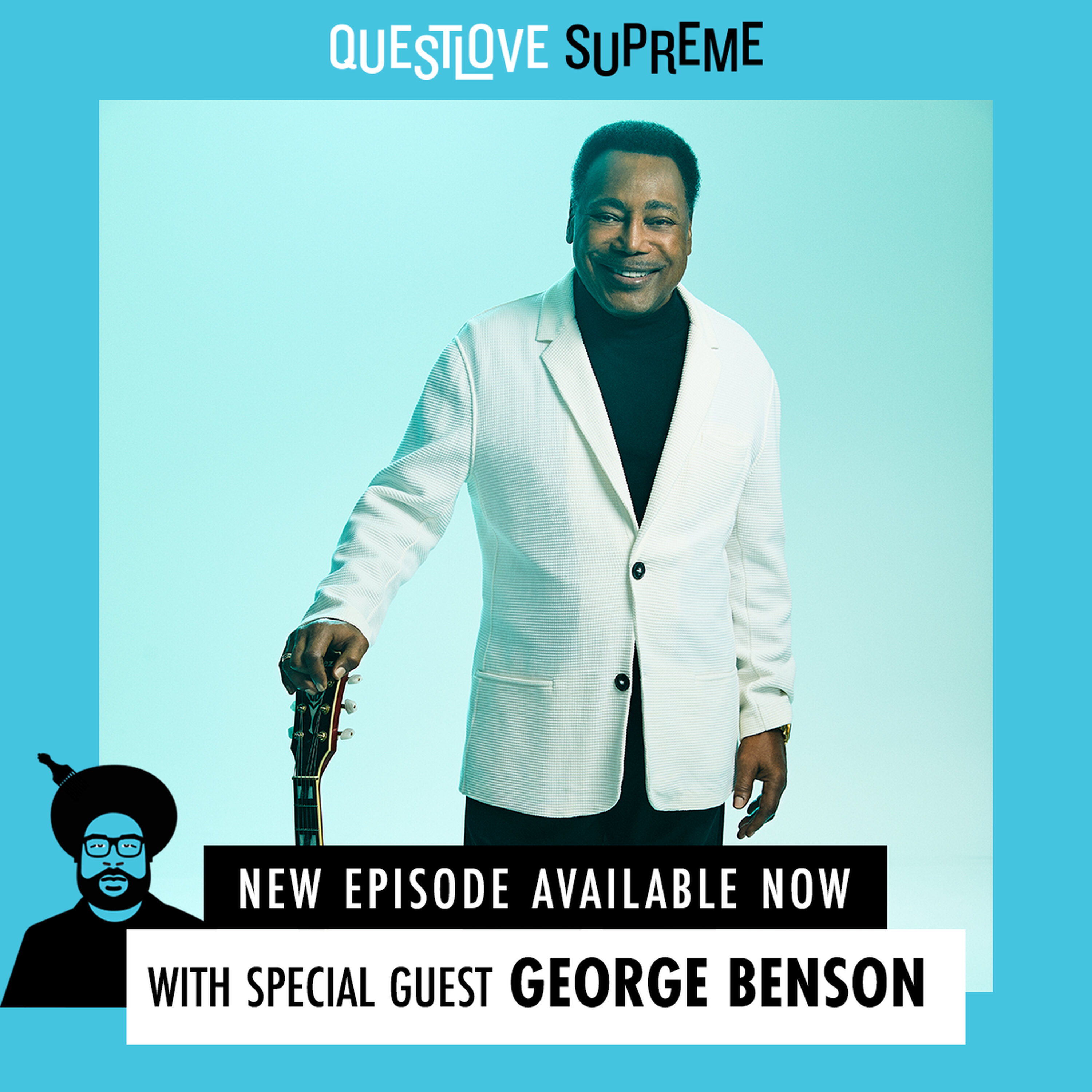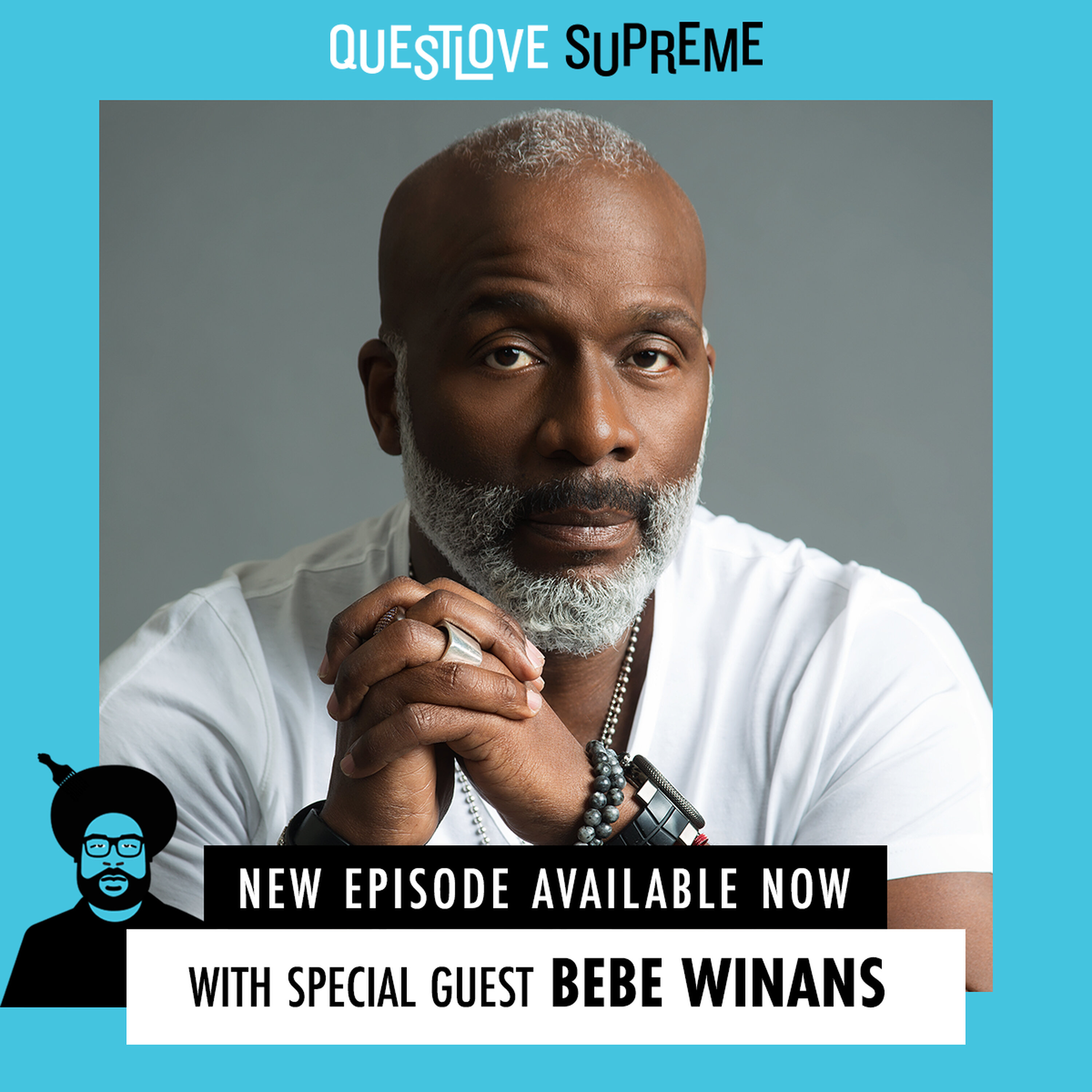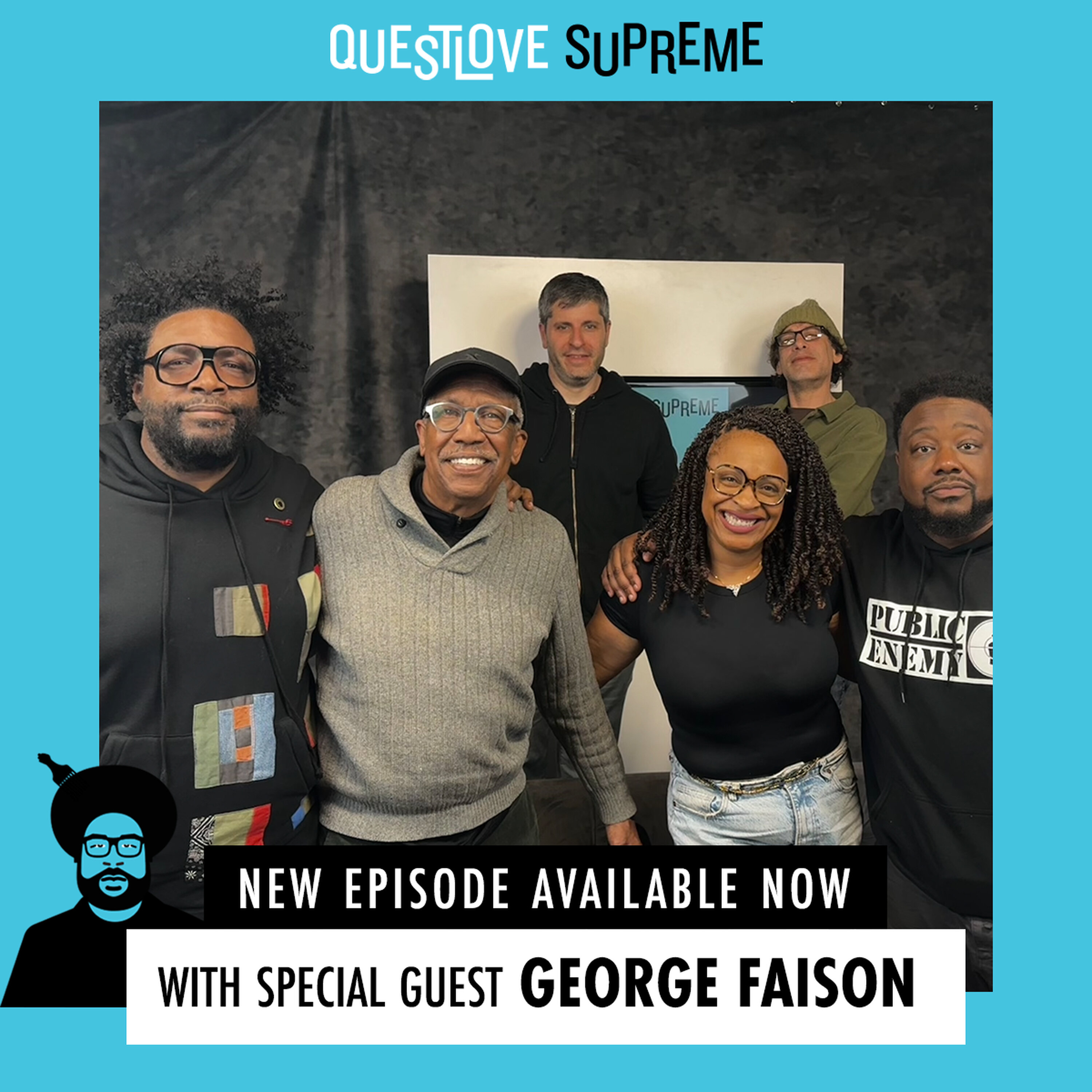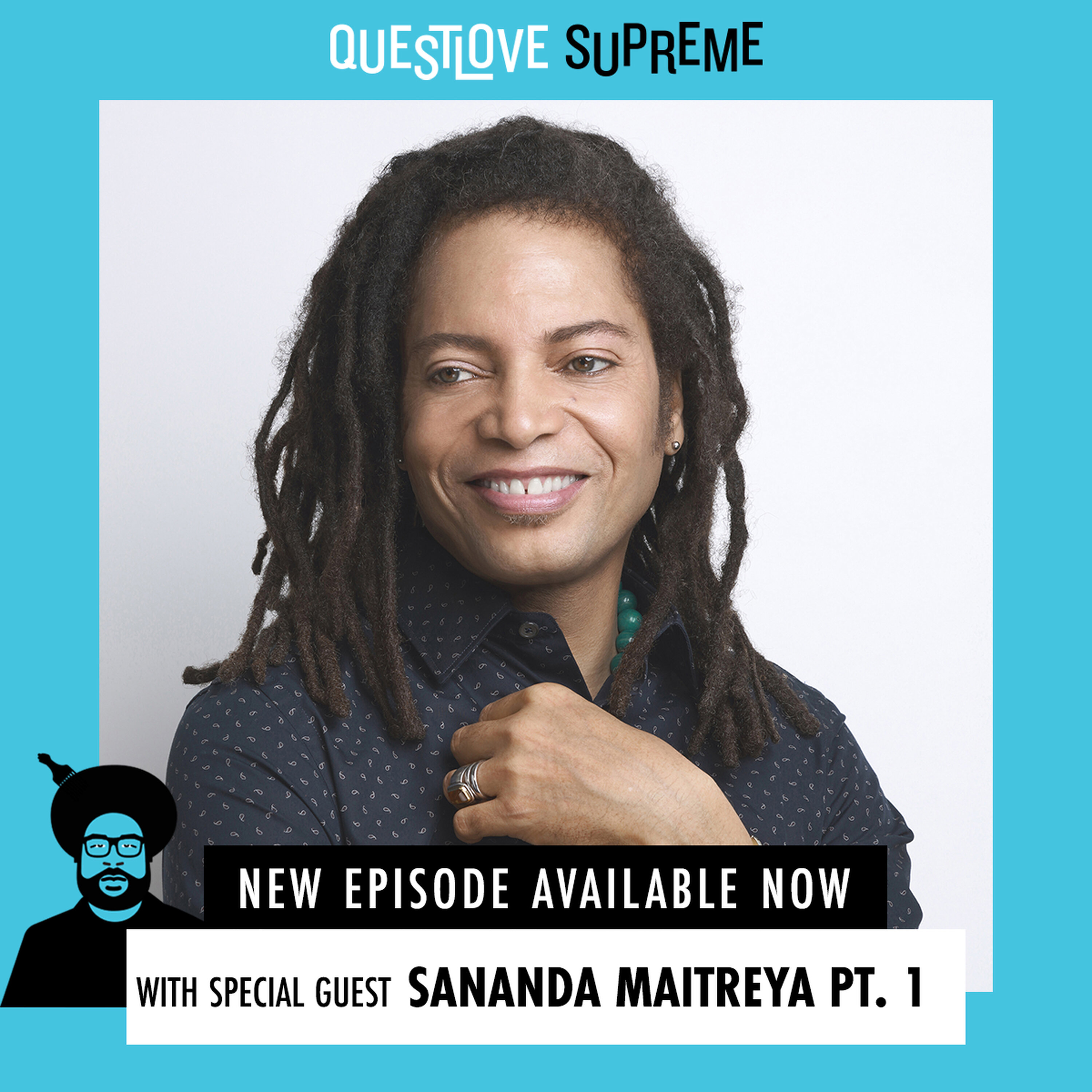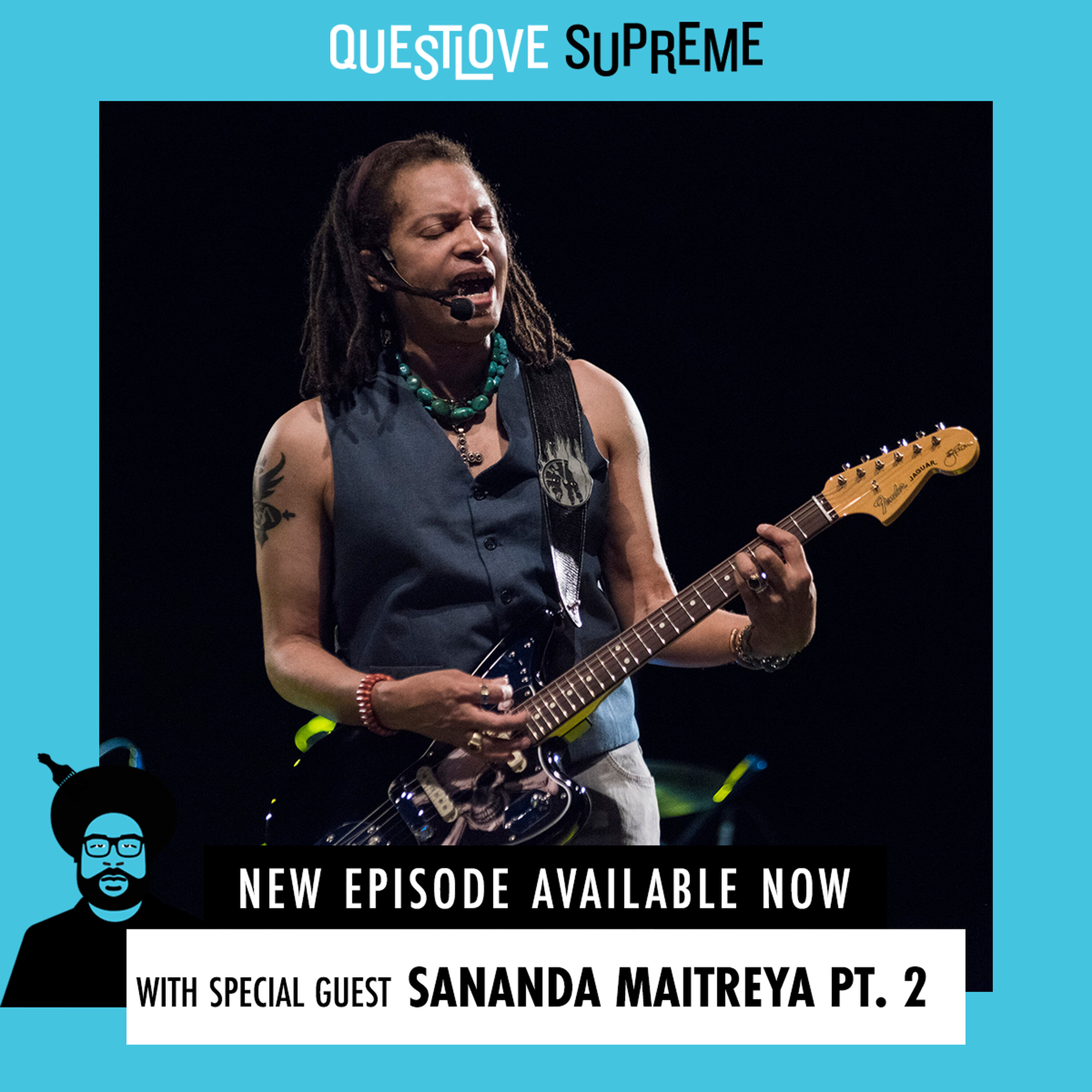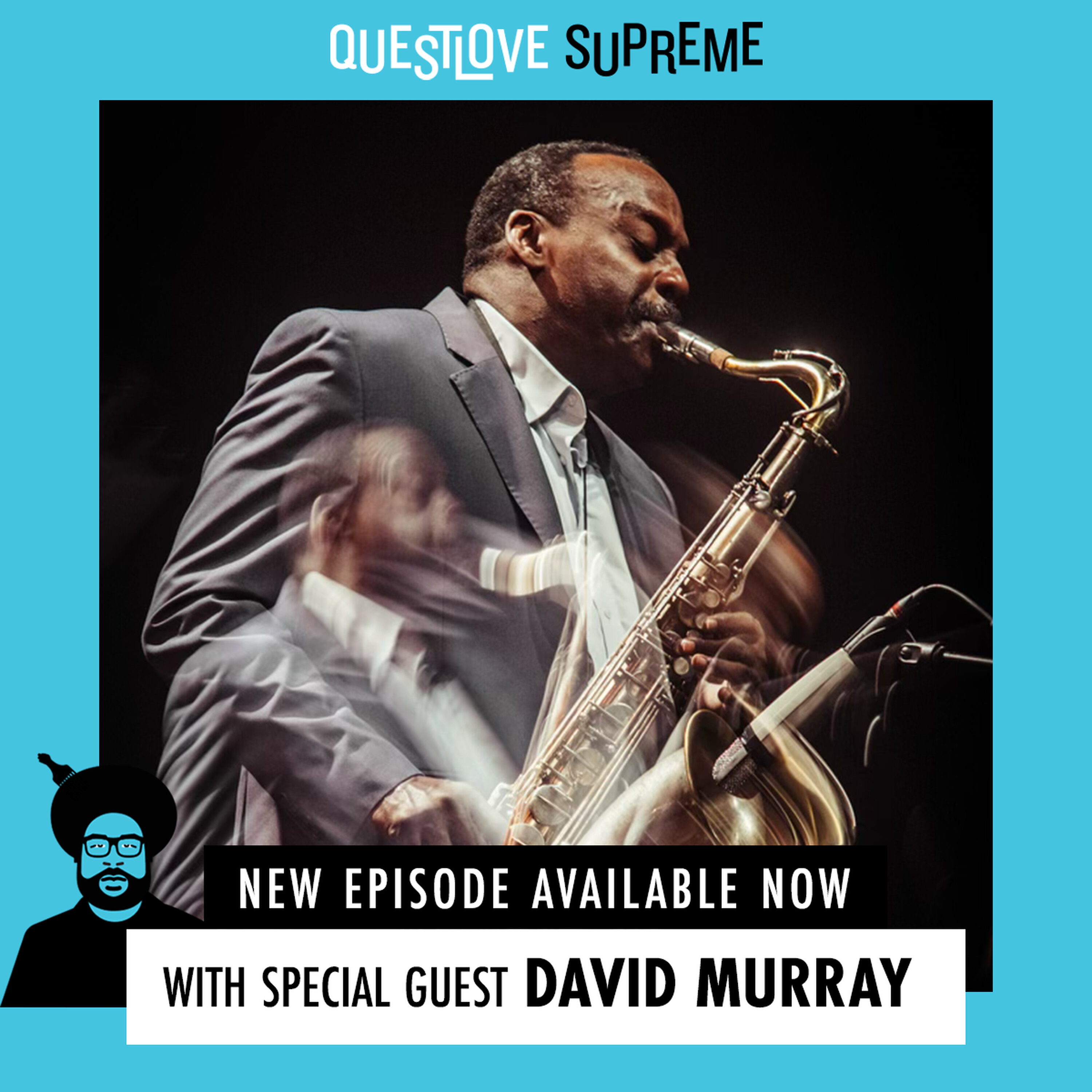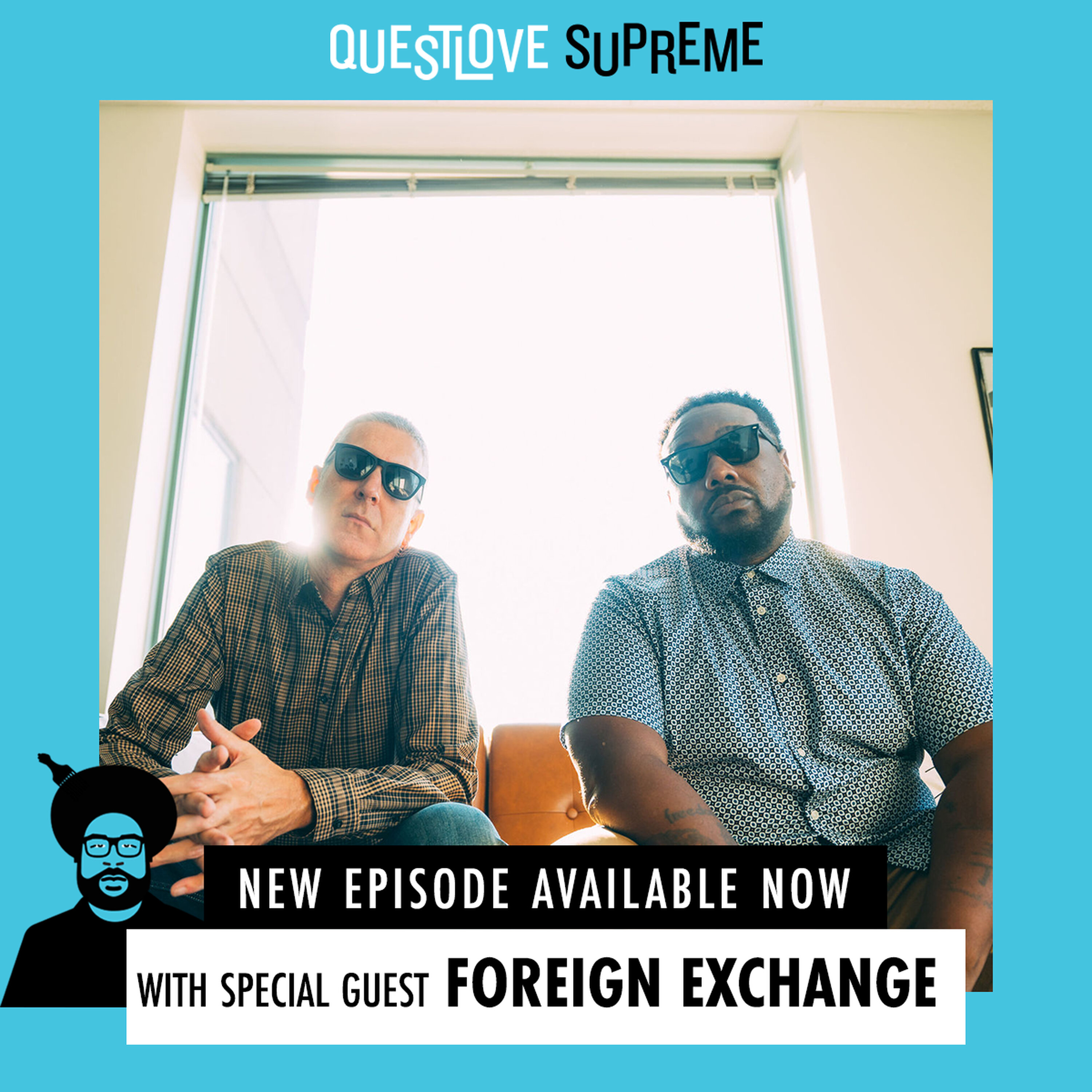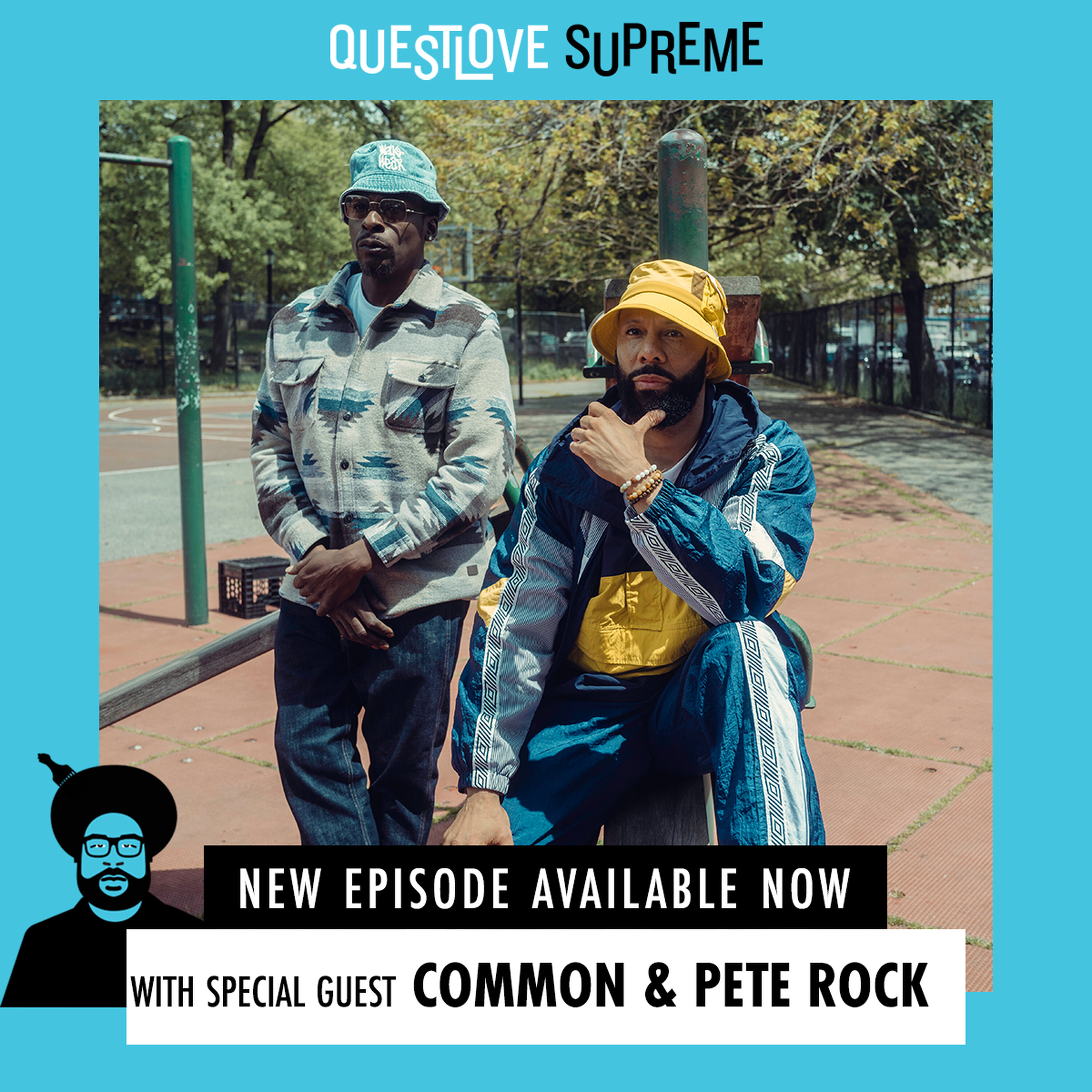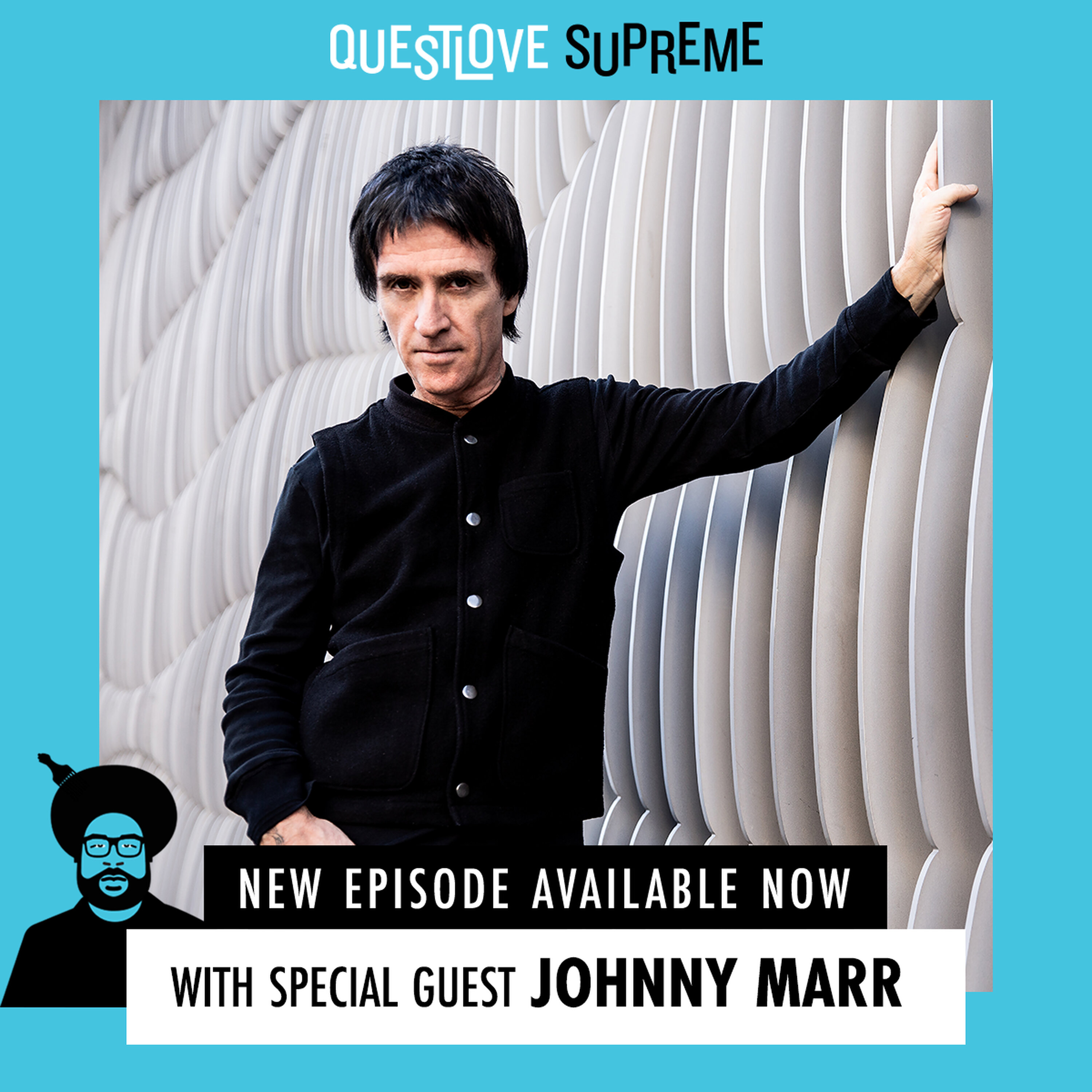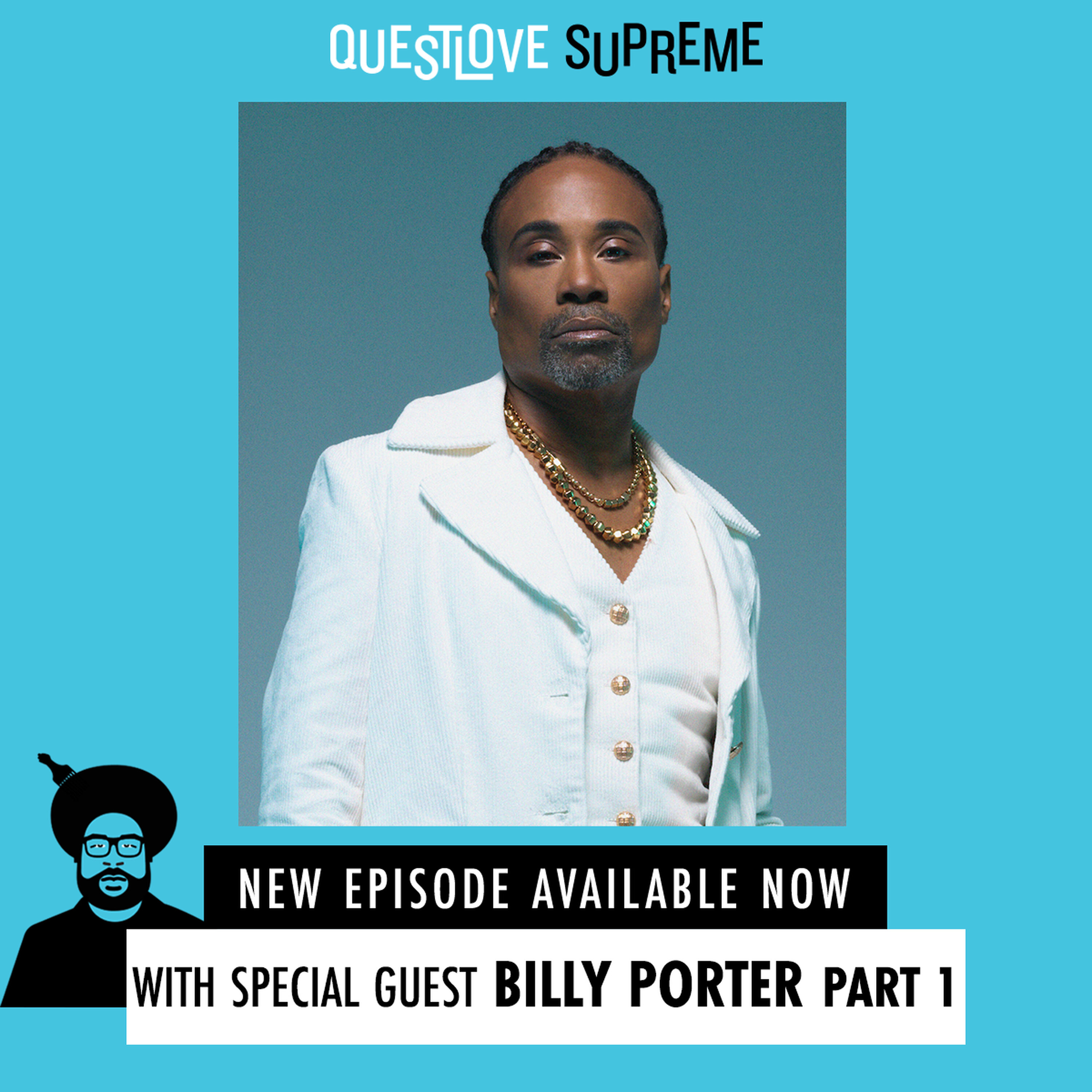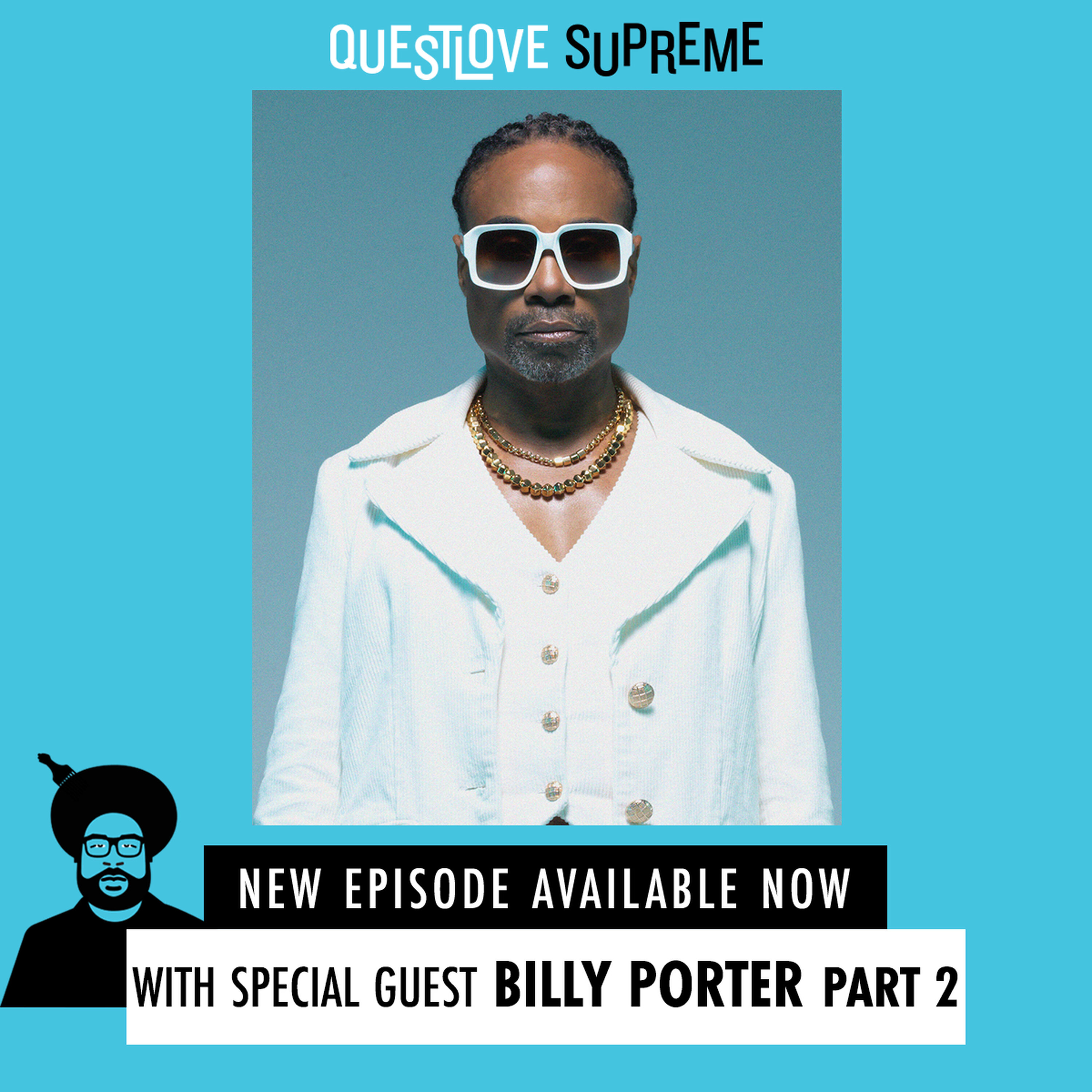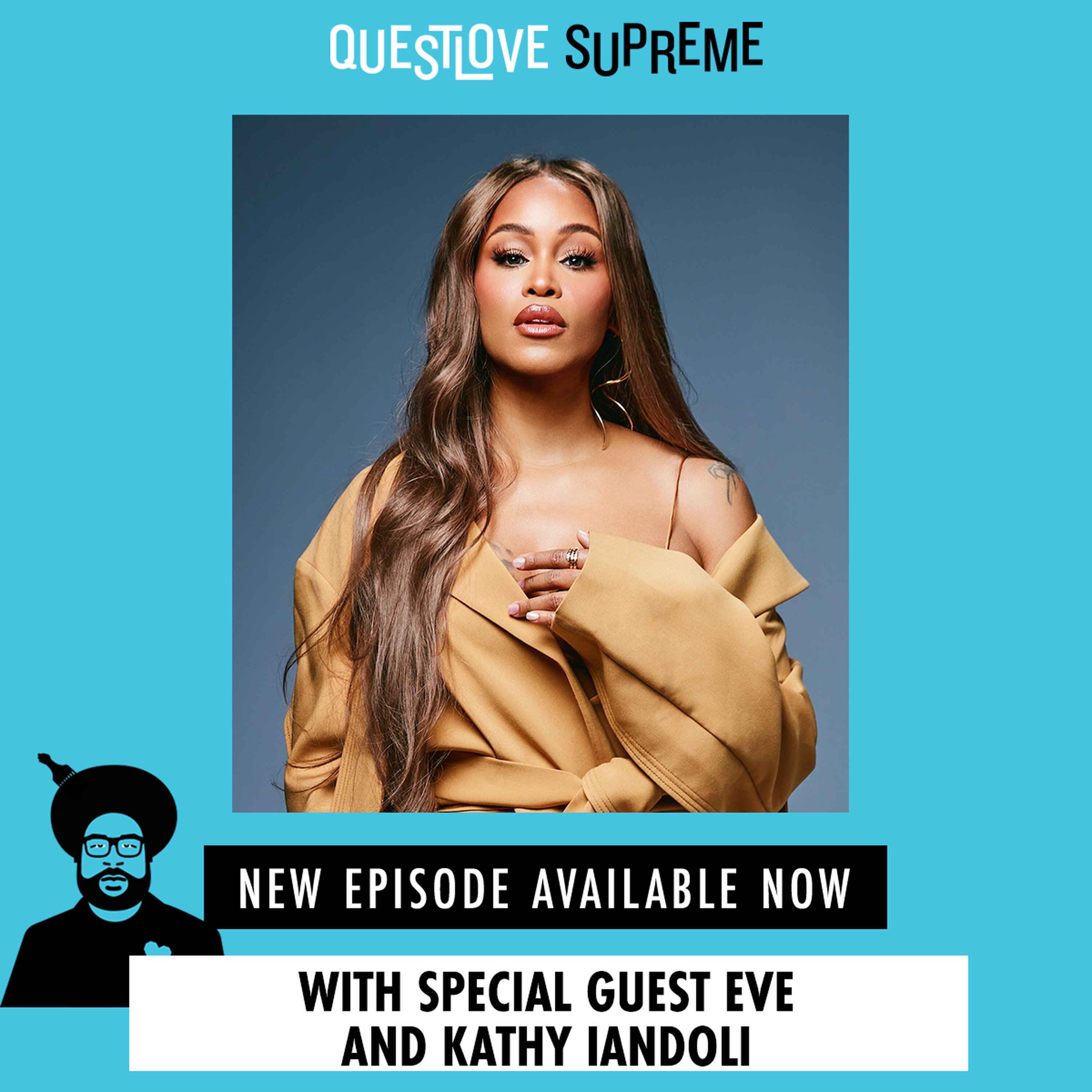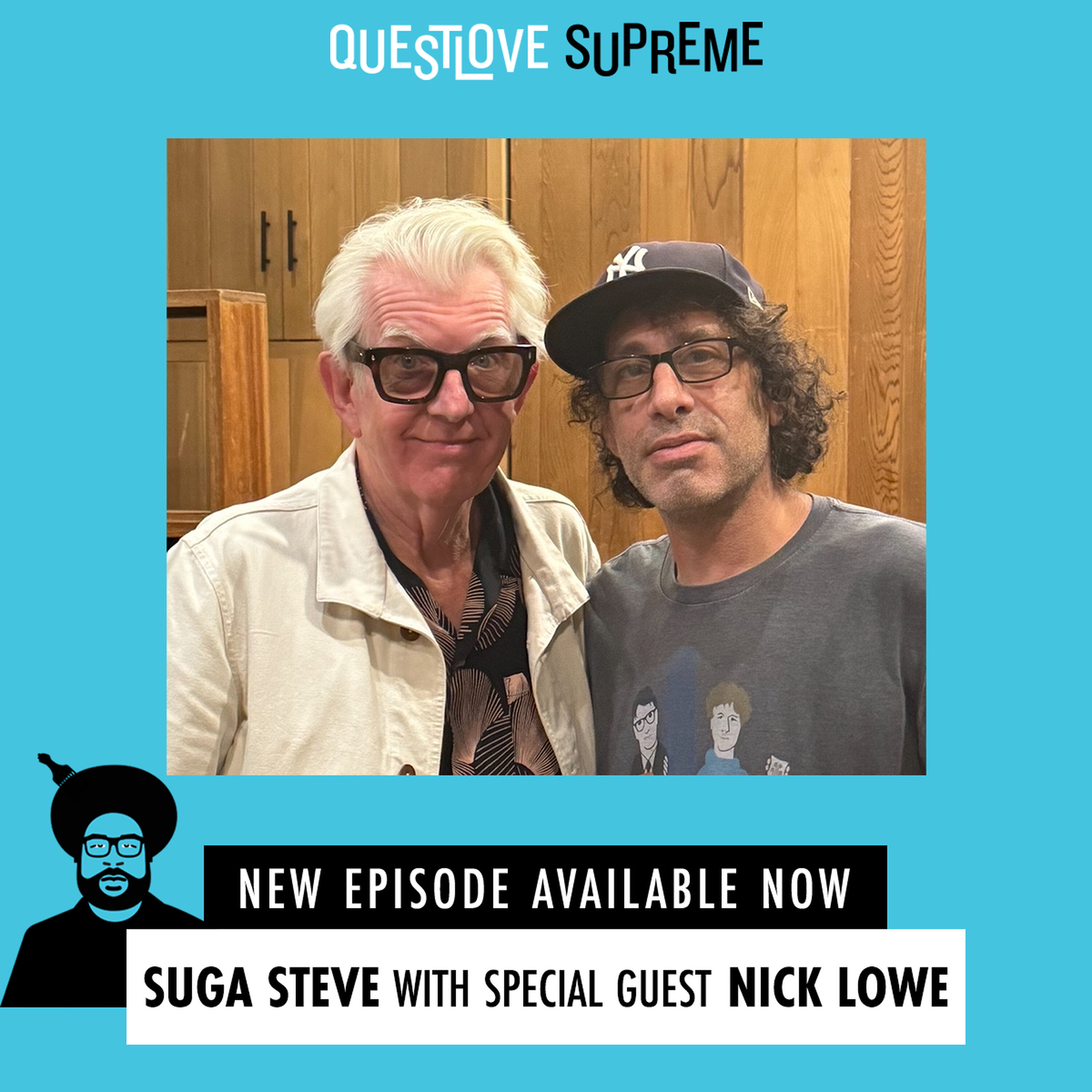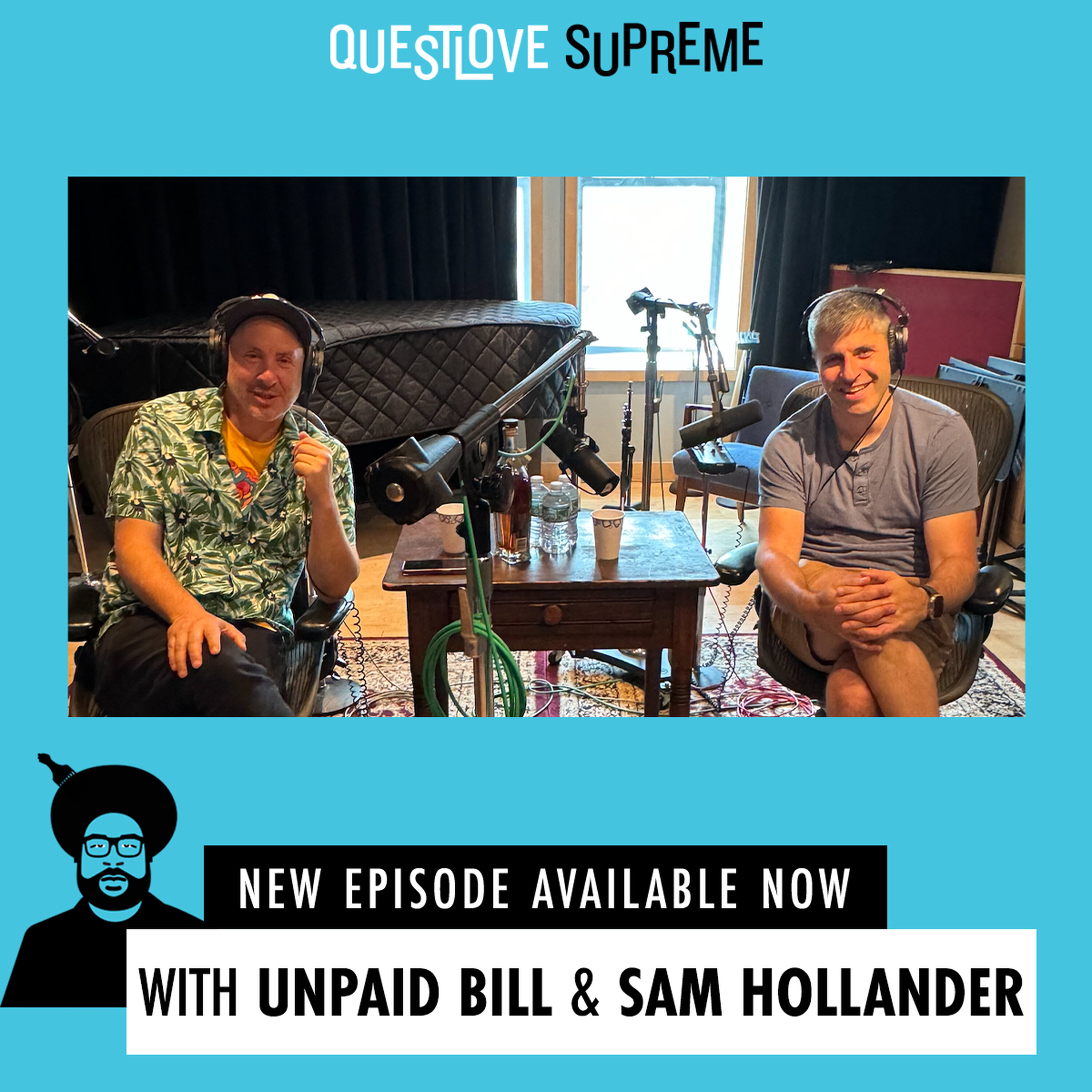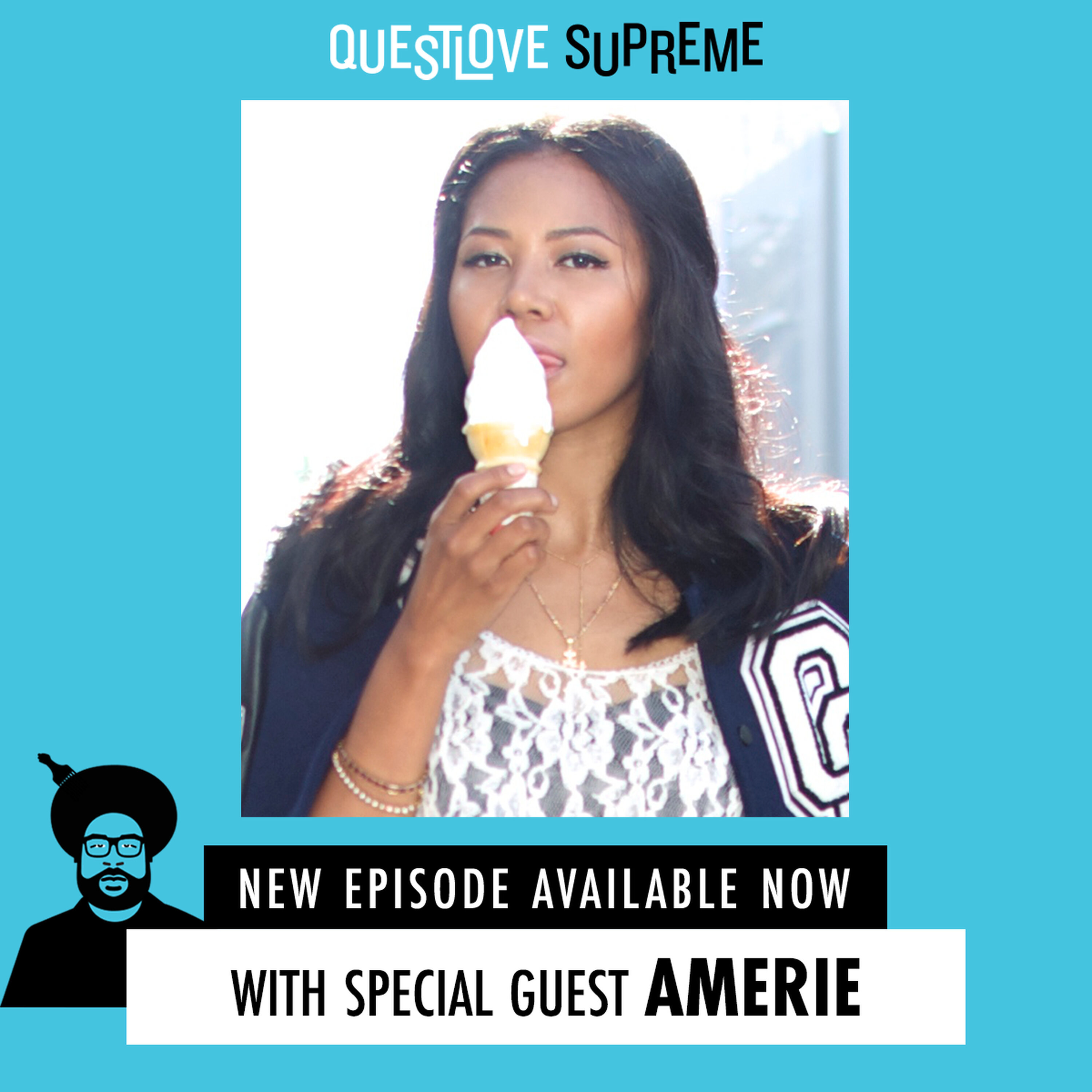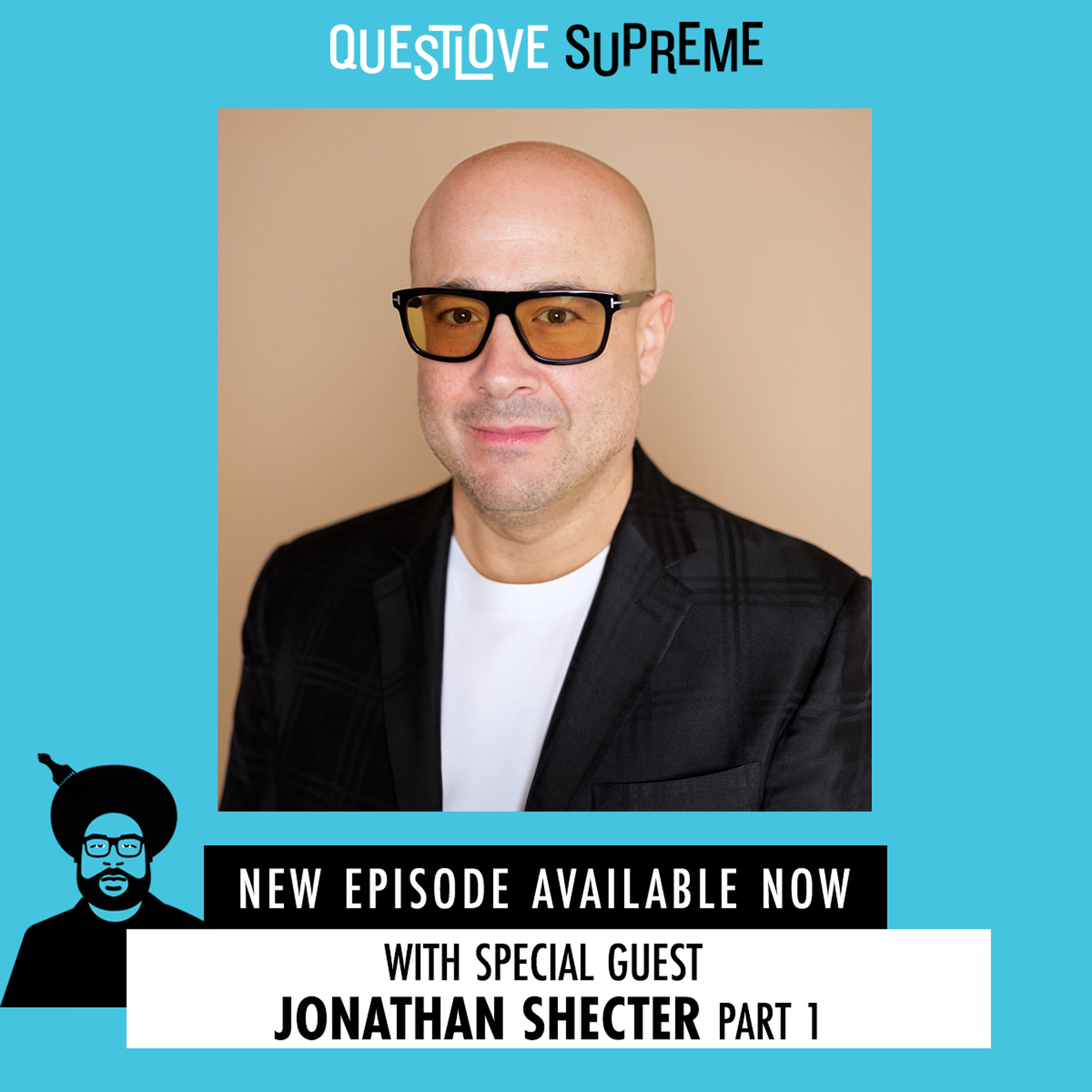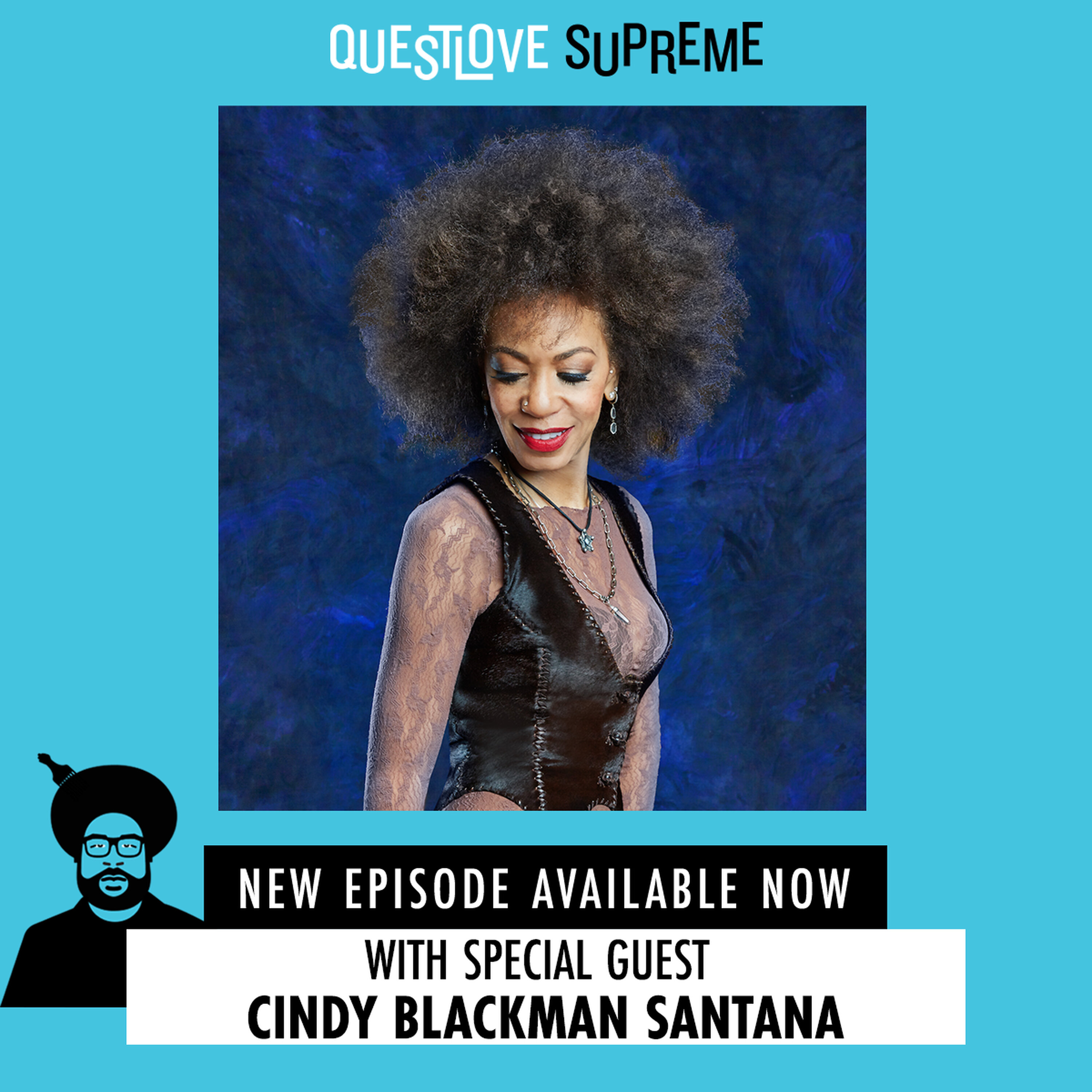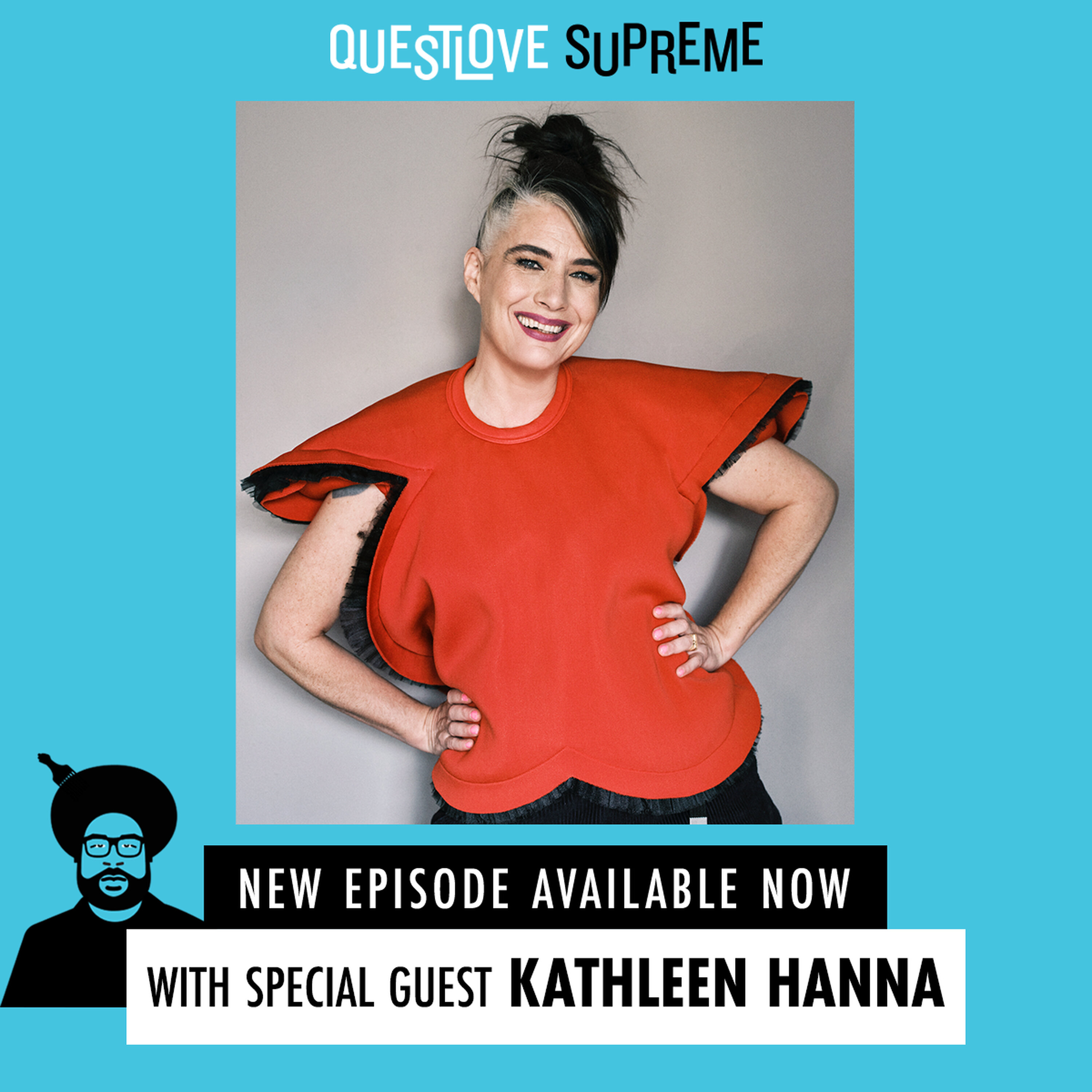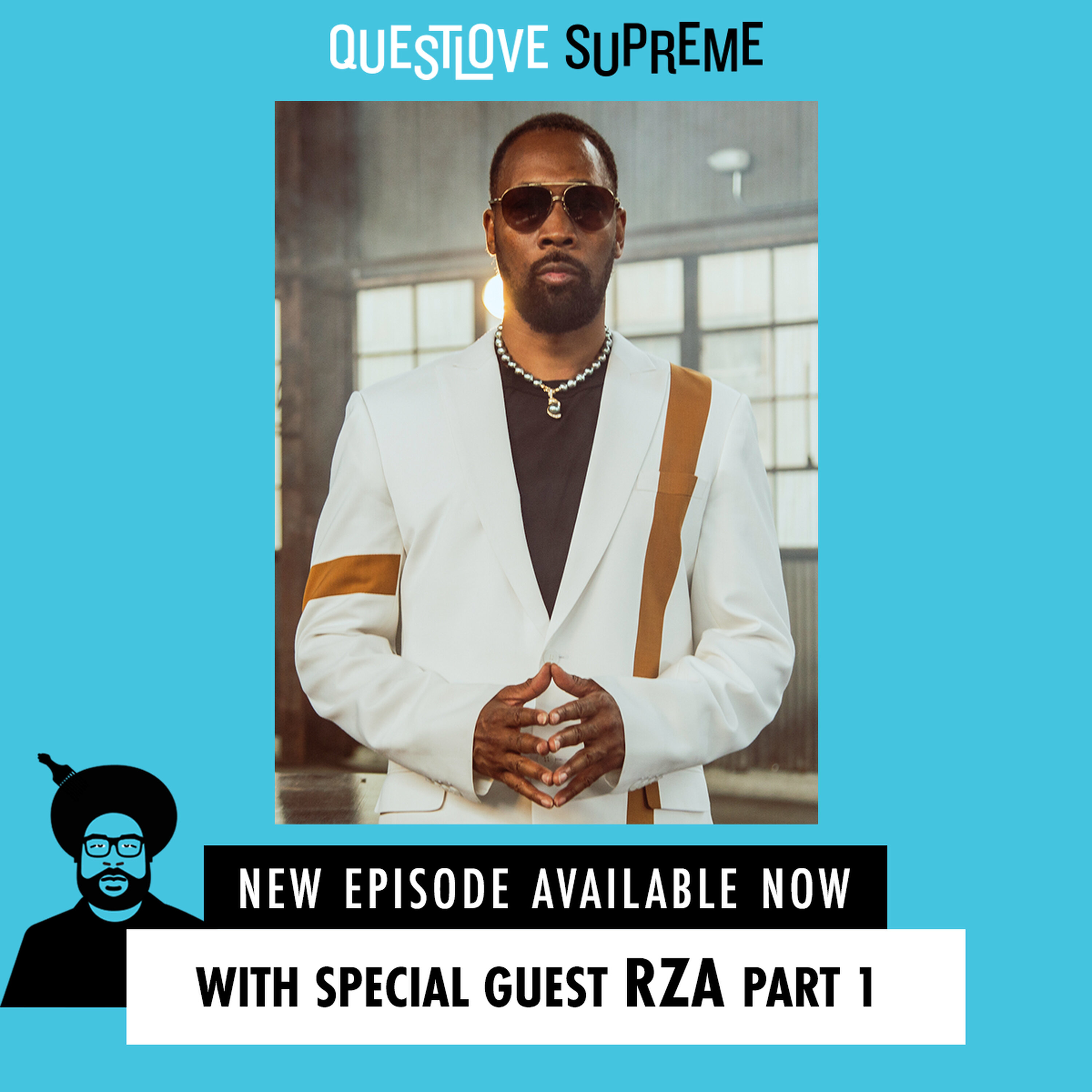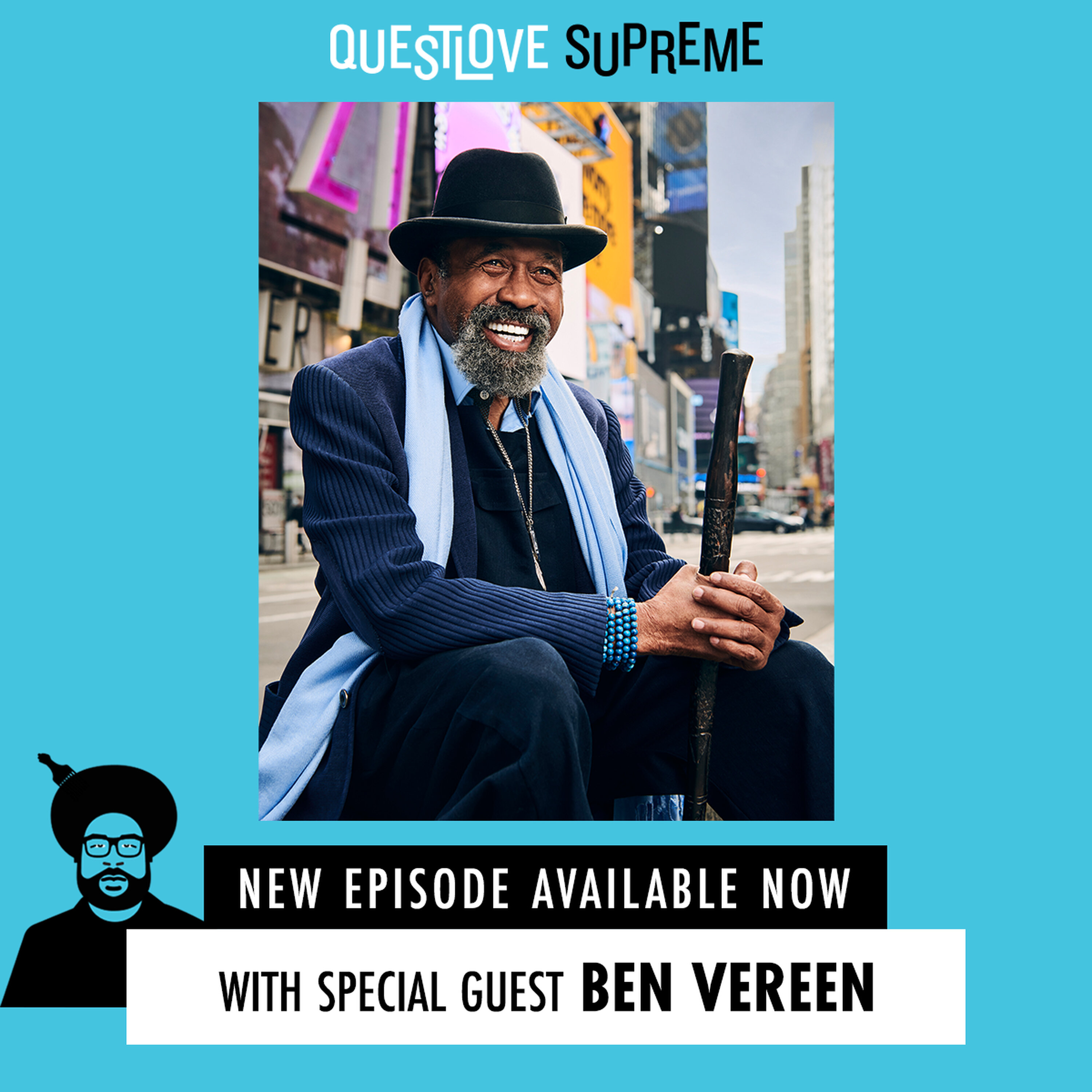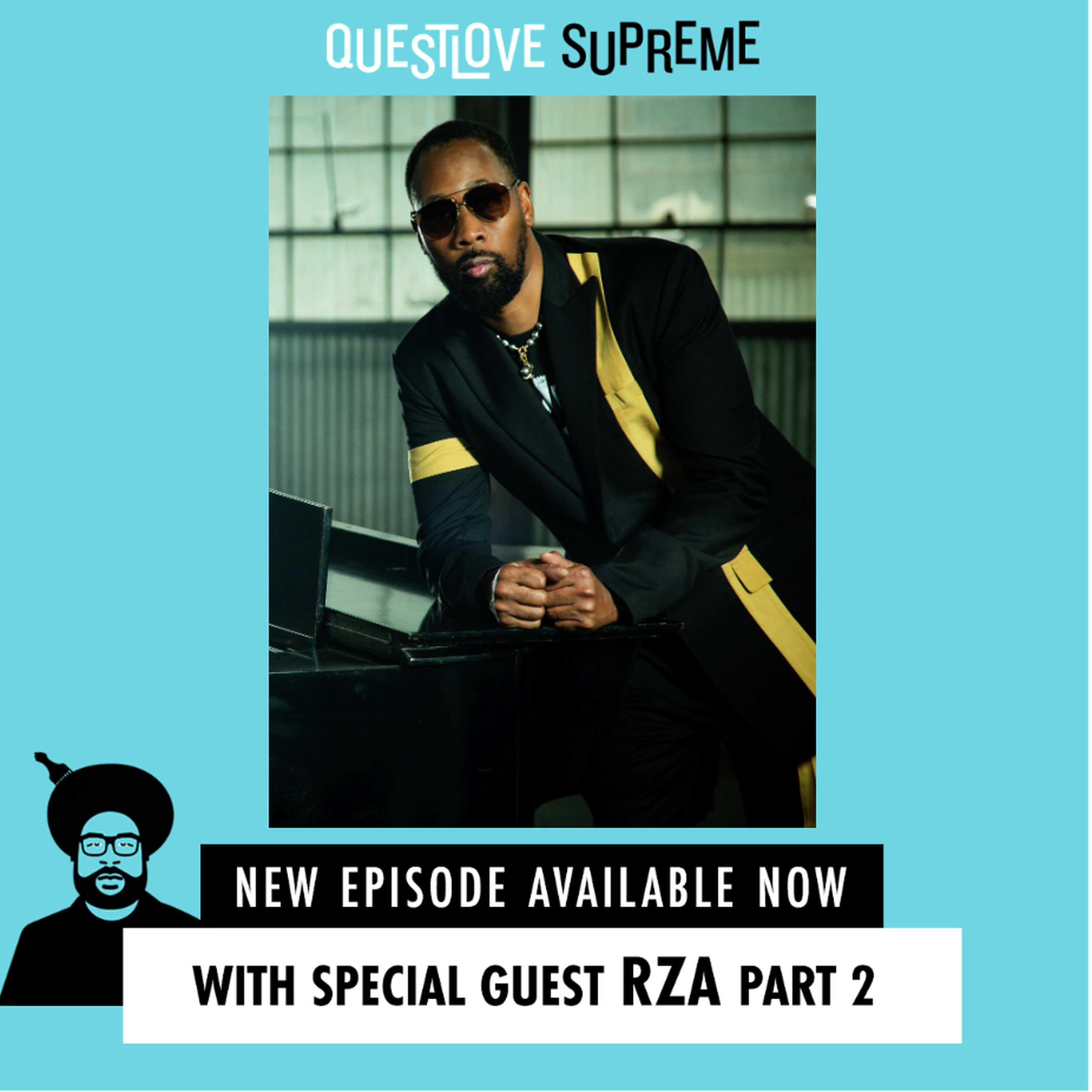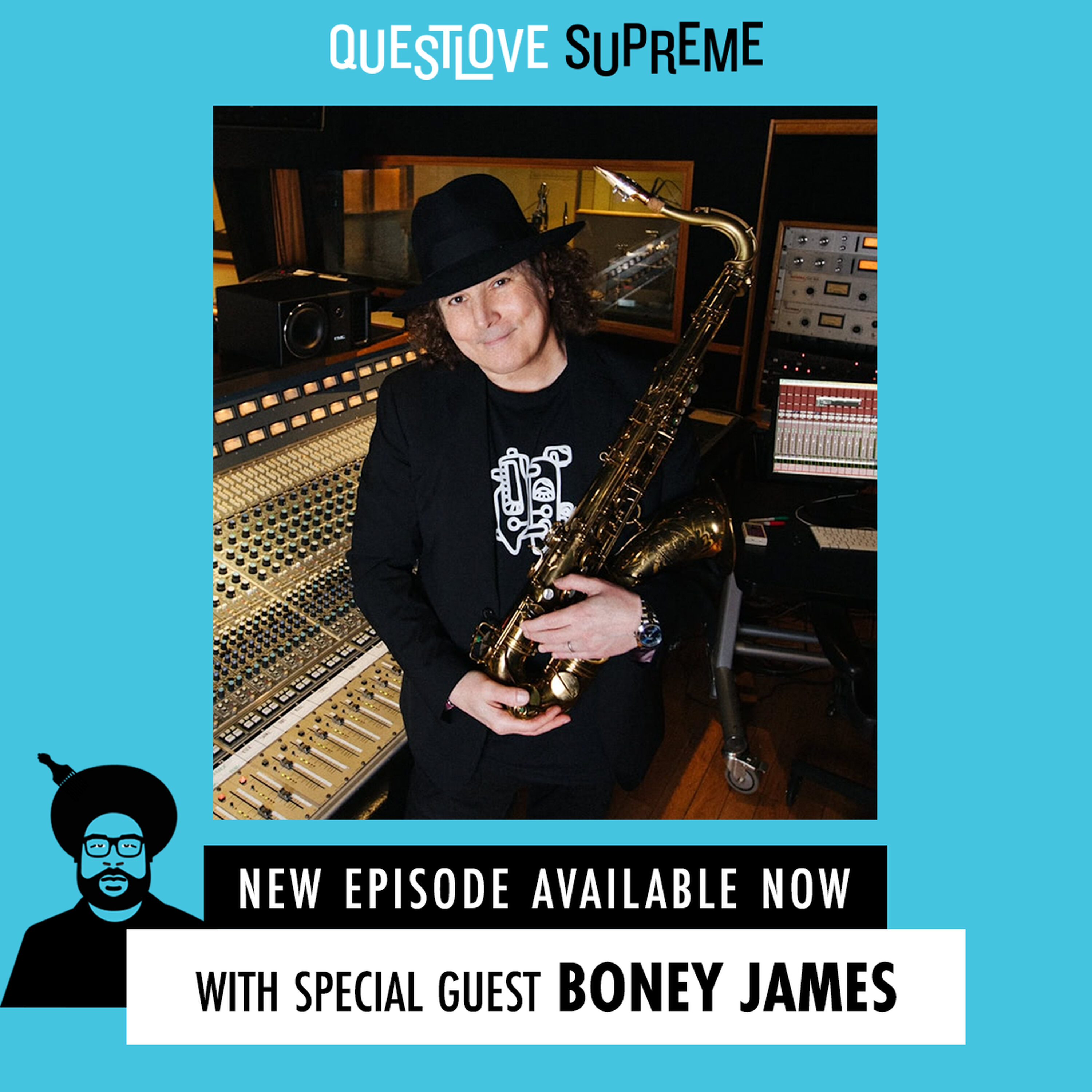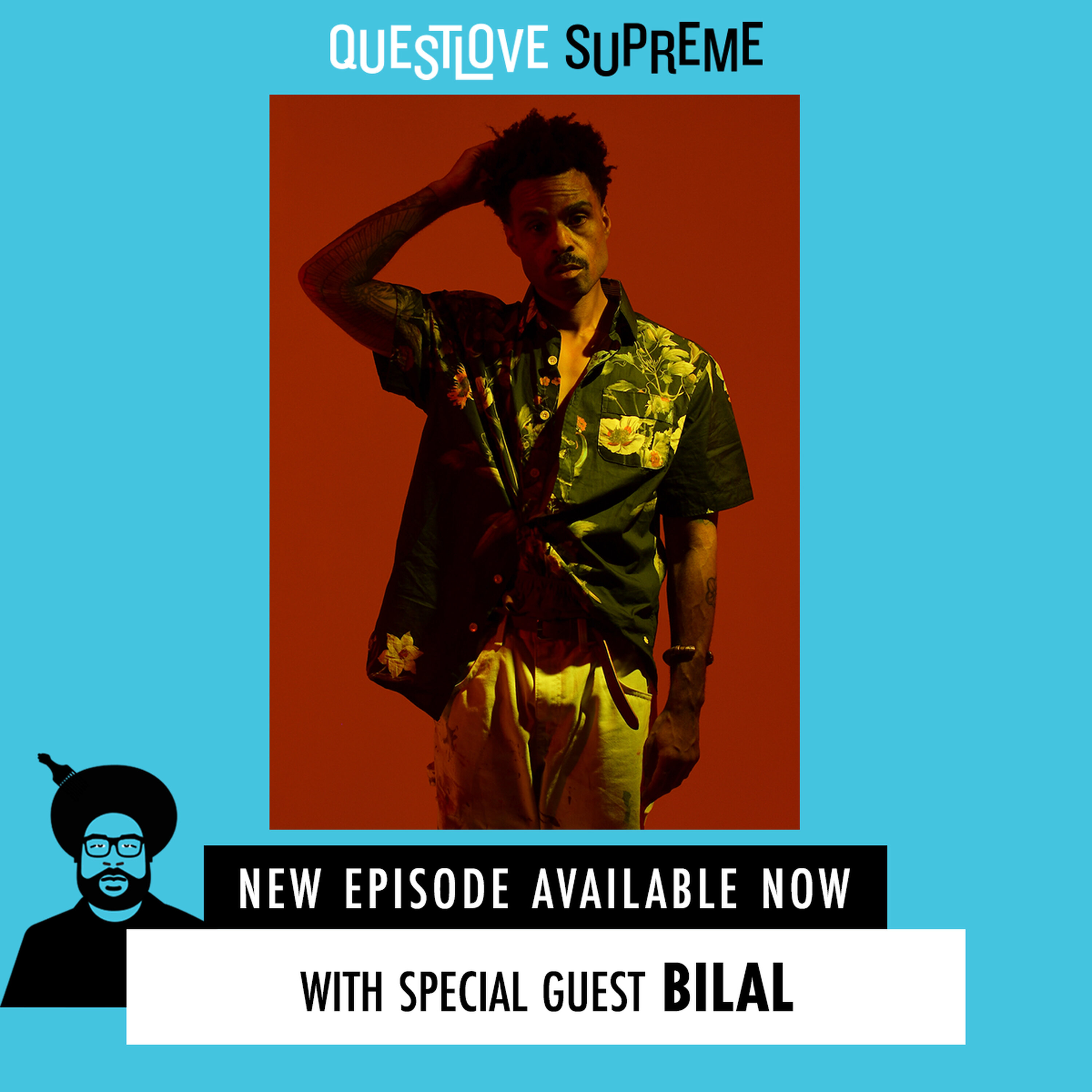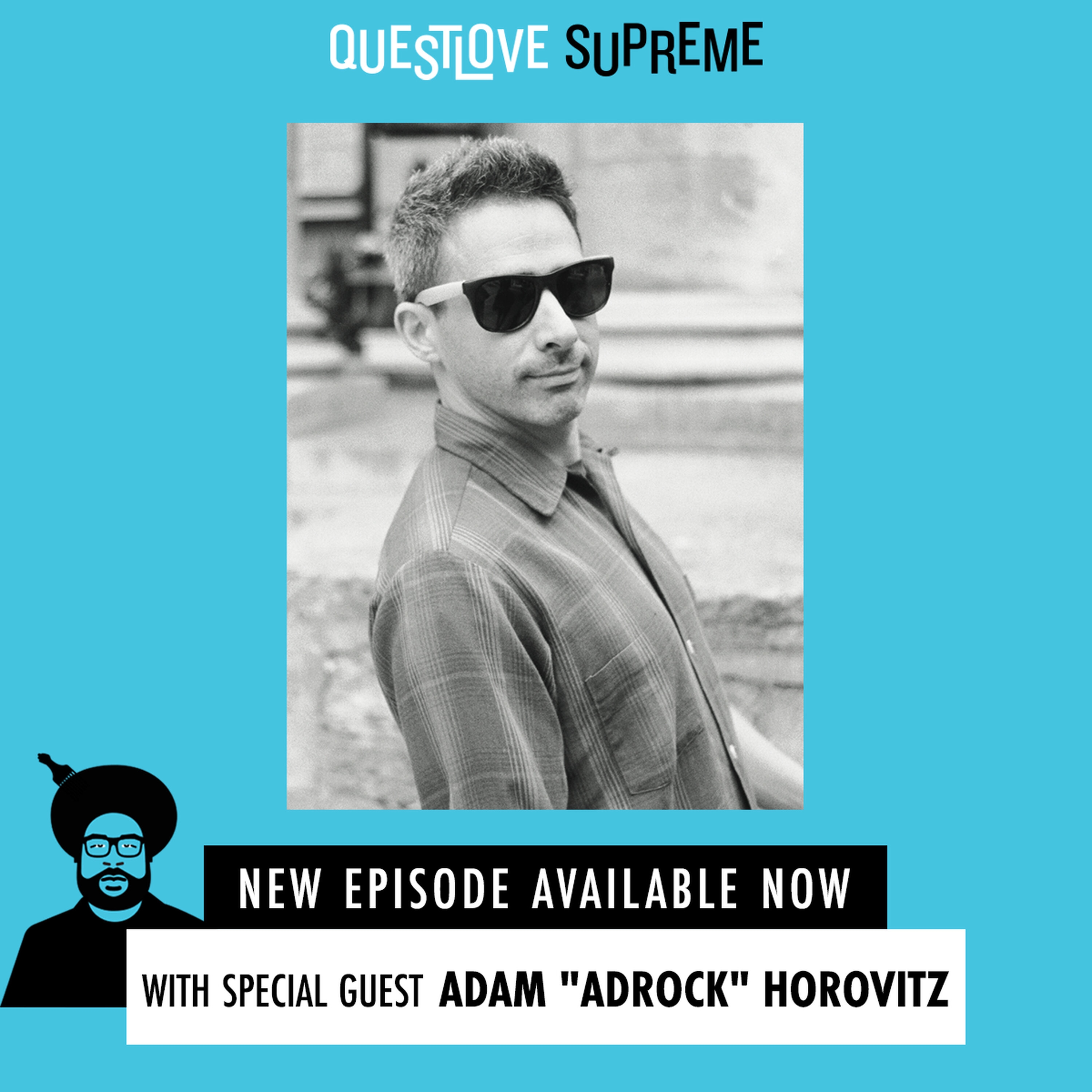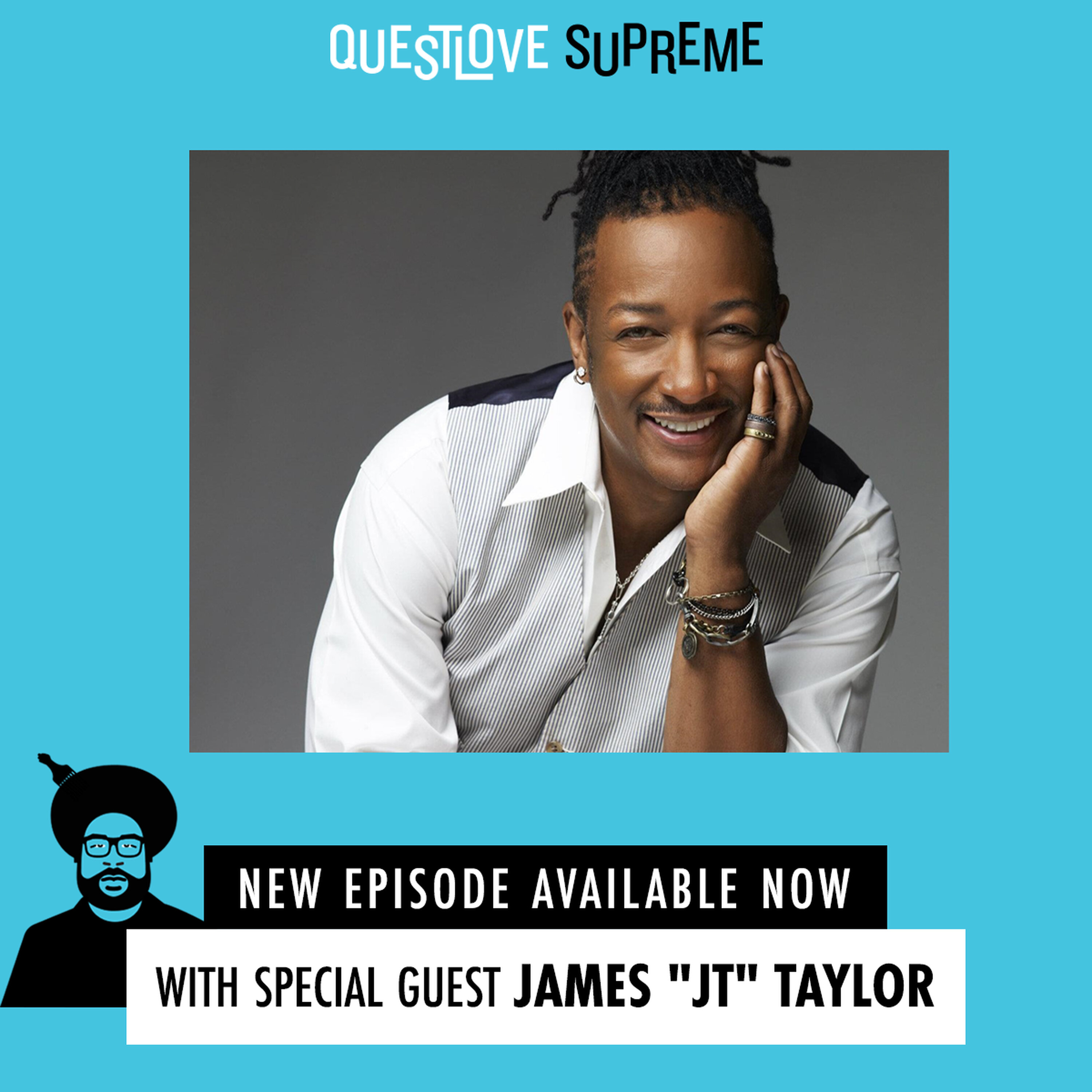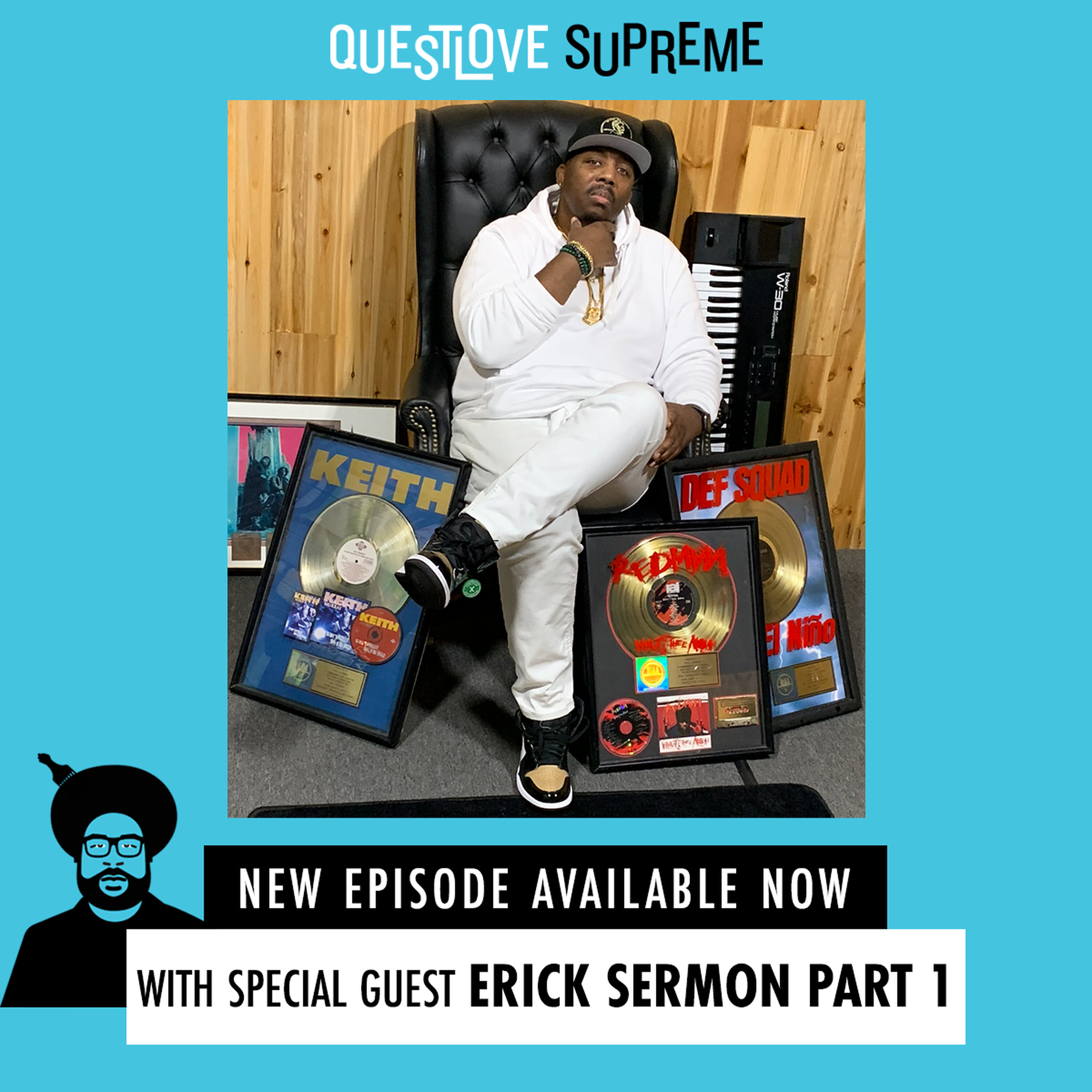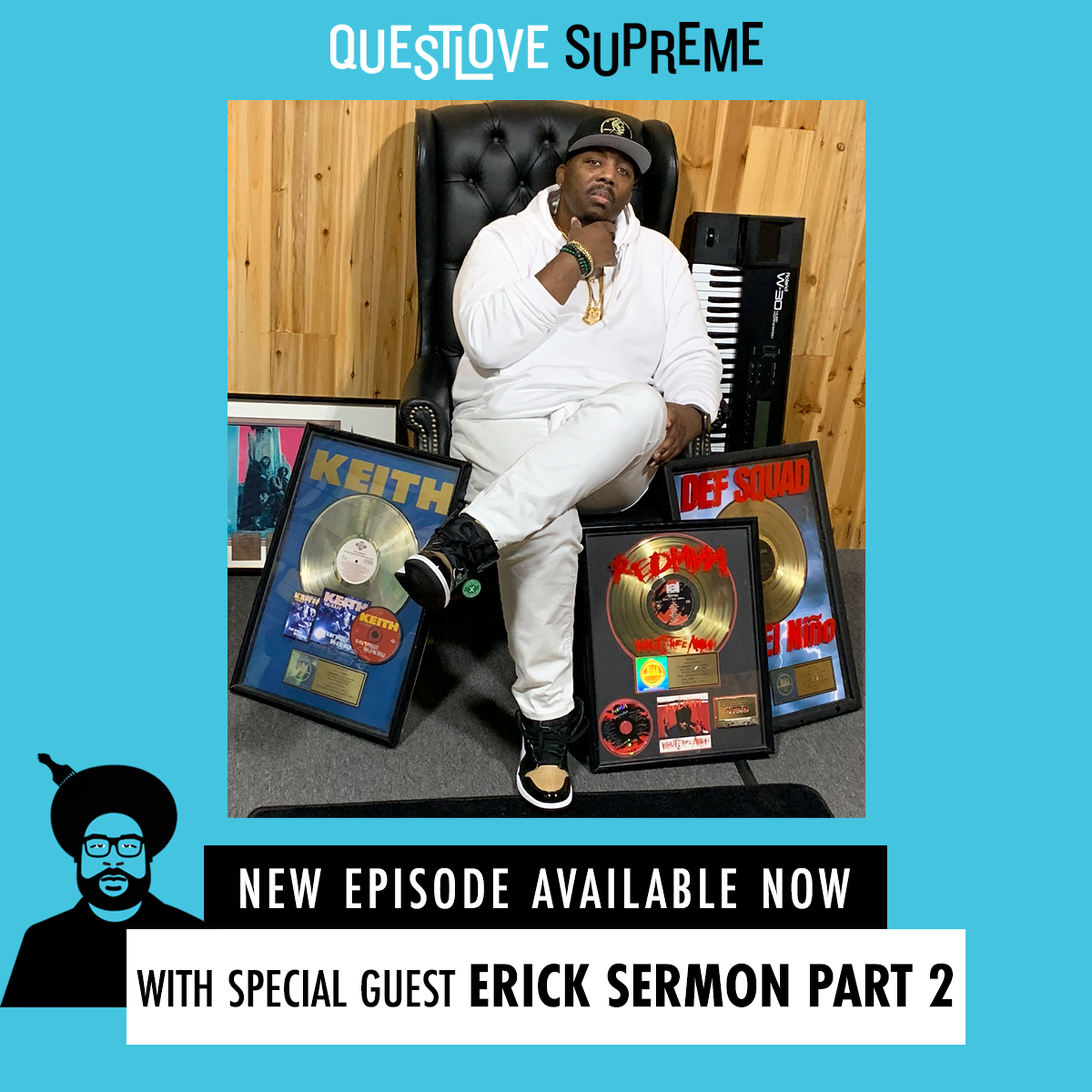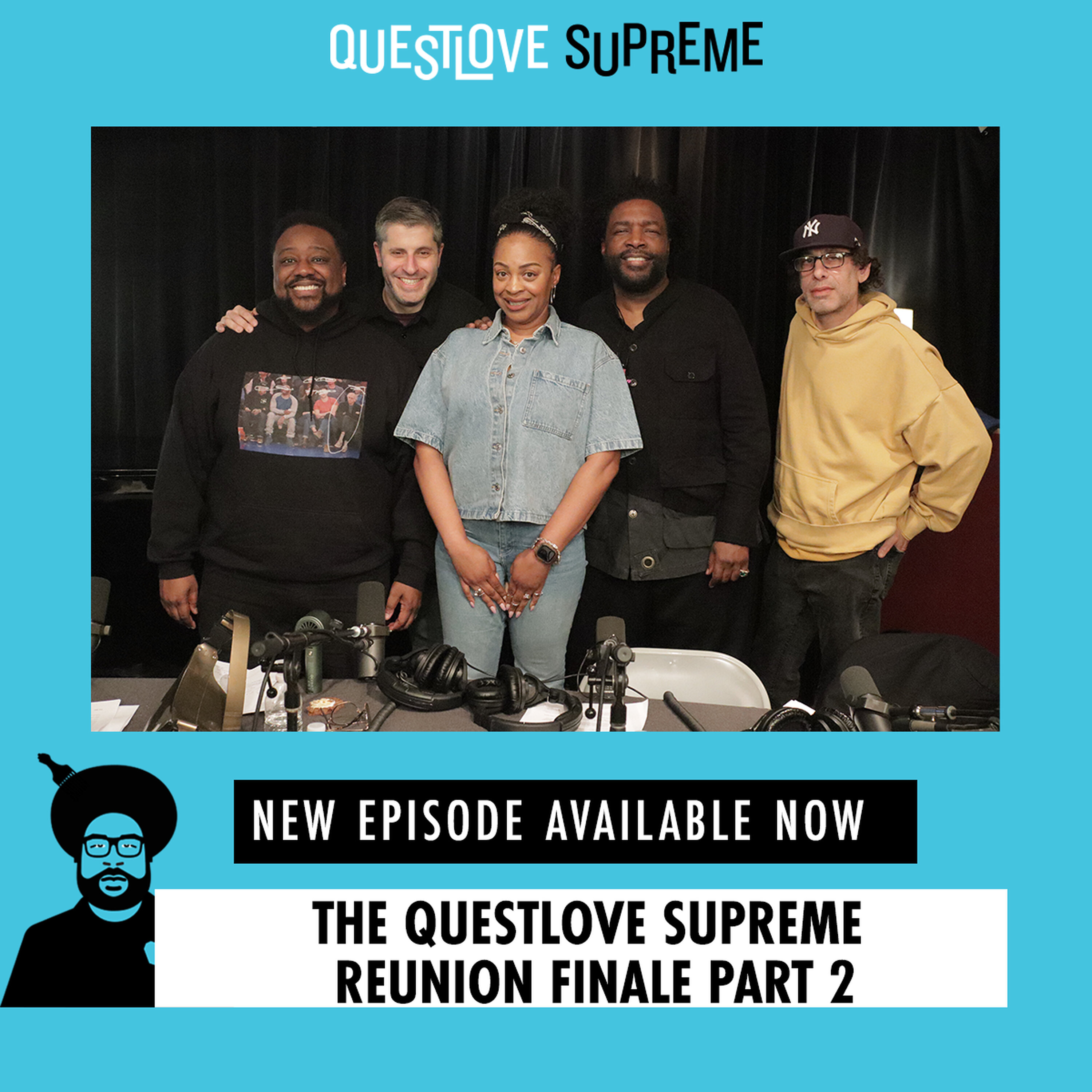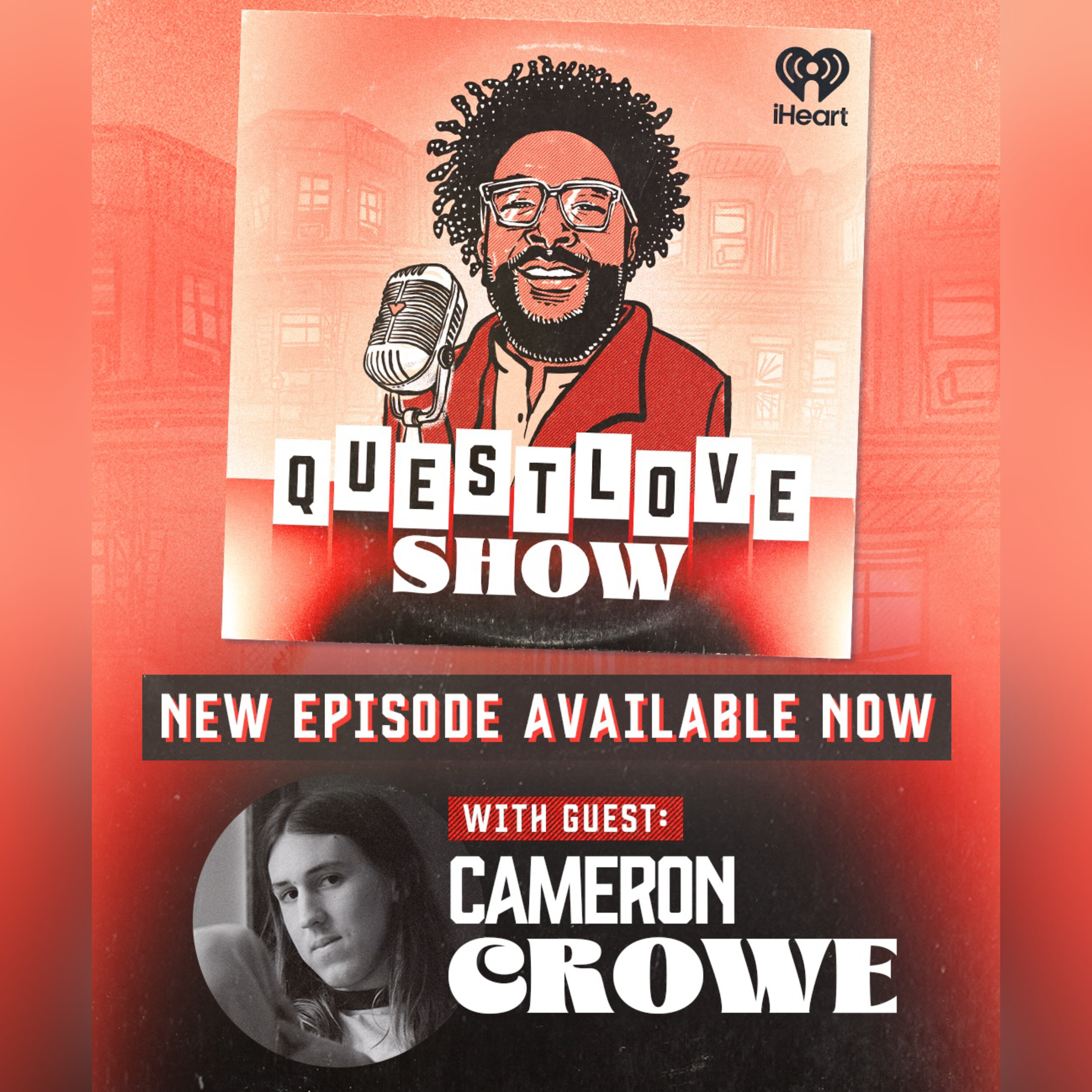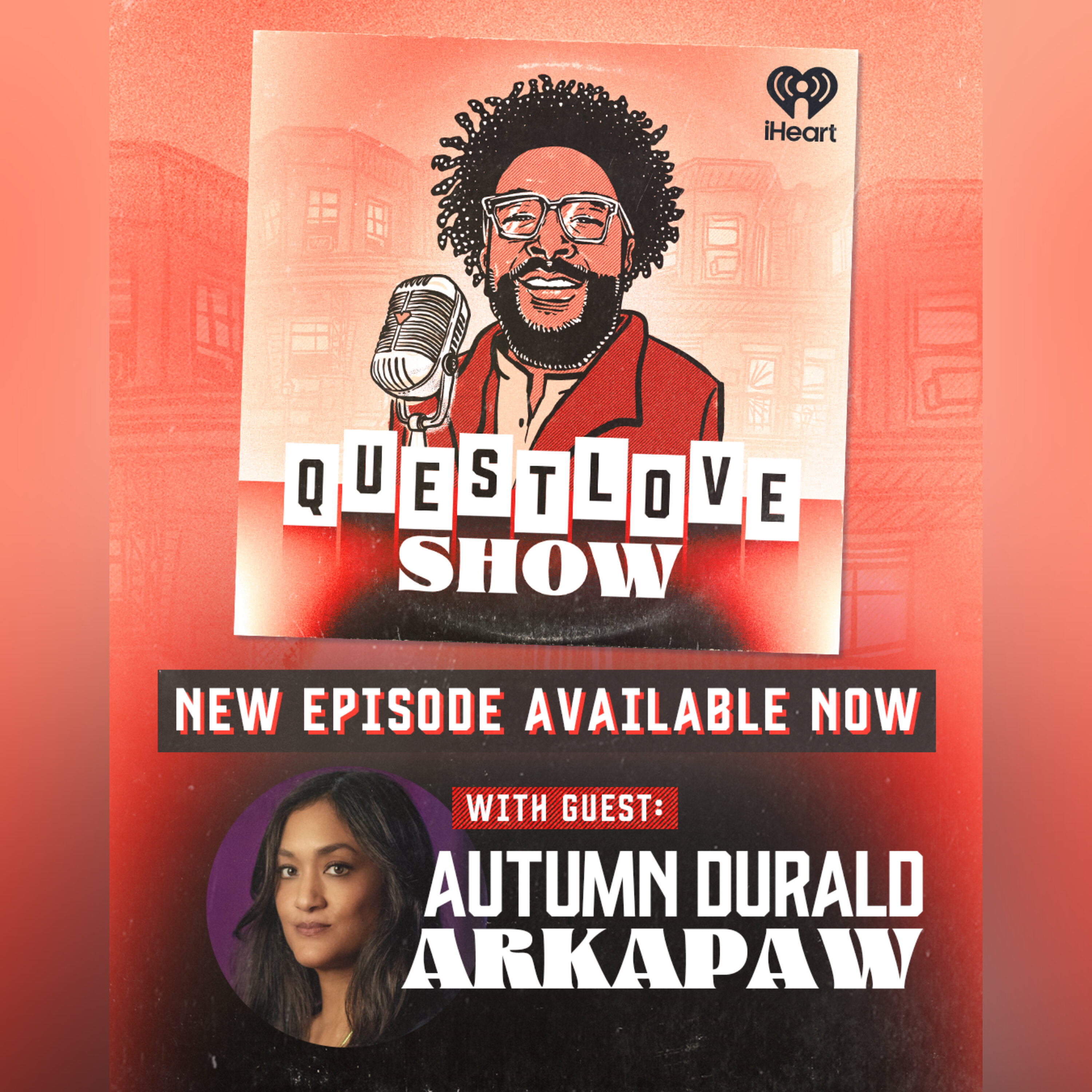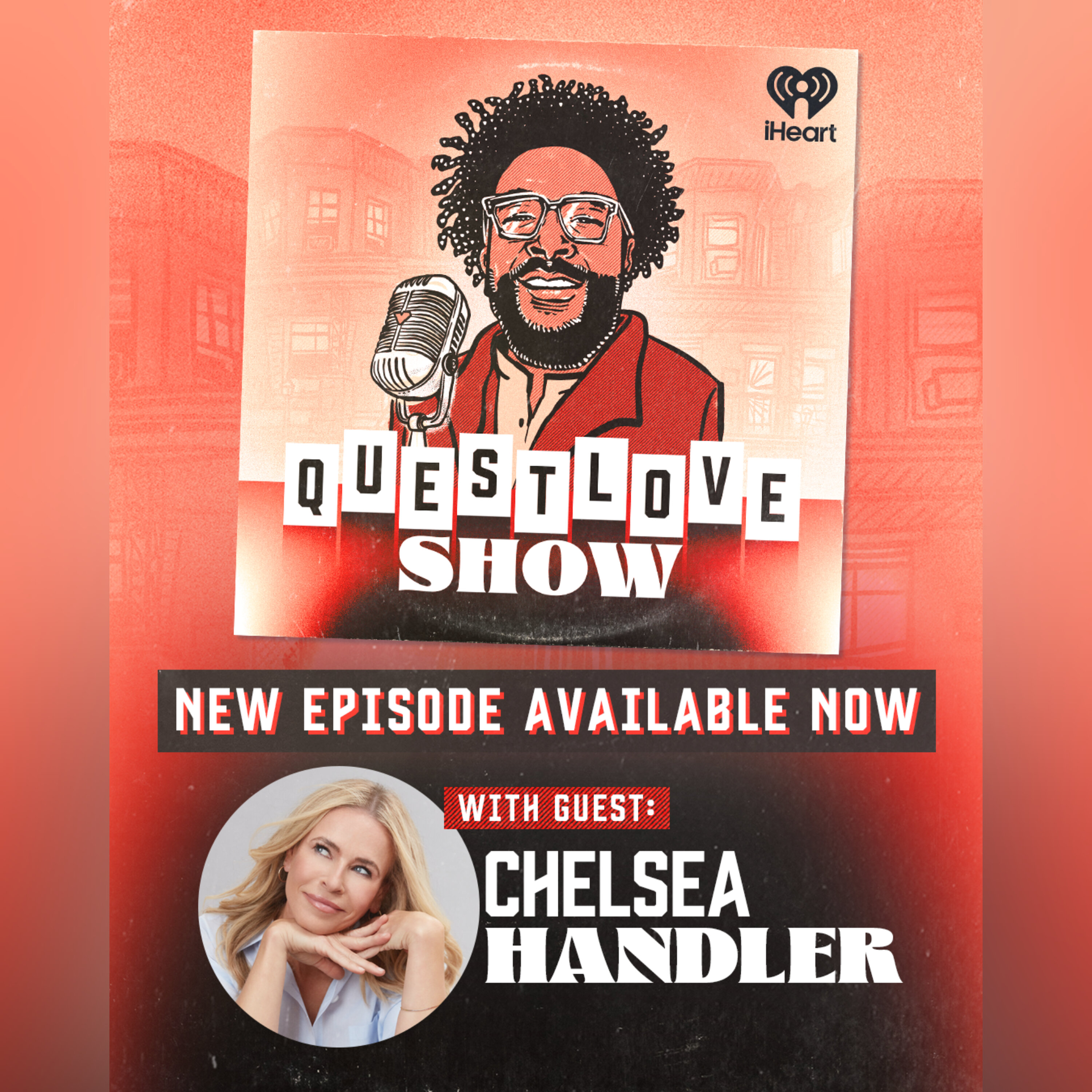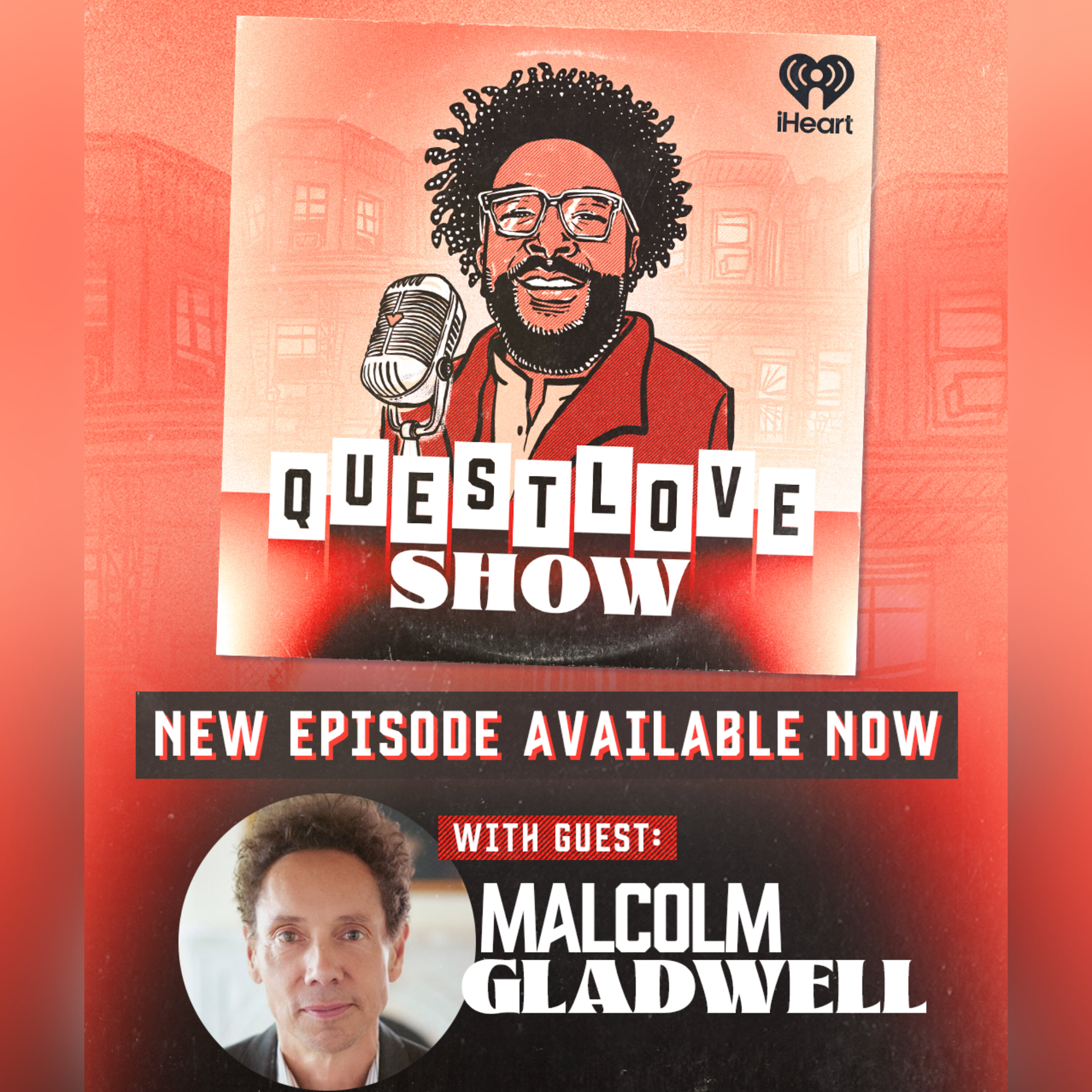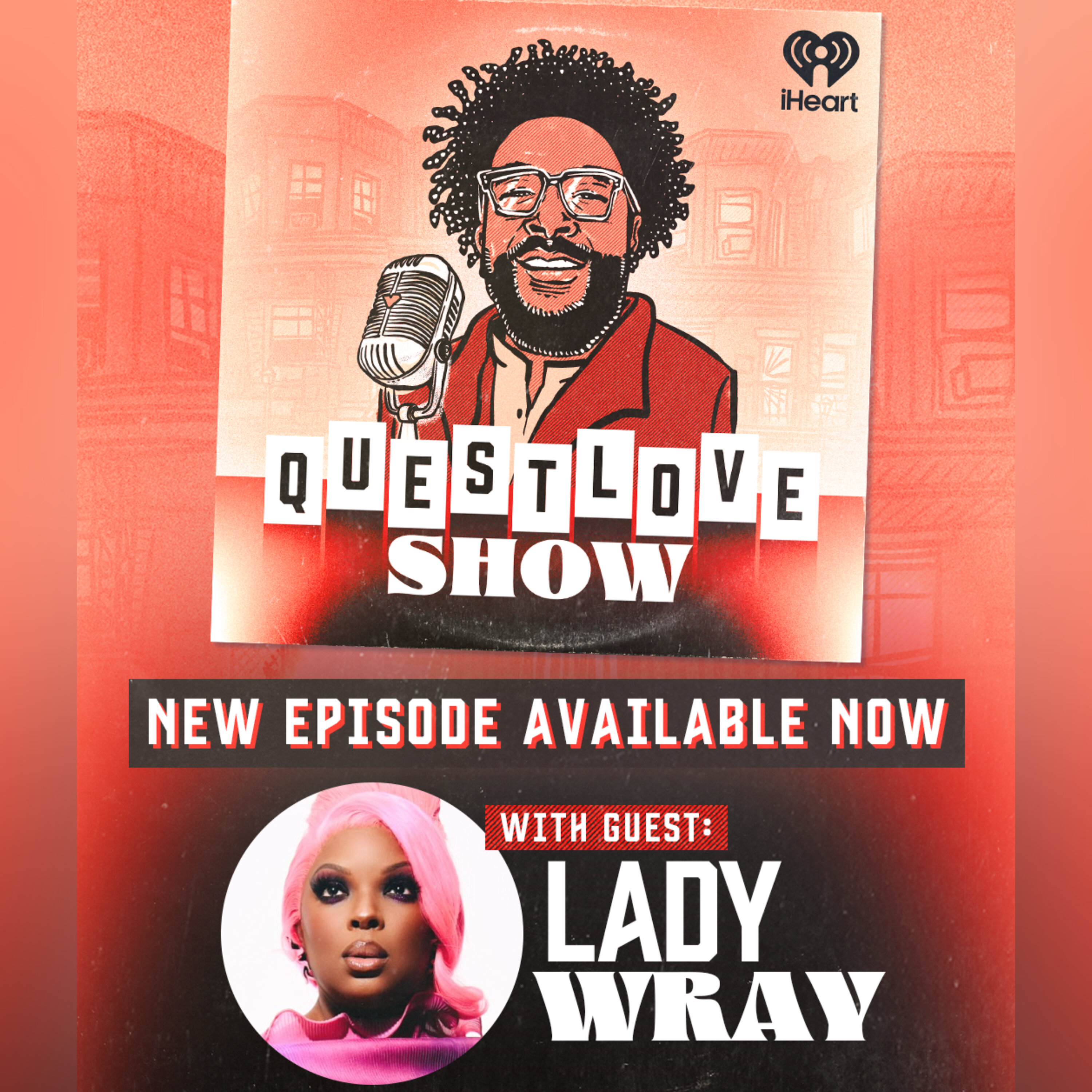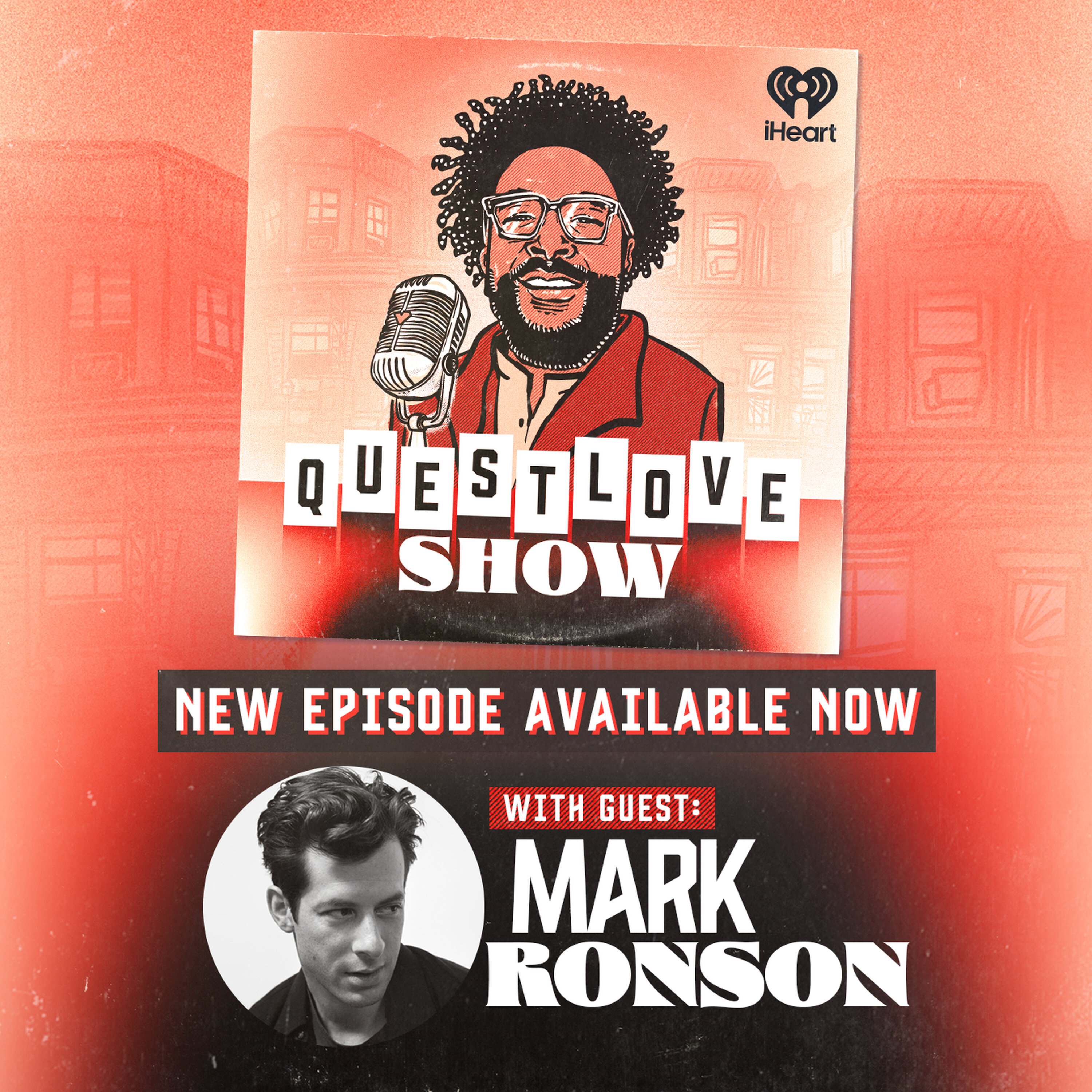Corinne Bailey Rae
This Questlove Supreme interview defies the typical order of things. Questlove and Team Supreme ask Corinne Bailey Rae about the inspiration, iconography, and real-life events that inspired her refreshing and recent Black Rainbows concept album. Then, the conversation heads backward through the Grammy Award-winning singer-songwriter's discography, dynamic musical journey, and Leeds upbringing.
00:00:00
Speaker 1: Quest Love Supreme is a production of iHeartRadio. Ladies and gentlemen, Welcome to another episode of Quetch Love Supreme. I'm you know, it's course love and with three of course is the ever present Team Supreme. Uh, frantically, what's happening.
00:00:23
Speaker 2: What's happening, what's happening, what's happening?
00:00:24
Speaker 1: Yeah, I was about to say, you gotta tell me what's the after effect of the Little Brother documentary?
00:00:32
Speaker 2: Uh, it's been a lot, man.
00:00:34
Speaker 3: I think the first week it came out, like when we first put it out during the uh during Black Friday, I had one my homie hit me and was like, Yo, man, I haven't talked to my sister in three years, and I'm gonna give her a call after watching this. So it's been it's been stuff like that. Like it hasn't even been a lot of music shit. It's been people just been hitting me, just talking about personal shit, personal shit like yo, ill my man's like yo, I'm about to start my own business now being bullshit and this.
00:01:03
Speaker 2: You know, it's been a lot.
00:01:04
Speaker 3: So it's been opened up a lot of conversations that uh, I think we're Yeah, it was it was kind of overwhelming. At first, just to kind of be getting all that at one time, you know what I mean. But uh, but people really enjoyed it, and they see the spirit of what we made and you know, the love and care what we made it, and so I'm just happy that people enjoying it.
00:01:23
Speaker 2: Man.
00:01:23
Speaker 1: Yeah, I was going to say that we're kind of at the the end of the stretch, like where we must turn the record in somewhere, and it's sort of like kind of after watching the documentary, I was like, hey, do we have to give this to a major label?
00:01:43
Speaker 2: Like come on, come on, come on, come on.
00:01:48
Speaker 1: He preaches this forever. I was going to say that we're seriously trying to. I think we're considering, you know, taking the training wheels off and see if we can do this for depth. I mean, technically, yes, we owe def jam another record, but it's also like it's been ten years and there's a whole nother ministration there, so you know, it's not like I think they're crying, like damn it. Yeah. When we were last there working on How I Got Over, there was an executive in the studio with us, and he was talking shit about us, thinking that Tarik was like one of the staff at Electric Ladies Studios. I don't know what they look like. I don't know the album, just fucking hearing Ship Manek's like, Yo, I'm in this studio with you. He oh, I'm sorry. I thought. Oh damn, I thought he worked here.
00:02:41
Speaker 2: So y'all institution, man, I love to see it. That'll be dope.
00:02:46
Speaker 1: Yeah, so I'll say that you definitely planned to see in that to see if we can do this on our own bill. What's up man? All of our lives?
00:02:56
Speaker 4: Like, I'm great. I was just thinking about what I learned from the Little Brother documentary is do whatever the fuck you want and be.
00:03:04
Speaker 1: Really good at it.
00:03:05
Speaker 4: Like that's the best piece of advice, Like, don't succume to anybody else's wants. Just do you and be true to your art, like no Ship and I. We all make art here, but like to be that true to it and like honest about it is really cool. And that's what I learned, amongst other things about other certain people. That's what I learned from the Little Brother documentary.
00:03:24
Speaker 1: I loved it. I would love to say that you're like your JMI Jazz recording offices, Steve, but that's how that's how official it looks right now. So I don't know what's going on. Like you got your own merch now your own bags.
00:03:40
Speaker 2: Like, oh you saw that.
00:03:41
Speaker 5: Yeah, we're doing well JMI Recordings dot com. Yeah, little jazz label here, and Yo, Steve, I want to tell you.
00:03:49
Speaker 3: Too, Bro, I bought I finally broke down and bought a turntable and I listened to like all like the records that you've given, Bro, they sound amazing, man, like amazing, Like they sound great on vinyl. So now y'all are doing a great job. Bro, this ship is the shit is dope. The record sole really great.
00:04:06
Speaker 5: Thank you so much. I'll send you I'll fill you in on what you don't have.
00:04:11
Speaker 2: Yeah, yeah, for sure. I mean cops, I mean the link.
00:04:13
Speaker 6: You know.
00:04:14
Speaker 2: It takes money.
00:04:14
Speaker 4: He makes, he makes house calls. He came to Hoboken and delivered me records. That happens, Damn I have to ask.
00:04:21
Speaker 1: Damn. Meanwhile, Steve, I live in the same building. I find myself stealing my own product anyway, So let's get to it. I will say I love a good transformation story, the artistic metamorphosis or what we call uh departure albums. I've even taught about departure albums at NY you were a few semesters for those not hip to the term. You know, departure album is basically like the one album you can and that doesn't sound like what you represented when you first came in the door. I mean there's there's some legiti metamorphosis, like artists like and grow eventually. I guess the most famous departure album would be right going on? Well, no, I was going to say Sergeant Pepper's was the very first one, because the Beatles wanted to kill the Beatles or the idea of the mop tops and teeny boppers and never tour again, and then that backfired and actually made them more famous and then caused them to implode. But even that was inspired by a departure record, which I guess you could say pet Sounds by the Beach Boys as that, But I mean there's millions of them.
00:05:29
Speaker 2: There's Thinker Life of Plants.
00:05:31
Speaker 1: Yeah, Secret Life of Plants, right going on? Kid A Grace land Light, Yeah, oh Rave Light, Uh huh? Actually was she trend hop? It was that? Really?
00:05:45
Speaker 2: You know, it was it was a departure from what came before. I'll say that.
00:05:49
Speaker 1: Right right, she wasn't popped. Okay, you're right, but I mean, well, awaken my love, Ata waits and heartbreaks for hip hop, Paul's benef there you go, yeah, bitch brewe dirty mind. So it's all there.
00:06:02
Speaker 2: Did the roots of a departure album?
00:06:04
Speaker 1: What phrenology or something? It's hard to say. I mean, phrenology wasn't more an excuse to do something different than I realized, Like how slow I was listening to The Roots Come Alive and like shit was like slow, but also doing the Roots Come Alive? Like I was at my physical heaviest at like four hundred plus pounds, and I had lost weight for Phrenology, and suddenly I felt like I wanted to be more energetic. So and then it became like, let's just do what we're not supposed to do. So it's sort of a departure record. But time will tell if I was just you know, not willing to face the keep the things fall apart thing alive? I don't know, but I will say that our Guest Today has been a long time favorite of mine since her two thousand and six debut, and shortly there after I was fortunate enough to I guess. A year later work on work with her on Al Green's Laid Down album, and then a year after that we worked on her sophomore album, to See, And you know, I kind of thought I had her completely figure it out, and nothing prepared me for her fourth record. I'll just say that that much quick backstory. I guess, our guest and I reconnected in the summer of twenty twenty three. She give me a copy of the record. She did it so casually that two days went by before I remember that, OHI the record, let me peep and see what's up, And you know, it was kind of gobsmack. And again, I'm trying to avoid typical questlove hyper bowl when it comes to my excitement for something. But you know, it's been a minute that I've listened to a complete album on repeat over again by an artist not named Salt, and I will to say that there's a lot to unpack here. Normally I want to go through the whole, you know, journey of an artist's life, but I'm so obsessed with this record. I have so many questions. I might have to do this interview backwards. But yeah, for me, Black Rainbows is one of my favorite records of the year, and I'm really really excited to have a conversation with our guest today, Grinn Belly Ray One Quest Love Supreme.
00:08:23
Speaker 6: Welcome, Heydan, Thanks so much. Thanks for that introduction.
00:08:26
Speaker 1: Wait let me see. Oh god, okay, twelve minutes. We're not bad. Normally I don't even get to the guest until twenty seven minutes. All right, and it's time to go. Thank you very much, Karin, Thank you. So right now you are in You're in Connecticut right now?
00:08:45
Speaker 6: Correct, right now, I'm in New York, so I may or may not be getting up to Connecticut today. It depends as loads of snow on the road. So I always try and make a show like I'm happy to be there, and if only twenty people come, then we're still going to have a good time. But we'll see what the he says. I hate cancel shows. It's so disappointing, you know. I hate to be a fan and have a council show. And I've been to so many shows where nobody else could make it. You know, then you feel like you're the lucky one hundred people who brave the storm or whatever. So yeah, hopefully we'll be.
00:09:16
Speaker 1: Up there and when someone cancels on you, okay, let me get out my feelings anyway. Yeah, I hate when artists cancel on people. Well, first of all, I'm curious for this particular tour, how many musicians are you with because this album is so sprawling in terms of its I mean, you literally cover every damn near every genre of music. And you know, my obsession with it was how is she going to pull this off live? What is the makeup of the band that you're with on tour?
00:09:51
Speaker 6: The lineup, there's just six of us in the band. So there is Melanie Charles who's singing and she's playing flute and she's playing percushion, and I'm singing and playing guitar, electric guitar and some percussion stuff. Aaron Barnette is playing tenor saxophone. Kyle Bolden is playing electric guitar, who I absolutely love. I've wanted to work with him for a long time. He plays with Stevie Wonder and we're lucky that Stevie's in the studio right now, so it's like entice Kyle. So yeah, so's he's kind of like three people, you know, he plays just one guitar. He showed me his guitar the other day. It folds in half and packs in a backpack, you know, like some guitars. Really it has to be this and it has to be this wood that's maple and cherry and seasoned. And he's just like it folds and half, he puts it in his backpack. He's playing one guitar through the whole show the string you know, it falls forward and the strings everything. It's a portable guitar that it's playing right now and he can cover. He's playing like wailing electric guitar. He's playing like really pretty Curtis Mayfield, and he just does it all. It's just in the spring, you know. So he's amazing. And then I'm playing with Stephen Brown. He's my long time collaborator and he has a massive setup. So he has a few keyboards. He's playing bass sometimes with the with organ pedals that he has underneath the underneath the keyboards, he's playing based with his feet a lot of times, or sometimes he's playing synth bas sometimes he's playing electric bass. Look on New York Transit Queen. He gets up from the keyboards and he has a whole row on top of we've taken spring tanks, and we've taken headles, we've taken modular synths, so everything that he's doing on stage sort of all of the sends from stage are going into that rig so that he can affect it in real time, so that he can, you know, if we're singing and we wanted to get like trippy and transcendent, he can put in his delays and reverbs and backwards things and octavizers and then that's going out to front of house. So yeah, we just we just put it all on a plane yesterday. I think are over oversize or whatever. You know, we have to pay over it. She was like like, what, we can't leave any of this shit behind. You know, it's just like boxes and boxes and stuff. But it's worth it because I like to be able to make this six more expensive sound.
00:12:09
Speaker 1: Yeah. You know, I'm also known for completely wild outtakes, and of which I don't want to get canceled, so I'll I'll say the majority of them behind, but I will say the safest one of my wild outtakes was I think maybe this was ideally the album I thought I was making with Electric Circus, where you know, where you want to show a wide range of styles but not appear to be too you know, over eager or enthusiastic with it, like it just sounds natural. And then you know, by the third listen, I realized that like you're literally covering you're covering so much territory. Like you go from literally from this, uh you know, some shit goes completely hardcore to you know, then you go after futurists, Then you do this nineties Riot Girls throwback thing, and then like with the last song before the Throne, like it's almost like like you transport it back to an Alice Coltrane kind of outtake, and the thing one is like I was hoping the song was gonna be seventeen minutes like an Alice Coltrane song, and then it cuts off and I'm like, what the fuck?
00:13:33
Speaker 3: But that was one of my favorite ones on the album too. That's a hard ass. That's a hard that it flows the album.
00:13:37
Speaker 1: That Yeah, it's goddamn and it's can you tell me, just from soup to nuts how you put it together? Because in my mind it's so every song is so unique. I think if making it in real time, I wouldn't know how you had seen it as cohesive, but yet together it feels cohesive. Can can you just describe to us the process.
00:14:00
Speaker 6: I'm glad that it feels like one thing, and it felt like one thing to me because it was all driven by this obsession, and it was driven by this subsession with this building. I had been on a friend's board. It was like a it was a Pinterest board that she had she called Jamala John's and she's kind of a arc curator. I think in the early days of Pinterest, it wasn't just like this is a cute hairstyle, but some people were using it like a magazine, you know. So there they were using they would put up a picture and then they were just right tons and tons. And she had this board called Artists and their Creatives and their workplaces. So she had Carra Walker arranging her silhouettes. She had a Picasso painting with light, and she had this photograph of this artist, this black artist, contemporary artist, this man, and he was sort of staring out of the frame with this peacefuls of bold expression and behind him was this weird contemporary art that I didn't understand, you know, A pile of bricks on the floor, this shaggy goat. Instead of legs, it had the spindles and it was going around on a circular track. And then there was a big shop for a big sign for a shop, Harold's Chicken Shop in Chicago, with like a chef chasing after a chicken with a meat cleaver, and he was just looking out like he was represented by white Cuban. He was looking at the frame like, yeah, this is my art, you know. And I thought, who is this? I don't know contemporary art. Who's this man specifically, who's this black man who's not working in figurative art?
00:15:26
Speaker 2: Right?
00:15:26
Speaker 6: It's not paintings of people, it's not drawings of people, it's not photographs. It's this stuff. And I found out he was called theaster Gates. And then when I did some research, I found out that part of his practice is saving these buildings on the South side of Chicago. You know, he lives in the South side of Chicago. He's watched many buildings just get torn down by the city, you know, on the Stoney Island where this building is used to have big theaters, you know, really important theaters for black music, and just over the years have been torn down, one by one, so I mean Chicago's architectural masterpieces. But then when you get to the south side, there's these holes, dise these gaps, and it's a kind of erasure of the history of the place and of the presence, the black presence in the place. And so he saw this bank. It's one hundred year old bank and had been slated for demolition for a long time. It's going to be pulled down by the city. The basement was underwater, but it's this beautiful bank with these columns outside, and it's like a big square, sort of Greeco Roman building on Stoney Island. And he decided he was going to save it, and so he bought it for one dollar from the government, and he saved four million dollars by selling his own art to transform this bank. So it doesn't have art in anymore, it doesn't have any money in. He's saved it by filling it with art archives and historical archives. So it has twenty six thousand books that were given to the Johnson Publishing Company, to the Johnson Publishing Company who made Ebony magazine, Jet magazine, the Egro Digest. So from nineteen forty three, you know, if you wrote a book in anything to do with black space, architecture, politics, dance, entertainment, recipe books, yearbooks. If you wrote PhDs and you wanted the Johnsons to review it and include it in their publication, you would send it to the Johnson's. So twenty six thousand of these books, you know, some of them we know and the familiar, some of them super rare books. It's got those. It's got all of Frankie Knuckles records. And when Frankie Nuckles passed away, his entire record collection was given to the Stony Island Arts Bank, and it also has upstairs on the second floor, these problematic objects from America's past, the Mammy jars, the postcards depicting racial violence, newspaper articles since the eighteen hundreds, advertising copy, signage, objects for the home, photographs that were collected by this Black and Chinese banker called Ed Williams, who would go to these yard sales and flea markets and see these objects and think, you know who wants who's collecting these things? Who wants to continue to have these things in the home. So he would buy them to take them out of circulation and put them in boxes in his house and Once he had amassed forty thousand of these objects, his kids were out, can we get it's kind of intense to be around this stuff. Can we get this out? So he gave that he donated it to the Rebuilt Foundation. So the Arts Bank is contemporary art on the walls, it has exhibitions. Then it's these historic objects, the Frankie Knuckles, it's all the slides from the University of Chicago, the glass slides from when people give talk, so you know, or all of history that had been photographed for the University of Chicago. And then these twenty six thousand books. So when I saw the work that THEASTA was doing, I thought, I want to get in that bank. I just want to be there. I just want to look around. I want to And we managed to connect with him. I was on tour, he came to the show. He met up with me afterwards, and I was just like, Ah, I'm so excited to meet you. Because you're a visual artist, because you also have a band called the Black Months of Mississippi, because you're a saramacist, which I love ceramics, because he trained in Japan, and because he's collecting these objects, and because he's saving all these buildings in the South side of Chicago. He has a social practice. I just I was really excited to meet him, and I said, I really wish i'd come to the bank, but I'm leaving town at like eight am tomorrow morning. And he said, I'm also leaving town tomorrow because I'm going to President Obama's fiftieth birthday party. And I was like, Oh, okay, this is this is this guy is. So we opened the bank early for us and I went to it and once I opened those doors, I've just sort of blown away by the building, the side of the building, the library, the double height yoube, the just the amount of you know, every single drawer you opened it just like songs from slavery times, newspapers, curling newspapers from eighteen forties, print adverts from the thirties, tins of beauty products, you know, just stuff and stuff and every corner and every just the arrangement of it. And the ASTA said, oh, you know you have to you have to do a show in it, And straight away I sort of flashed on the music that I had made to this point and felt like this is a new vessel. Nothing that I have made sort of fits in this space. It's a different kind of response that's needed. But then when I left, all I could think about was the things that I had seen. You know, he had this sculpture in the corner, and I said, oh, who did that? He said, it's one of mine. And it looked like it had been made from wood that had maybe had the paint stripped off. There was a certain amount of violence to it. And I said, oh, you know, what is it? And he said, it's a sculpture I made. It's from the floorboards from an abandoned police station in Chicago. And as soon as he said that, I immediately was thinking about the floorboards. What are the floorboards seen? You know, so often in history the objects are the witnesses to what's happened. They're the things that can't speak, but they're the things that see everything. The floor in the police station, the telephone in the police station, the car, the rearview mirror. They are the things that really are holding the truth. And so when I was on tour, you know, I mean, my head was in the tour, but at the same time, I'd be lying on my tour bos bed and I'd be just writing poems about things that I've seen. You know, I wrote this poem called you who have walked These floors in fear. I was thinking about this floorboard. It was after the death of Sandra Bland, So I was thinking about, you know, who knows truth? In some cases it's a person. In some cases that person is unwilling to to to express what has really happened in the situation. But all that not all the physical objects they know. And I just thought, I want to get back to that bank. I want to open murderers. I want to touch more stuff. And every time I touched something, I felt like it was it's old stuff, but it's fisiing with a kind of contemporary, real life things happening in the Molecule's story. So really with the writing of the record, you know, I went back for a two week residency. Was stayed in the South Side of Chicago. I mean, I'm from the UK, but you guys know Chicago, Chicago has its huge challenges, you know. Yeah, so so that was an eye opener. You know, we didn't have a car there, and we said, oh, we'll just you know, we're staying so nearby, we'll just walk around. They're like, oh, no, you can't walk around. You can't walk around, you know. So we walked to the place where we hide the car, and on a bus shelter there was an advert for for what you could do if you wanted to needed to give up your child in the first thirty days of it life, you know, it was a list of things. It said, all you need to do is wrap it in a clean towel. It has to be in the first thirty days of its life. You could take it to a fire station where you could drop it at this particular school or that particular hospital. You can give information or you can have no questions asked. And it was particularly poignant that it was a bushshelter because of course that's where so many children that couldn't be looked after have been left by parents that couldn't look after the children. So, you know, just sort of walking, I thought, this is what this area, this is what this area is. And I thought about the importance of a building like this which talks about the history of the area and just about the history of the people and how the situation is as it is now and it hasn't always been the way it is, and it won't always be the way it is. But how art is a place of it's a new space, it's a physical space. It's a place where people have the opportunity to imagine something different. So I was ever two weeks. I wrote some songs there, I was, I was home, I was back and forth. I mean, this record was sort of seven years coming together, you know. So sometimes I was making music in the place we set up a studio and one of the buildings next the bank, and all the songs on the record are inspired inspired by particular objects in the bank, or groups of objects or events in the bank. And that to me wasn't my sort of golden thread when I was making it. And then to me, whatever the style was, it didn't matter. It just whatever the music was, it just kind of bounced off the objects. So it's all about the objects, and that the tight remit was it has to be in response to these objects. And it just became my obsession. I felt like everywhere I looked there was a story or a photo or something about Chicago, something about the South Side.
00:24:57
Speaker 1: What comes to you first? Do the words come first or does the music come first? Because there's some songs in which he will follow me with his eyes, which like specifically melodically and your words are depending on whatever chords being played. And it's not a circular song that it's looping. It's just kind of gone linear into and it wors into a whole nother song by the end of it. So like what comes first for you? Like are the words hitting you first and then you find music to it? Or does the music come first?
00:25:30
Speaker 6: I think in that situation, and he will follow you with his eyes. I had found this tin of a beauty product. It was by this company called Valmar and it was set up in Chicago in nineteen twenty six. And all the illustrations I found to be really beautiful, really elegant, and they were done by this artist, this black artist called Charles Dawson who came who was a very well known artist in his time, and they were elegant and they were beautiful. And there was also all this romance surrounding Valmore. You know the copy in the adverts. So if you saw an advert for valve Or it might see things like his eyes will follow you across the room, or the perfume. The perfumes were called things like follow me boy, or look me over everything had this romance and this glamour. So I was kind of interested, what's this beauty? You know, what's his company? And I found out that it was sold door to door, you know, so like Avon, they were knocking on the door with this big basket of stuff. And I found that there was targeted mostly at black men and women of course the era. Looking through the products, there's lots of perfumes, there's lots of moisturizers and shampoos and stuff. But there's a lot of hair straightening products, skin lightning products, you know, white rose cold cream, and you know, worked straight away the adverts to say things like, don't you want to help yourself to love unhappiness? You know, all of this is just away from you if you don't just take if you take your skin a few shades lighter.
00:26:59
Speaker 1: That's right, they ran at the end. Okay, yeah, I was going to say, because upon first listening, I was like, I was like, Wow, this might be her best vocal performance because and then the second time I was like, oh, maybe she's singing in a character. And then I realized by the end, I mean, I don't know if it's if it's more of an angry rent or more just a defiant thing about it. But I realized that that must be the start. I didn't know the history behind the song, but I love the way that you singing character in the beginning, And yeah.
00:27:32
Speaker 6: I wanted to get into that sort of fifty space, and I was thinking about fifties medicated domestic femininity in America. Okay, so you've got all the things you meant to need. You've got your vacuum cleaner, and you've got your washing machine, you've got your refrigerator. So as a woman, your life is not difficult anymore. You know, you've got these appliances and you shouldn't complain, and you're in the home, and if things feel difficult, there's always a touple that you can take from the doctors just to take the edge of things. And then but then, you know, imagining someone coming to your door with these products, there's a kind of femininity is already this narrow, and then for black women it's it's even more narrow because the beauty is white aligned at this point. You know, so you've got to do all the women's stuff, and then you've got to do the stuff to make your natural self augmented. To be accepted, and so in the first half of the song, the person is definitely under the spell of how more I did that. I wrote that song in the in the bank, and I just played I played it on guitar, you know, I sort of do my best of my guitar, like I'm not a trained guitar rist. But I wanted to make it sort of you know, fifties and dream like, like those kind of chords that would be in you know, those movies that start, whether the car's winding around the side of a mountain or whatever, the open top car and it's like there's a glamour and then halfway through. I wanted to have this kind of sonic arresting, you know. So when I first wrote that, that was just like me playing one string, dumb, dumb, dumb, you know, my plum red lipstick, my black hair, kinkin, my black skin, gleaming.
00:29:11
Speaker 7: You know.
00:29:11
Speaker 6: I wanted it to be, as you say, sort of defiant. You know, I don't it says at the end, I don't want to leave myself behind, vanishing into a girl I don't recognize and went after you know, because the record took me a long time. So one time I was listening to vocals, I feel like I could bring more character into this, you know.
00:29:26
Speaker 7: I was thinking of like her as a kid, you know, with her incredbled diction and poise and the movement of the words and everything so dramatic and elegant and control that I.
00:29:39
Speaker 6: Went to bring some men.
00:29:40
Speaker 1: And so in my excitement, I was making h a quiet sleep playlist the David the album came out, and so not even thinking about it, I just rushed that on the list first. It went to sleep.
00:30:00
Speaker 6: Anyway up.
00:30:01
Speaker 1: It was like, what the hell of Mira? And I was like huh. And I was like, oh, I forgot that sometimes coders and because you know, in my mind when you're listening to it, I'm thinking like, okay, might have a new ID track, and that's the next song. I didn't realize it was the same song until that person told me, like, dog, you woke us up in the middle of the night, Like, yeah, it was it wasn't there.
00:30:24
Speaker 6: It wasn't what you thought. Yeah, it's the worst record for DJs. But I just think my stuf's a bit like that anyway, sort of like it's bumpy, like you're just getting into one thing. And then there's another thing, and I don't know if that's my background. It's like I was a classically trained violinist and then I was in an indie band when I was fifteen. That was the music that I loved, you know. I had grown up with soul music, but India was like my thing that I found, you know, Rucasol and l seven and Belly and and I liked. I guess I liked, you know, women in that music. I like seeing women play guitars. And I don't know if they weren't shaving their armpits or they weren't having to wear certain things. They're just wearing T shirts and the jeans and they're just doing the thing, and there was a lot of freedom in that.
00:31:05
Speaker 1: Of course, I understand that a lot of your albums are also confessional diaries because of lost love and what you've gone through in mourning and all that stuff. But would you say that this album is more closer to your creative heart then say what your debut record was.
00:31:20
Speaker 6: Yes, I think this is really close to my creative heart. And the irony is that I thought it was always a side project. You know, when I made it, I was like it's not going to be My name's not going to be on it. It's an independent record. It's not going to be a major label.
00:31:36
Speaker 1: Weren't you. No, Mariah's sort of do you know the history of the Chick record?
00:31:44
Speaker 6: No, I mean, and not until you mentioned you mentioned it the other day, but I still, I mean, I haven't heard that record. You sent me some pictures and I thought, wow, she looks different, but yeah, I think she's amazing.
00:31:53
Speaker 1: Yeah, Mariah did the same thing, like she was this recording her real record, but just to have some fun, you would, you know, play around, fuck around, doing dinner breaks and all that stuff, and then they had enough material to make a record. But it was always just supposed to be like a joke amongst the band makes and you know, and I still maintained that that's Mariah Carry's best record because she doesn't care about the outward gaze of critics and the record label and keep keeping the machinery going, because you know, all the time artists tell me, like, especially like in the first ten years of my career, it was like, man, y'all gotta label that supports y'all. Like, and at first I was like a little insulted. He's like, yeah, man, because y'all could just do any o shit in your label, never drop y'all. Like I was like, what was that supposed to be? He's, you know, like, you know, like y'all don't care about hit singles and making money and because success.
00:32:53
Speaker 2: I'm like, what the fucker?
00:32:57
Speaker 1: I was like, No, I just don't know what an effective hook. Kids. I feel like I'm doing too much inside baseball. But you gotta let me know what was your inspiration behind Earthlings? Because I'm obsessed with the eff of futurism and all that stuff, and like I am too.
00:33:14
Speaker 6: You know, I feel my dad had Funk you know, like p Funk Records when I was little, and Parliament Records, and I'd look on the back and see these weird cartoons, you know, I like the women in the booby tops and the booty shirts and this, and there was all these stuff about space, and I remember just thinking like what is this? And definitely when I was a teenager, I just sort of thought I sort of thought of it as kind of a bit silly or escapist. And it was only when I got into my well, probably you know, ten fifteen years ago that the penny dropped, you know, and the expansive thing of if someone wants a pigeonhole as being from here, you have to be within the system of what it means to be black in America, and like Sunral, the only way to explain its actually, I'm not from here, or you think I'm from here? Do you think I'm like that? Now, I'm not even from this planet, you know. And I loved that when I went back to that music, the idea that there's another space and alternative space that lives outside of catalysm and white supremacy, and that this band is from there and they're going to take you there and all you have to do is get on board the mothership. And so the philosophy of it, which I had missed because I was too busy just sort of enjoying the groove of the music, you know, that was right there. And so I mean, there's a really good affort futuristic film showing in the bank when I was there, and you know, I was thinking trying all these things together, that the main thing was the inspiration behind that was the these different searches for utopia that I read about in the bank. You know, there was a conversation bouncing back and forwards between the black thinkers from I guess that, you know, eighteen tens onwards the classic two positions. You could call it a Martin Luther King versus early Malcolm X, you know, integrationist versus separatist position. You know, we find ourselves to be here outside of Africa, in this country, in these places which are intolerant of us. What do we do? Do we find allies and make a new community. Do we become part of everyone, we all each other's brothers and sisters like a Martin Luther King position? Or is there do we recognize the aggression and turn inwards and turn away from the place where we find ourselves to be. And whether it's a Marcus Garvey going back to Africa, or whether it's a more of a spiritual separatist community where you're still in America, but you have your own commune and you have your own rules and laws, or whether it's a community of that's exclusive in terms of who you're socialized with.
00:36:01
Speaker 2: You know.
00:36:01
Speaker 6: So I would see these ideas going back and forth in the bank all the way through history, people trying to work it out how do we live now outside of Africa, in this place which is not entirely welcoming. And so I've thought a lot about these utopias that have been attempted. You know that all black towns of the West, and those of them that were successful, and those of those that weren't successful or were like a green Wood that was eventually firebombed, you know, the first incidence of fire bombing on American soil. So I thought about those, like, what is it to yearn for utopia? Try for perfection? It always will fail, And yet that's the direction, that's what all communities are looking for. Peace, love, freedom. And I was blown away by Missus Johnson using the Ebony fashion fair, and the Black panthers would say to her, why are you bringing it clothes? You know this is a bourgeoise thing. You're bringing clothes from France to put on the back of black models to parade around the town halls and the city halls for local black maids to see. Like what you're doing. Apart from the fact they were raising millions of dollars for the historical black universities and colleges. Missus Johnson was saying, it's important for people to see themselves reflected on this cat walk. It's important for women to see this elegance, see this dream, see this art, see this creativity. It's like, what do we want on the other side of the struggle? Struggles meant to end at some point, and then you're meant to be, you know, eating pineapple in the sun, digging your garden to live and finding work, but also time to enjoy yourself. You know, that's the world we're trying to build. We're not constantly so much in a struggle that we're imagining will never end. And so I guess the song Earth Things is about a non human person sort of looking in on us and seeing how easy it would be to reset our world, which causes a super naive position. But that was the position that I took from looking at these attempts at utopious of the effort, the attempt, the hope, the audacity of it is the only place to start.
00:38:09
Speaker 1: Or I'm curious to how the outside of America, like the British press, has received this record. And you know, I think it's really curious that you and interesting that you chose Chicago as your base creative hub. You know, I think if anything even Americans and myself I might be guilty of this as well. Like there's so much propaganda talk about Chicago, like right now, you know, the hashtag what about Chicago is a kind of go to right wing yeah term of you know, they're so violent and uncultured over there that most people I know are definitely afraid to even visit Chicago just because of what they heard, you know, propaganda wise. But is there not any place in the UK that has their own rich cultural stories that you could have pulled from? Because I find it very interesting that that you had to come, you know, five thousand miles across the Pound, you know, to find this wealth of inspiration.
00:39:19
Speaker 6: I think it's a really good point. I think the holders of archive is a really interesting thing in America versus the UK. So I'd say American history and archive seems to be I mean, you have obviously the Smithsonian, which is a reasonably new museum that holds all this black history and archive. But it seems like a lot of black archive in this country is held by private individuals or private foundations that have come from corporations. America is still in its move of you know, you've got the Mellon Foundation. You've got the Ford Foundation, organizations that made lots of wealth through capitalism that are now sort of giving back, and it shows their brains and it sort of legitimizes them to a certain extent, and they it shows that they are invested in people's history and holding history. I think in the UK that period certainly happened during the Industrial Revolution, where we had massively wealthy industrialists in the eighteen thirties, eighteen forties, eighteen fifties, and they then invested in people in our you know, they made their own towns, they had fair comparatively fair places and safe places for workers. But then the state took over in looking after history and archive, which is probably the right place for these things if the state is interested. But at the moment the conservative government that we have now, which is more of a right wing government, there just hasn't been the investment in black stories and black archives. So there are black archives that aren't open to the public and that you would need maybe a research a qualification or sort of invitation to go and look at. But also so much of the work is not valued or lost or it's lost. I mean, I think specifically of the wind Rush incident that happened a few years ago where people like my dad's generation. The black people in England are either from Africa and have come in the last ten twenty thirty forty years, or their Caribbeans, and they were invited by the government after the Second World War because so many men had died, so the UK needed people on the trains, people on the buses, they needed women in the hospitals as nurses, so an invitation went out to the colonies, you know, they're still owned by Britain, like Saint KITT's where my dad's from, you know, please come and help the motherland. And these people felt like England was their home. You know, my dad knew more about the counties and rivers of England, you know then he even knew about Saint Kitts. It was taught. This information was taught in tandem. So the Caribbeans came, and a lot of them came as children. You know, they had that passport and you would think the government's held records on who was in the country and who wasn't. But a few years ago there was this big scandal where Caribbeans were leaving their country that they'd lived in for fifty years, sixty years moved for a family wedding, trying to get back in the country, and the UK said, sorry, we don't have any record of you.
00:42:31
Speaker 2: Wow.
00:42:32
Speaker 6: And it turned out they'd just lost all these people's passports. People had come to UK's children. So you've got people who are trying to get cancer care and they say, oh, you're not registered to live here. They say, I've lived here for fifty years, I've been married here, have raised my children, I've got grandchildren in the UK. They say, sorry, you have to go back to Jamaica. So I think the UK government is not good at holding even the the citizenship and passports of these black people that they just lost. There was just no other explanation. It was just like, sorry, we last year passports. But I don't think there was even a wide public apology. So I think in terms of the Black stories, I think they live in literature. You know, I live in Leeds with people Tree Press, that's the biggest publisher of Caribbean literature outside the Caribbean, so I know these Caribbean stories. I think what I felt in encountering the bank was just this is me with my own lens and my own prejudices as a woman from the UK, as someone who has African heritage through my dad's Caribbean side, but also you know, my mum is white as well, like all these I was just arriving as myself viewing all this historical stuff. So the record is definitely not me trying to tell an American story. It's just me responding to all this stuff like this is what the stuff did to me. That's what the record is, rather than I'm now some kind of you know, historian or journalist on the American story.
00:43:58
Speaker 1: Oh no, Look, just to hear an artist with a point of view is fucking refreshing, refreshing because what we're doing with now, well, yeah, what the fuck?
00:44:20
Speaker 2: Well I want to ask you.
00:44:21
Speaker 3: You've collaborated with, uh been frequent, collaborated with very good friends, my parents and Amber Strolder.
00:44:27
Speaker 2: What is it like collaborating with them? How do y'all start seing ideas?
00:44:32
Speaker 1: What is it like?
00:44:33
Speaker 6: I got introduced to Paris and Amber through Esperanza Spaulding. I was working on my third record, and you know, speaking of record companies, my third record was the one with all the pressure on. It was like first record, big success, so grateful. My second album was a kind of response to that. You know, everybody was saying, oh, you 'sed to been an indie band, but you've made this pop soul record, and I thought, right, I'm going to play more guitar on this record. But also, you know, halfway through that record, I lost my husband and so there was this big break. And when I started again and I made the record that, you know, the label would say, You've made the record you needed to make, but it wasn't full of you know, smash hit sunshine songs. And so the third record I really felt from the label was like, okay, right, let's get back in it. You're just a sort of sleeping giant, you know, like you've got this, you've had this big hits, these and this is the record where you're going to sort of come back. And so that was really really difficult for me. And I was working one time in Los Angeles with a very very well known producer and artist who of course I won't know, and he was very busy. He was working with several artists at the same time, which sometimes people do, right, so it's like, oh, hi, thanks for coming right, let's work on this song for forty minutes and then like, yeah, if you got some ideas, you call like Jerome my assistant, right, he's going to be in the room with you. I'm going down the hall because you know, five other people are in the studio complex and I'm just like sprinkling my sort of genius hip power everywhere. So I don't know, I just I wish I had that ability to sort of perform under that kind of setup, but I just don't. So it's like the inspiration just kind of left me. And I left the session and I can't remember how So responds that will. We met up and I was like, She's like, how's it going with superstar producer that everyone else has had massive hits with? And I said, Oh, it's going terribly. You know, it makes you feel like you're you're the one that's kind of flunking, you know, they're they're the superstar and the other one. And she just said, have you met these guys? And she brought out the CD of the EP Kings King and I was like, God, I said, someone just played me this two days ago. It's so amazing. She said, I loved them. I went to school with them. You should work with them. She picks, you should work with them tonight. I'm calling them right now, you should go will go around tonight, And she picked up the phone and she's like, hey, Paris, you know with Kreine. I was like, I don't know if they I don't know if they ever heard of me, And they knew me. And we went over to the house and I just instantly loved them because aside from being the musical geniuses that they are, they just have this like still well you know them, still calm, beautiful presence. And we just sat and we just had a jam. My s friends was playing bass, Paris was playing keyboards, me and Ambo was singing, and I just thought, oh, I've sort of found a harbor here. You know, this is so different to being in the room with all these dudes, you know, like I've been told they're a songwriter, but they're just tapping out the beats, like where's your tune? Like tell me when your tracks finished, I can put my superstar beats to it. And I'd be like, haven't We're just starting from scratch. I thought, you know, I kind of naive going into those those settings. So it was just a dream to it with them. And worked together with on my third record, and then yeah, for this one, I would just drift in. So Red Red Horse came about at their place. You know, Paris is just like an amazing producer. You know what she hears and the lines and the weaves and the denseness of the production, you know, the amount of tracks and all the things that's going on, one thing feeding another and other lines, and so it's just kind of like a dream space. And we just got this beat going and Pass was playing forwards. I was playing bass since bass. I had my I remember, I had my little baby. I'd just had a baby, and she was strapped onto me and it was like playing. So it felt really kind of like it was working. You know, it's like here I am and my kids asleep and I'm doing this song. And then yeah, the Red Horse came out of that where. Because I'd read so much of the Bank and so much was in my head, I find it really easy to what came out was was the tales of the things that I'd read about, or i'd seen a photograph. I've seen this photograph of this young black girl who was going west with a white family, and I just couldn't work out what she was doing. She's ten eleven, twelve, and it turned out, I mean, she was an enslaved girl, but she was going to be the nanny for this baby. And I was sort of thinking, you know, who's looking after this child, this black child in the you know, going to this west town in the west there's been newly established, and what's going to happen to her when they don't need her anymore? And you know, I couldn't find any more information in this book, and so I just imagined for her a stranger riding into town on a red horse. But it all it sort of came out when I was there, because they just make this amazing dream space. So yeah, I mean, I love I love working with parasital.
00:49:45
Speaker 2: I was really happy to see our Glabrary.
00:49:52
Speaker 1: I want to know more about your childhood and your upbringing. Where were you born.
00:49:57
Speaker 6: I was born in Leeds and that's where I still live. So Leeds is two hundred miles north of London and it's two hundred miles south of Edinburgh. Like at the bottom of our street where we live, there's an old way post and it says, you know, London this way two hundred miles. You know, Edinburgh this.
00:50:11
Speaker 1: Way right on the border.
00:50:14
Speaker 6: We're right between, yeah, the capital of Scotland and the capital of England. So as much as I feel, you know, I feel myself to you know, be English, but the north is really different to the South. It's not as wealthy, it's more it was industrial, but then the industry sort of went away, so there's that kind of a feeling. I mean, Leeds is a big university town, you know, Scots. I think more than one hundred thousand students between the different universities, so it's a big place where people come to learn. Lots of thinkers come, but then lots of people leave at the end of it, right because like they go to London, they go, they go somewhere else where the jobs are. So it's a creative place, but sometimes it's hard to get things going because there's not necessarily people don't necessarily come and stay. They kind of passed through.
00:51:02
Speaker 1: Well, you have three siblings.
00:51:04
Speaker 6: Correct or they're three of us. Yeah, there's two sisters. So my sister, my middle sister works in politics and she worked in social justice, and then my younger sister acts and then yeah, then there's me too.
00:51:15
Speaker 1: So He described the household, like, how were your parents artistically inclined or musically inclined or anything.
00:51:24
Speaker 6: I think my mom really liked singing. My mum used to sing around the house all the time, so she and she would sing at church. And then my dad collected music, so that was his thing. He had just sort of piles of records. He was really fastidious. There was a really good record shop in these called Jumbo Records that would import us records, so my parents would go there all the time. They met on the dance floor, you know, when they were teenagers. And my dad's family is from Saint Kitts and the Caribbean. But yeah, he's a big collector of music, and so I think sometimes I would just look through these forty five you know, they were just in paper. They didn't have any covers, so you could just maybe get a bit of an idea from the name on the label, but mostly you had to actually put the record on, you know, and just like put the needle on. And so he had his pile, and then I had my pile out of his pile of things that I liked to listen to that I kind of kept separately. So I don't know what it was, and you know, I just I grew up with music definitely, But then I got into music at school, but not even if my parents played instruments. I started playing violin at school and I really really loved that, and at first I found it easy. I mean, later on I found it really hard, because I do find reading music really hard. But I liked the thing of listening and picking up stuff. I really liked being in orchestras. You know, I was often the only person of color in the whole orchestra that was or at ballet or whatever it was. But I think our parents and especially my mum just encourage us to do express, express ourselves things. So we did, you know, we did do ballet, We did play instruments, We did go to watch concerts and went to theater when we could. I mean, my mum was cleaning houses when I was younger, and then she started she started working with kids from school from the school that was at you know, reading to them in the lessons, the kids who were struggling. Then she did some qualification so that she could be a learning mentor in the school. And my dad, my dad's kind of visically had a shop kind of picture framing and candles and clocks shop. But he was always you know, he's got a big math's brain, which is the opposite of my brain. So he would teach. There was a school for kids who didn't get on well at school, and it was mostly Black and Asian children in England. That's like Indian, Pakistani, Bangladeshi and Black children. And that was in the sort of concentration of black area, Chapeltown, where his family came. So he would teach these kids, you know, he'd teach the maths mostly math's a bit of English. But so all the boys and girls in our school that were maybe had a reputation of being more sort of tough or like they didn't get on with the teachers. They didn't get on with the teachers at our school. They would know me because my dad would teach them maths, you know, and they'd be like, mister Bailey, he's so strict. Yeah, So it was. I liked growing up there. It had a big Caribbean community leagues. I mean it still does, so I would be I guess I grew up between these two worlds. Where we lived was a white area and a big Jewish area as well. My high school was a big jewsh high school, lots of the Jewish teachers and children, so when it was Jewish holidays, like a third of the kids wouldn't be there, so our calendar was kind of worked around the Jewish holiday. And then my grandparents lived in the Caribbean area of Leeds, so I would always be like, between these two worlds. Do I fit in these worlds? I do. I do fit in them, but I feel different, you know, in both places. I feel a bit of different. You know. It's like I'm black, but I'm sort of not black in the same way my cousins are. And then I'm definitely not white, but I am my mum's daughter, you know. So it's always just like finding identity. And I think I think that's why I really pulled towards I don't know, Indie sort of you know, riot girl, like all of that stuff, you know, feeling like I feel like an outsider. I have something to say. I am underweight, I'm riding to school on a bike balancing my violin. I'm a nerd, but I'm also not from a wealthy background, so I'm fitting in, you know, like a lot of my peers might not be going to play in the orchestra or reading Jane Austin and you know, Charlotte Bronte, But at the same time, that's just what I'm doing. So yeah, I felt like an outsider.
00:56:13
Speaker 1: I guess were you born in the early eighties.
00:56:16
Speaker 6: I believe I was born in nineteen seventy nine.
00:56:19
Speaker 1: Okay, So who did you gravity towards musically? Like who was the first like moment of I.
00:56:27
Speaker 6: Mean, I guess Michael Jackson was the biggest thing in our world. Just that's the age that I had. Yeah, could avoid him, and so I remember there was a concert in Leeds. We used to live near this park called Ruante Park and there was a big park that used to have concerts, so like Madonna played there or you know, but but Michael Jackson played there, and I remember it was like a sort of pilgrimage to go to this concert, Like we couldn't afford tickets for the concert, but I remember it was it was a bank holiday in August that we went to the concert. Yeah, I mean, Mychael Jackson's stuff was so interesting because obviously there was the music itself, then there was all the mystery around the man. But remember how they used to film the concerts, is I feel like nearly half of the concept wasn't showing him, it was showing the audience. So it was just showing these people having these responses to him. And I remember feeling that feeling that they had this kind of like melting sort of spiritual feeling. I mean, I think the music has what that music is doing in sort of jazz and harmony because I'm not trained, I just don't understand what it's doing, but it still does the same thing to my brain where it's like I don't know what's happening here, and this this thing is transitioning into this thing, and there's this lushness and then there's this tension and then it goes away. And so his music had that complex of beauty, but it was being absorbed by all of us, including you know, five year olds, ten year olds, and so I think, I mean, aside from of course, all the separate things about Michael Jackson which we learned about in that time when those those issues weren't swirling, I just, yeah, I just Michael Jackson's music was kind of the pinnacle. But I grewup with Stevie Wonder as well, because it's what my parents liked. I really liked Secret Life of Plants. That was the record I remember having. I remember touching the braille. I remember the sort of weirdness and mystery of it, and the way the synth sounded, and the photograph of him inside and the way you could see, you know, you can see his eyes. And so I sort of loved Stevie. I thought, oh, like, I just felt in my heart like I want to meet Stevie. I'm sure that all kids feel that, right, So but then when I did get to meet it, I was like, this is like my dream that I had, and here I you know, I wrote Stevie Wonder a letter and as a teenager saying about how much I love I never dreamed you'd leave. I never dreamed you'd leave in summer. I remember writing his passionate letter about it. And then I thought, why am I writing a letter. I should be writing it in Braille, And you know, I never got around to.
00:59:05
Speaker 1: I was about to say he learned braille, just yeah, yeah.
00:59:08
Speaker 6: He is a you know, he obviously reached brail.
00:59:12
Speaker 1: There's there's a funny story where, you know, producer Narda Michael Walden. He produced Whitney Houston's I Want to I Will I Know, and I Want to Dance with Somebody. And he also did like starships, like nothing's going to stop us now or not. Like he was like Clive Davis's go to guy. But he tells the story that he was so inspired after seeing Stevie do fingertips when he was a kid. Somewhere in the mid sixties was a kind of solar eclipse in which you know, they warned parents, do not let your child look in the sun or else you're going to go blind. And you know, they were giving out free glasses and you're supposed to wear glasses all day and whatever. And Narda was like, if I take these glasses off, then I too can be a genius like Stevie wonder He told me about the first time he got in trouble with his mom, like she said, like you know, like yeah, punished him, but yeah, he was he wanted to be blind like Stevie Wonders so that he could be a genius. Do you do you remember the first concert that you went.
01:00:24
Speaker 6: To the first concert I went to. I mean, I think I didn't go to concerts when I was little, because, like I said, well, my parents got divorced, so you know, we didn't have a car, we didn't have a telephone, we didn't my mum was cleaned houses and then she worked at this school, so we didn't have to spare money at all. You know. We used to get our clothes in a binliner from unless it was Christmas or birthdays, but we used to get our clothes from people from church, you know, with their names still selling it, you know, and yeah, I love this, like if they had trainers, we always had the trainers then Nick's not the nikes and all of that sort of stuff, you know, right, But so we didn't we didn't go to gigs when we were little, but I remember I probably went to something like I probably would have gone to the Cockpit, which was a sort of indie venue, and I would have gone to see a band like some small bands like Shed seven or the Charlatan's, the band called the Charlatans that I really like. I definitely got.
01:01:27
Speaker 1: I've heard the Charlatans. Yeah, yeah, you saw them in their early stages.
01:01:30
Speaker 6: Yeah, I saw them. I mean I think there's still been Yeah, they've been going a little while, but obviously that I was still still going ahead. But yeah, I remember seeing a band called Kaniki, which had a female's lead singer, and I remember seeing Belly, who I thought were amazing. So yeah, just but so before i'd gone to gigs, I was doing gigs, you know, like it was it's just a thing because it was the nineties and everybody I knew was that abound, and I was. I had. I was part of this church group and we had a youth leader who was called Simon Hall, and he was really into music. He was kind of like a like a music snob, you know. So one time I turn up at church and he's like, here's a guitar, and I was just, you know, you couldn't believe it. And so I had to pay him back like ten pounds every month, you know, like I'd said, I've got my seven pounds, Oh thank you, and you know sometimes you just said, oh, just buy me a pizza, you know, and but I might, you know, I managed to pay back, and he is, you know, still a dear friend of mine. But that that was really great. And I used to play my guitar through the stereo because I didn't have an amp, and but I just loved I loved learning songs. I sort of could learn songs wrong. I liked Lena Fiedbe, I liked Buuck. You know, try and learn a b York song but not quite get the chords right. But then I had some chords I liked, and then I could write a different song over And I liked that time of music for especially for women. It was really confessional. I loved Julian Hatfield and she had this song called My Sister. The song was like, I hate my sister. She's such a bitch. She acts like she doesn't even know that I exist. But I'd give her anything to let her know I care. But I'm only talking to myself because she's not there. I remember thinking, you can write a song about that. You can write a song about how you feel about your siblings. You can write a song about your walk to school. You can write a song about how a boy laughed at your hair, like you know. So it's just it was different to pop music, which was more like universal. Everyone's included, you know, big messages, and this was just the every day And that was my entry into songwriting because I thought, oh, you can write about anything.
01:03:40
Speaker 1: Hey, are you aware of Nandy Bushell? So she's she's a kid from the UK. She is notable when she was like six or seven years old playing the drums on Instagram. Since then, I.
01:03:57
Speaker 6: Think I've seen a play. I think one time we were borting Leny Kravitz and she came on the sound check and she played. I didn't know she was from the UK, and I didn't remember her name, but I've seen her. She's played with Dave Grohl, right.
01:04:07
Speaker 1: And yes, yeah, it's scary for her now. So she's entering her teens now and already like you know, first it was just the drums and singing, but then now she's like on her saxophone kick, Like she plays saxophone now and keyboards. Like it's the way that she's developing. Like it's it's really interesting to see, like who kind of rises to the occasion, like when they start off as I'm not saying novelty, but like when you're six and seven, like your parents are sort of like being backstage parents and that sort of thing. And I was kind of wondering, like, Okay, well she keep at it, you know, at at nine, ten and eleven. Now that she's getting up there like she's her chops are, like she's not relying on the novelty of like, hey, you know cute black girl from the UK and I complete drums a little, like she's really kicking ass and getting more into songwriting and that sort of thing. It's such a rapid piece that, you know, it's mind blowing to me. I just wanted to know if you were aware of her, how did you start the band and were you guys at all like seriously trying to pursue a record deal or was it just like, hey, we're a local band.
01:05:25
Speaker 6: We really were trying to get somewhere. I think I was very serious when I was a kid. And also the band that i'd seen, Kiniki, they were only teenagers when they got signed, like they got signed out of high school. So I just kind of thought, like it is possible, you know, it was possible for it to happen. And so my band was my best friend who was called Jennifer Pugh, and she me and her used to play violins together, so we used to make these tapes together of like I don't know if she's singing or I'm singing. We're made of a story or like a keyboard thing about made a song about monsters, you know, like when you're ten or whatever. And then that just kind of kept going. And so when I started guitar, she started guitar, she got really good and she was so she was the lead guitarist, you know, she had proper lessons. And then we had a friend who was just a bad ass, and she has called Joanne Wilson. She played bass, and she had she'd learned a bit of flute, she'd learned a bit piano. She didn't really know the bass, so we used to have to teach it, like you know two two two two two two three through three three three three one one mightn't you know, but she she picked it up and she just looked the part. And it was those days, you know, we can smoke indoors and like, so she had just like have a cigarette and she had this bleach blonde hair. She she was like a regular, real life bad girl. And then my boyfriend at the time played drums. He was two years older than me and he was in a band. And I remember one time his band were playing at this pub called Joseph Well, I know it was the Duchess. It was the Duchess, and that was famous to us because Nirvanna had played there, so we're like the Duchess. And that was in those days. You could go to a pub even though you were underage. As long as she didn't drink, you could be there. So you could be there at sort of sixteen seventeen as long as you didn't go anywhere in the bar. And he called me and he said, our support act is not can't can't do our show next week? Do you guys want to play? And well, you know, we've got three songs. We have to get together and write, you know, three more songs so we can see we can be in the support band. But I just loved it. And I remember being on stage. I love the transition of like you write the songs in your bedroom, you're practicing someone's living room, you take the equipment with you on the bus, you walk into the pub. You know, for us, it was like three girls and we're all kind of like petite with our instruments, so we just like these guys. And then but then you get on stage and then and the music was, you know, as distorted guitars. And I loved the fact that people weren't expecting it of us. That's one thing I loved that. I also really loved just being there and thinking, oh, you know, I had this idea in my room, and now here I am playing it on stage. And you know, when you first do shows like that, it's your parents and your friend's parents and everyone's saying, oh, that was lovely. And then but I remember the first time we did a gig where a person I didn't know came up to me and they were like, god, that was and I thought, like, whose dad is this? But it was no one's dad. It was just a guy. And I really liked when you were play in a pub and people would be drinking at the barn and they just look over and then one by one, you know, they would come into the room, and then by the end there'd be more people there. Then started and I just really liked the feeling of it, the excitement, the fear of it, and so I just carried on and yeah, we really wanted to make it. We had a deal offered from road Runner Records, who were a metal label, but we were going to be the first indie signing, and the manager that we had at a time ended up in prison because he was kind of like a dodgy tax guy and he was the son of a very very well known music manager. But anyway, you know, he took us out for lunch to a fancy hotel. You know, we'd never we hadn't eaten places like that. He pay and it was all going really well. But our bass player, who was the you know, the cool girl in the band, she she got pregnant. And I remember telling him. I was like, you know, Joanne's pregnant, but that's great, right, because we'll be able to be on stage she'll have a bump. And then so I remember the next time we tried to call the phone, he didn't answer the phone. And then the next time we tried to call, he didn't answer the phone. Then the next time we tried to call it. This is before email or anything, you know, so you've got Yeah, that was the end, and I never saw him again. I saw that. It was like literally went to.
01:09:48
Speaker 4: Prison forgot that.
01:09:54
Speaker 6: Yeah, But I mean that's not why I didn't answer the phone. I think he just the idea of like a pregnant teen bass player wasn't as cool as it was to us. Then I had to go back to university. I was in my second year and I had to go into the third year kind of like tail between my legs. I'd been like, yes, you know, we're on our way. You know. I had to come back and pick up all the bits of literature that no one wanted to do, you know, medieval literature. And I finished my course and then I waitressed, and then I worked on the jewelry counter at this fancy department store, just kind of waiting to see what happened with my band. And in the meantime, we got another manager and he was like, you know, you're writing all the songs, you are standing out. Why did you come to London and write some songs with these different people and just sort of see what happens. And I felt really divided because it was all my best friends, you know at the time, but my best friend who had a baby, she'd left and we had a different person. Then the drummer had left, who got a different drummer, so it wasn't really the same bad and I just thought, yeah, I'm going to try that. I'm gonna try this, and those songs became the songs that I had from my first record, So.
01:11:10
Speaker 1: What was what was that first year like to just come out the box and instantly I almost feel like it's harder to top the charts in the UK than it is America. Like I know, for everyone, making it in America is the dream, but I'm way more impressed because I feel like the hurdles are harder and higher to even make some sort of dent or impression in the UK because I almost feel like if you're hit in the UK, you can work forever because they're not as disposable as we are in the States, like I know right now, like who's old Boy with one Eye? Fante old Boy with one eye? Yeah, Like even when Betty Watt was supposed to be the second coming of something and I just found out he he's in jail, like I didn't even.
01:12:01
Speaker 2: Know, yeah, yeah, yeah. The two records he had, the Trap Queen and he had yeah he had like one of them.
01:12:08
Speaker 1: He had a moment in which I found out like he was going to be a thing, at least a second or third album or fourth you know what I mean, that sort of thing. But to me, like your album Chop topped the charts in the UK, what was that feeling like for you?
01:12:26
Speaker 6: It was such a surprise. I remember getting a phone call. I was in Switzerland, because I guess Europe so small, right, So you do your bit of promotion in the UK, then you go to France, then you go to Italy, then you go to Spain, then you go to Germany, then you go to Holland then and you can do all that in about two weeks because it's so small. And so I remember being in Switzerland's I got a phone call that said, like, the album's gone to number one and it just looks like what you know? I just because I still didn't know anybody knew about me, and it was of course in the days when you had to physically go to a record shop and buy a record, So I was like, how how has this happened? And but I had got a lot of support from the BBC really early on. So in two thousand and five I had put out Like a Star as a just an EP. It was like a limited edition EP, but the BBC had kind of picked up on it and they put me on this TV show. It was got Later with Jules Holland and I remember last week yeah, yeah really yeah, so good. We just did one a few weeks ago. But I mean, he's such a big supporter of music, and it's a fully live show. It's five or six bands in a round, you know, and you just you just watch everyone do their thing. You'll get one or two goes at it. I remember I was seeing the showcase in London and maybe the first that first Thursday, one hundred people came, and then second Thursday, like two hundred people came, and the third Thursday like people couldn't get in. And then on the fourth Thursday, I'd done Jules Holland like earlier on in the day before I went to it, so it felt like it had really gone from nobody knows about me too, like I just got to play on the first ever TV show, you know. I remember once getting into a hotel room and I put on the radio through the TV and like a Star was playing, and I was looking at it thinking is my CD player plugged in here? And then I realized it's on the radio, the actual radio. Someone else is playing it. So it was just new to me. And then everything was so fast, like, oh, Stevie Wonder's on the phone, what like we're playing a show in America. Oh, Prince has come to the show like you've just met Mary J. Blige and she has heard of you. You know. It's just like I went to read out the nominations and the Grammys and I thought, this is amazing. I'm getting to read out the nominations and then just In Timberlake was saying, you know, song of the Record of the Year and put your records on what you know? To me, the nominations were the Grammys, Like it was that was the biggest excitement for me. Is just like hearing my name read out in a few categories, you know. So so yeah, it was.
01:15:06
Speaker 1: Answer one question for me. I don't I don't want to interrupt you. But since you mentioned that, I got to ask, so, since you were on the Joni Letters, do you receive an actual Grammy?
01:15:18
Speaker 6: Yes?
01:15:19
Speaker 1: Yeah, okay, so I get it. See, there's there's so much goalpost moving when it comes to you. Who can get one? Who can't get one? Yeah, because I'm associated with a few records that are albums of the Year. But I find out like in some categories, like especially with hip hop and soul, because there's so many collaborators and sample credits and all that stuff.
01:15:41
Speaker 6: They don't want to trophies.
01:15:43
Speaker 1: Yeah, they'll just give you a little certificate. Yeah, so you participated. But then I'll notice, like on in Classical and Country and in the main categories, like everyone gets like you're an official Grammy winner, where mine is sort of like I get it awards, like, yeah, I participate in voodoo here, here's my thing, you know. Yeah, I always wanted to know.
01:16:05
Speaker 6: Well, you should, you should redress that.
01:16:09
Speaker 1: Man, I got my own other battles to deal with. So no, but I do feel like when artists win Album of the Year and their respective categories, like we too should get awards as well.
01:16:23
Speaker 6: So yeah, but I always wanted.
01:16:25
Speaker 1: To know in the main category, do you get an award or do you not get work? Okay?
01:16:30
Speaker 6: Yeah, I remember Herbie saying if we win, I want you to come up on stage. But in the moment, I didn't go up. I just like, I've contributed one song to this. This is Herbie's saying. And he had such a he had a lot to say, right, he had a speech prepared in his pocket.
01:16:46
Speaker 1: You know, m No, don't don't dismiss that. That was your moment, you know, just in wrapping up for me, Like I feel like this album is the soundtrack to a movie that doesn't exist yet, or like, how do you take this further? Because I feel like there's no turning, Like you've done to open a door that can't be closed now, So like what is your what is your next plan? Musically? At least that's a.
01:17:15
Speaker 6: Really good question. I mean, definitely, my engagement with that building and those histories definitely doesn't stop. You know, I really want to write an essay about the erasure of black childhood that I saw in the objects in the Arts Bank, because it's a kind of strategic, you know, wide ranging kind of assault on childhood. You know, you know, hundreds of years long, but you know, it's two hundred years of evidence in that in the Arts Bank in terms of black children being depicted as not fully innocent, they're sexualized, they're seen as labor, you know, people who labor, like black childhood doesn't exist for the black children in the objects in the Ed Williams collection. And then right now next to the Arts Bank is there Tamir rice Pavilion, which is going to be torn down. And Timir Rice's mother came to Theesta and asked whether that could have its place next to the bank so that Tamir Rice Pavilion is there. And you know, I think a lot about the connection between what is it for a police officer to not perceive someone as a child, to think of them as a dangerous adult instead of seeing them as a child playing with a toy because they've been swimming in this culture, lifelong culture that extends back generations of not affording black children the same space, innocent, joy freedom as other children. You know, how does it? One thing is cartoons and stories and silly picture books and you know, illustrations in the Black Sambo and postcards saying all these coon look alike. But the real world of effect is, you know, it's death for some young people. And so I definitely want to make some sort of I want to do some sort of work around that. But at the same time, I know there's people who are more gifted in that area. You know, I'm just reading Christina Sharp's book. You know, there's some towering academics in that world. But at the same time, there's all this collection of the stuff that I'm interested in. So, I mean, and you wanted to find a way to make some sort of commentary and that, but yeah, for me musically, I just feel like I came from a place on my third album feeling like I am a failed pop star who has sort of squandered their chips at the you know, the Roulette table of music. You know, you had all this and you could have And my third record was that. You know, it's me just playing what songs to music executives, you know, eight men in a room and having them say I just don't think that's the first single, you know, and thinking okay, And after a while I didn't need them to be in the room at all because they were just in my head everything I started. What's the point of even finishing this song? It's not an international megasmash, you know, it's not uptown funk? So why am I even going to finish it? To now feeling like I am an artist? An artist's job is to exemplify freedom. I this is my work. This is what I love to do. It's what I've always loved to do. This is what I'll always do. That is the position I feel like I'm in.
01:20:37
Speaker 1: Are you pleased with the response that you're getting about the record?
01:20:41
Speaker 6: I've overjoyed with the response, definitely, because I feel I mean, I don't read it, but I've got someone who's telling me, you know, yeah, you know it's a good response.
01:20:53
Speaker 1: And I live between fuck Pitchfork and did you see where Pittsfork said? And to me, you know, sometimes they get it right. I mean, even when they're this and me, they get it right. But sometimes they get it right.
01:21:08
Speaker 3: What's been the difference we were talking about labels earlier, Now that you're with thirty Tigers and kind of doing it independently, what is that like now?
01:21:17
Speaker 1: What is the difference between you know, being labels? YEA put a number before an animal, is.
01:21:24
Speaker 7: Right?
01:21:24
Speaker 6: Yeah, I think, doctor Seuss, I think. But yeah, I loved that label straight away when I met them. I mean, I made the record independently. I made it with my own means, and I made it with you know, from our studio, and that gave me all this freedom. One I thought of it as a side project too. There was no one saying where's the hits or when is it finished? Which was really important because I also realized I don't respond well to that kind of pressure either. And my first record sort of being made like that, I made it in the basement of an art studio, with someone that I got to know as a friend, you know, so, and then we walked it into labels and we worked it to Sony and they were like, And then we walked at Universal and they were you know. So It's like I felt, and I feel like, whatever I do in the future, I'm going to make that record and see who likes it, because why would you want to work with people who don't like it? And it's so hard, you know, my third record, it was so hard, feeling like I was just disappointing people at every turn, you know, and at that point, people are getting sacked if you don't make the right record right. People are losing their jobs, and the people you've known for ten years and you know their kids, and so you feel a lot of responsibility. But it's so weird being an artist how you can feel trapped by the things that you made. You know that it doesn't make any sense, does it. But I think you can make something and then it makes you this corridor and then you think, well that I have to go down that. You know. The way that I was able to feel free on this was thinking it's not a Corinne Bailey Ray record, but that that's just me. So you know, it was only when the artist, you know, he's a brilliant graph writery writes, it makes amazing things for skateboard. Skateboard magazine is where I saw his work. It's only when he sent me the cover and I saw my name. The first thing I thought was like, I got to tell him not to put my name on it. It meant to say black rainbows, right, And then I saw my name. I thought, there's something about not seeing it as a font. I think sometimes when you see your name as a font, it becomes a sort of brand that somehow like tears away from you and becomes a separate thing. And it's like, oh, it's not in that font, it's just freehand, but it's me. And I thought, yeah, I never want to be boxed in again by my perception of what I think other people's perception of me, which, which of course is too is too circular anyway, So yeah, I definitely sort of can't go back. And then now I'm just trying to work out what to do.
01:23:51
Speaker 1: Next tour wise. How many weeks are you doing in the stage And we did.
01:23:58
Speaker 6: Five weeks in September. Then we went to Europe and did six weeks. I No, it wasn't six weeks. It was about four. And then we've come back now and we've done some West Coast dates and then we've got our Blue Note shows and then we're coming back in June and do some US dates as well. And I'm playing in Australia and I'm playing. You know, it's like it's that's a good thing is you know, just getting to play all over the world. It's a dream to me. You know, I'm not playing to twenty thousand people. I'm playing to two thousand people. But they're scattered all over the world, and I'm happy to get on a plane and go to them, you know.
01:24:35
Speaker 3: One the last question I wanted to ask Korean. I was always curious about your recording process for The Sea. You mentioned earlier that you know, that was when your husband had died, and so from what I've read, part of it was recorded prior, and then the other half was.
01:24:49
Speaker 2: How did you make it through that process?
01:24:51
Speaker 1: I was going to say it happened. I think it happened when we were recording Black Lily.
01:24:57
Speaker 6: That's right. We had done some work take and then yeah, and we had done I've done this great jam with James Poison and it was like, oh this all this feels really good and I'm happy in this really happy place, and Jason was playing with Mark Ronson and it was things were looking so good for us, and then.
01:25:17
Speaker 1: Break and then I just remember the session stopped. And at first I was like, well, I guess you didn't like where we were going with it. I had no clue, and then they explained to me what I can't remember.
01:25:28
Speaker 6: I think something something might have happened while we were on while we were there, but then yeah, this all happened in the in the March in two thousand and eight. And then I guess after that, I just sort of stopped making music. It kind of felt like the end of my life. And I was twenty nine, and you know, when you're twenty nine, you sort of think you're old, you know, because you're nearly thirty and thirty is the end of your life, right, So I thought, well, you know, I've had this great life and I've done this, I've had all this great you know, I've really enjoyed my music. Stuff that when you have an intense period, sometimes that eighteen months feels more expansive than it really is. So it felt like I've done a few years of this and then yeah, I just thought, okay, that's the end of my life. And then and they also it was so painful. I kind of couldn't imagine thirty nine, forty nine, fifty nine s. I was just thought, how could I sort of carry on with this amount of physical pain? And then I guess, you know, anyone who's experienced grief is just like slowly, slowly, slowly, it's like the sound being sort of turned back up again, and you find little moments or you find interest, so you find you cease. I remember being in New York and seeing this couple and she was pregnantly had a little baby, and I remember sort of thinking, oh, like I had a little pine for that, like, oh, in my future, I want to be a parent. I remember feeling that, and that was a little sort of crack of hope. And then, you know, or I'd sit at the piano and just get like two chords and think, oh, I want to finish that. There were just little bits of things, but it's a really really really really long time, you know. I And when I was touring the sea, I was still very much in my sort of widowhood. And so, I mean it was it was useful to play the songs, but it was really difficult to play them as well. And also it attracted to me a lot of people who were grieving too, which was very beautiful but also had its own weight to it. You know. I remember meeting a couple after a show and they had lost a child before it was born, and they wanted to talk to me about that, and they even wanted to show me photographs and I remember sort of thinking I am not sort of qualified for that, but at the same time, here I am in this space, which is I'm standing on the stage talking about loss, and not many people that are saying that at this moment. And so it was just I'd meet people in the street they say, I lost my brother, I lost my mother, I lost my partner. People would write your letters I lost my husband, and I just I felt in my heart were so open and bleeding in that time. You know, just just like the naivety that you can have if you haven't experienced loss, you sort of walk around the world like yeah, kind of in control of my life, and you know, like I just got to manifest this, and you just don't realize how everything can change in a moment. So I guess when I came through that grief, the place I arrived at was total gratitude at being alive, and you know, and then I had my children, and then I felt very differently about my life. I thought I really wanted to live, you know, I want to make it, you know, I want to make it and I want to survive for them. So every day that I wake up, I'm like an old person. You know, when you talk to an eighty year old and they say, you say, how are you and they say, well, I woke up today, you know, they say that, It's like that's what I'm like. Am I here? I am, I'm awake, you know, I'm here. Like I just feel this massive gratitude and massive joy all the time because I have been so low to the point where I felt I don't want this life. I don't want my life, and now I really really want it, really want it. So I'm really grateful and definitely play music help me to articulate those thoughts.
01:29:22
Speaker 1: Well, I thank you for sharing that, and again I love No, I fucking love your album, and I you know, anyone listening now just please like give your support, like this is really really a great record and repeat listens over and over again, and you know, I can't wait to see this live. I'm going to see you this week when you come to Blue Note. Of course, this will be on the air way after the fact, so if Corinth is in town then you need to support her. But thank you for doing this for us, and I appreciate you.
01:30:00
Speaker 6: Thanks, I appreciate it. Thanks everybody.
01:30:04
Speaker 1: Uh, this is Quest Love and thank you once again, Uh miss Ray for joining us. And we'll see you guys on the next go round of Quest Love Supreme. All right, West Love Supreme is a production of iHeartRadio. For more podcasts from iHeart Radio, visit the iHeartRadio app, Apple Podcasts, or wherever you listen to your favorite shows.
















